• Bijan Robinson dominates the Atlanta Falcons backfield: The Falcons gave the ball to Robinson early and often, leading him to over 20 touches in the first three quarters.
• Some rookie wide receivers shine: Malik Nabers was the New York Giants‘ clear top wide receiver while Brian Thomas Jr. caught a touchdown for the Jacksonville Jaguars.
• Unlock your edge with a PFF+ subscription: Get full access to all of our in-season fantasy tools, including weekly rankings, WR/CB matchup charts, weekly projections, the start-sit optimizer and more. Sign up now!
Estimated reading time: 20 minutes
PFF's fantasy football recap focuses on player usage and stats, breaking down all the vital information you need to achieve fantasy success in 2024.
Pittsburgh Steelers @ Atlanta Falcons
- Bijan Robinson: 18 carries, 68 yards, 5 receptions, 43 receiving yards
- George Pickens: 6 receptions, 85 yards
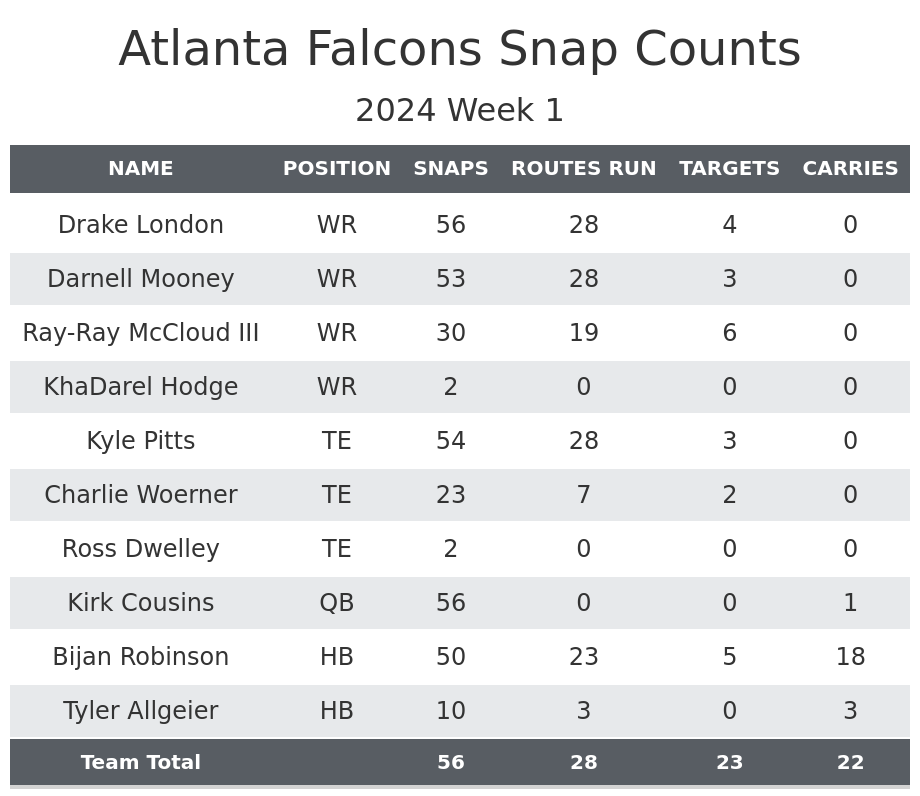
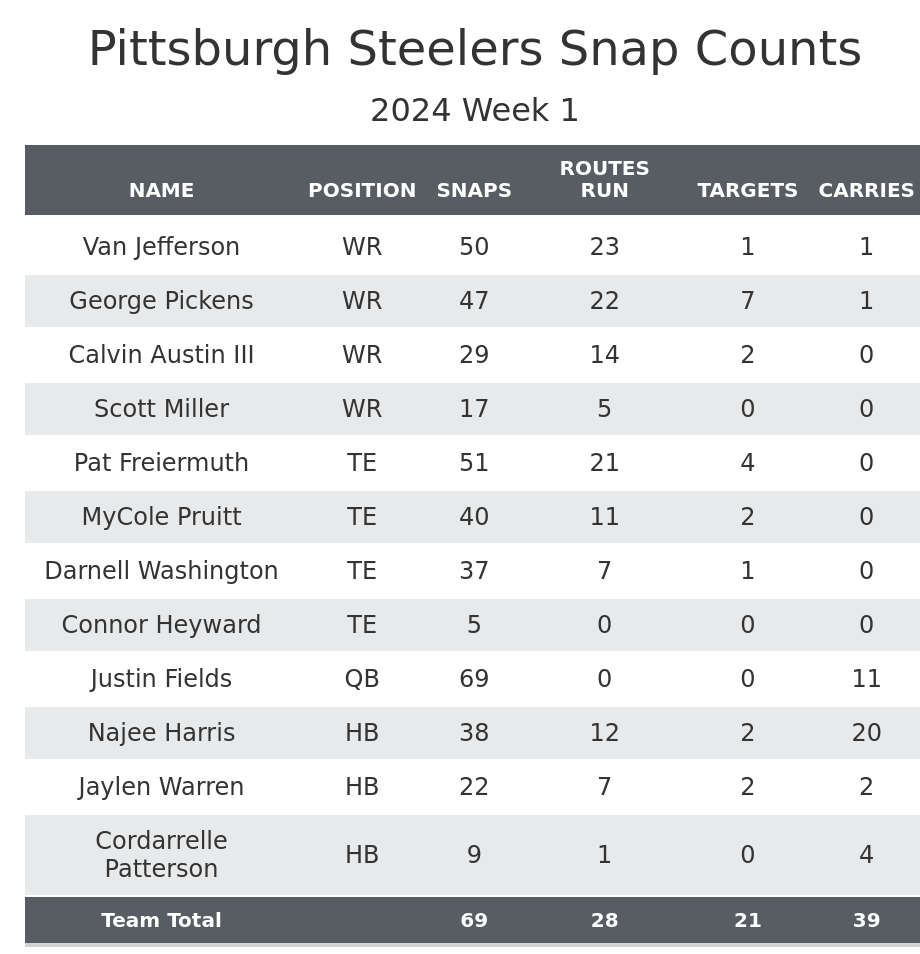
Jaylen Warren in a reduced role: Warren didn’t play as much and didn’t receive the football as much as last season.
Warren ran the ball twice for seven yards and caught both of his targets for 13 yards. Last season, he ran at least three times in every game with an average of nine carries and was targeted at least three times in all but one game.
One small problem was Cordarrelle Patterson, who cut specifically into Warren’s playing time. The other problem is Warren is coming off an injury that kept him out for a lot of training camp. He was limited in practice on Wednesday but was a full participant on Thursday and Friday with no injury status.
He will likely play more snaps and get more touches once he’s closer to 100%, but that might not mean he plays as much as he did last season. On the flip side, this was great for Najee Harris, who ran 20 times, which is a mark he only hit twice last season despite Justin Fields running 14 times.
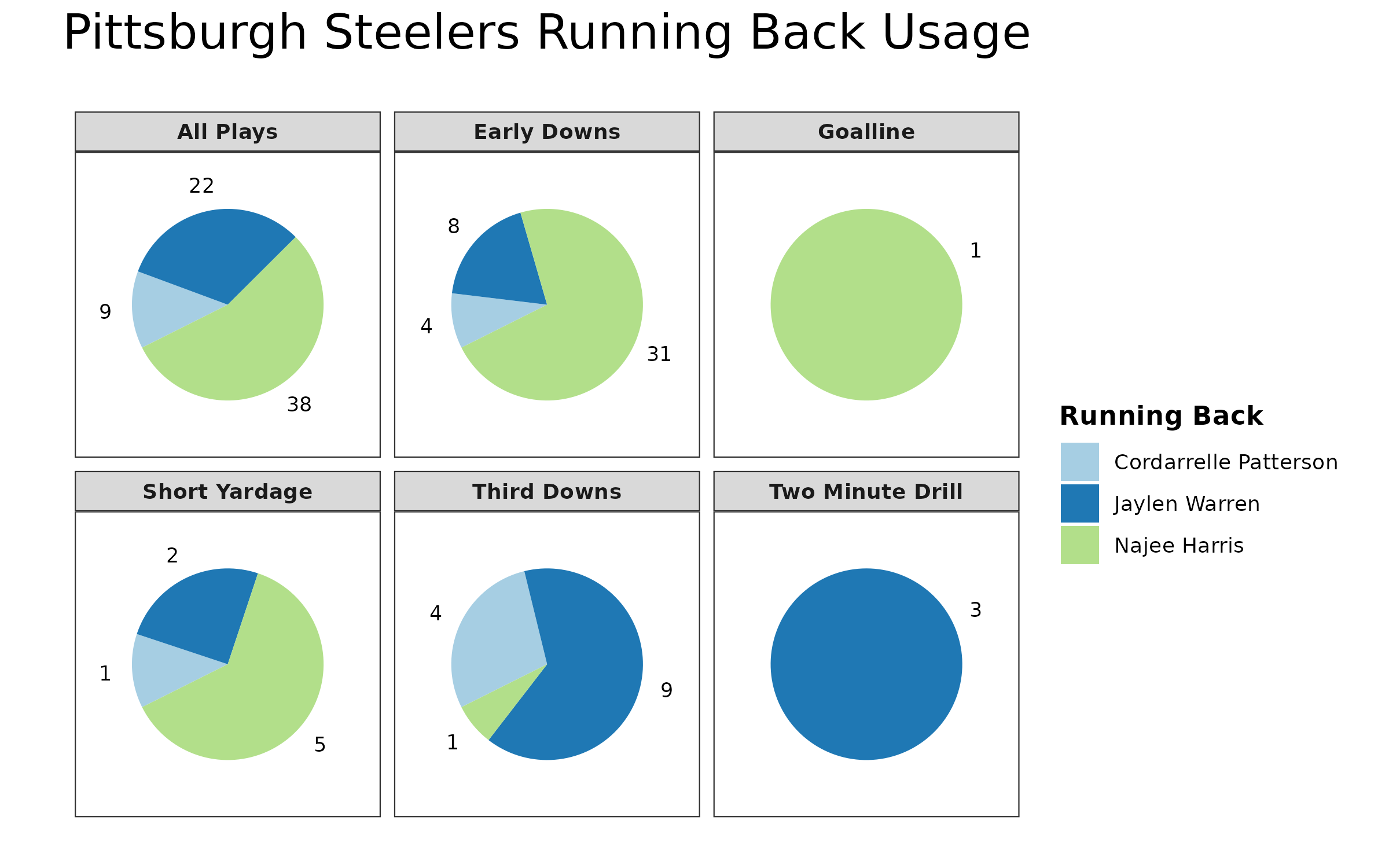
Pat Freiermuth remains in a rotation: The Steelers rotated tight ends somewhat similar to what they did in the preseason, but it wasn’t quite as bad for Freiermuth as it could have been.
The good news for Freiermuth is he was very consistently on the field in 11 personnel, playing 23 of a possible 29 snaps. This meant when the Steelers were passing the ball, he was on the field most of the time. During the preseason, he was rotated out a little more often in 11 personnel.
The problem was 12 personnel, where the primary combination was Darnell Washington and MyCole Pruitt. Freiermuth played six-of-18 snaps in this group. The Steelers also had a ridiculous 20 snaps in 13 personnel, which may or may not have been influenced by Justin Fields starting at quarterback. If they switch to more 12 and fewer 13 personnel groupings in the future, Freiermuth would play fewer snaps. This all added up to Freirmuth running a route on 75% of the Steelers' pass plays, catching all four passes thrown his way for 27 yards.
For now, he can be on rosters as a fantasy backup simply because he’s talented and is right on the borderline of snaps needed to be a fantasy starter. Still, there won’t be many weeks he’s ranked in the top 12 unless the offense starts performing a lot better and he can play more in 12 personnel.
Bijan Robinson dominates snaps and touches: Robinson played a higher percentage of snaps in this game compared to any other game last season.
The Falcons didn’t play their starters or primary backups throughout the preseason, so this game was the first time we saw the starters in Zac Robinson’s offense.
Robinson was one clear winner in the playcaller change, playing 89% of Atlanta's offensive snaps. Last season, his median game was 74%, with a high of 81%. With that playing time, he tied his career high in touches of 23. This was a game where Atlanta only ran 56 offensive plays, so it’s likely once the Falcons are running even more plays, Robinson will set a new career high in offensive touches. This should make anyone who drafted Robinson in the first round happy.
Tyler Allgeier should remain on fantasy rosters because if anything happens to Robinson, then Allgeier will see these touches. He’s one of the best, if not the best, handcuff options in the league.
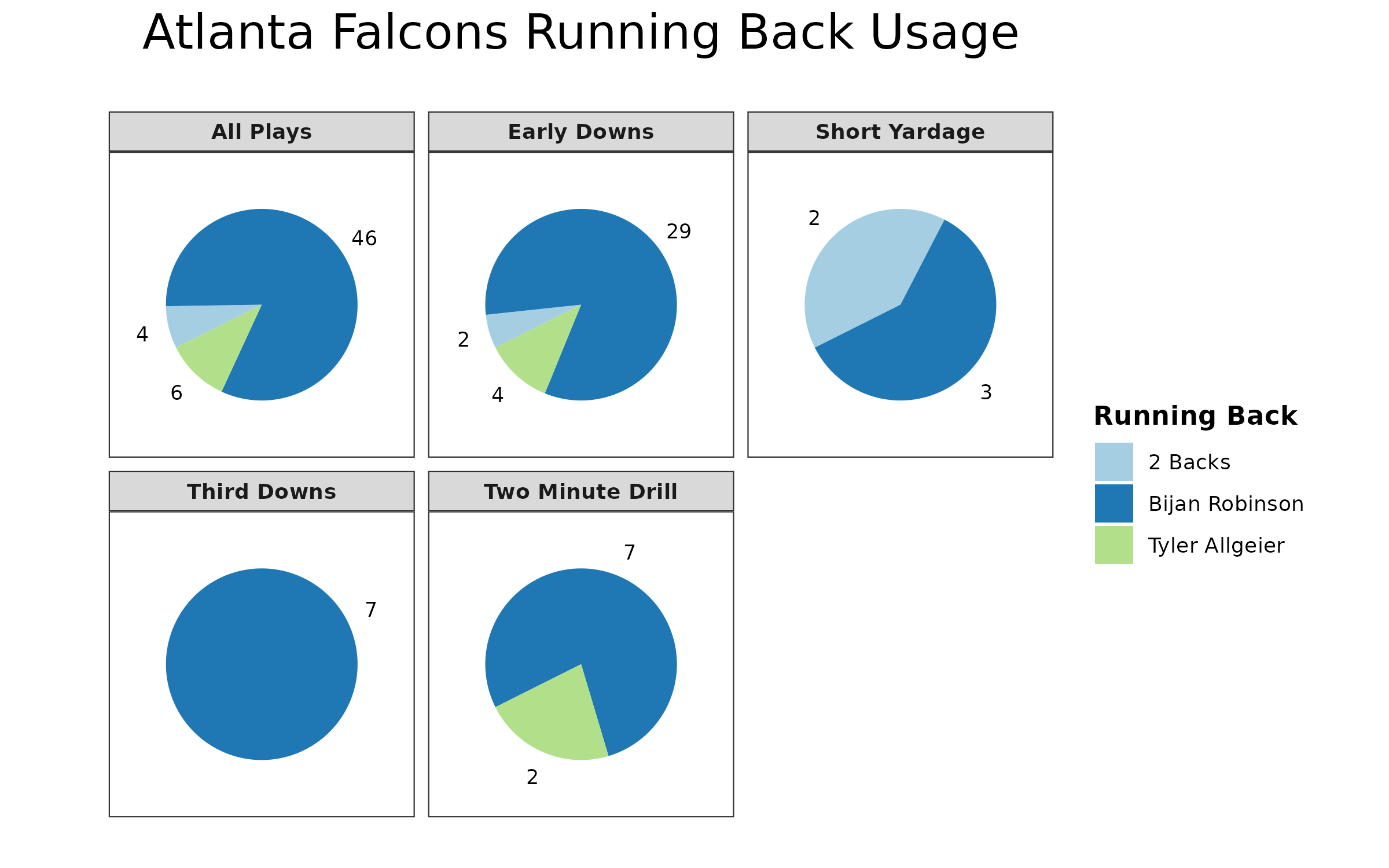
Kyle Pitts also becomes an every-down player: A big problem for Pitt’s fantasy value last season was playing, but that won’t be a problem anymore.
Pitts’ playing time was a major problem last season. He played 66% of Atlanta's offensive snaps or less in 10 of his 17 games and only exceeded 73% of Atlanta's offensive snaps twice. Plenty of those snaps were pass plays, which made it almost impossible for him to be a fantasy starter.
In this game, he played 54 of a possible 56 snaps, making it the first time in his career he played more than 95% of Atlanta's offensive snaps. The only times he left the field was for a snap in 22 personnel and one snap in 12 personnel. Ross Dwelley took his snaps on both plays.
Pitts caught the three passes thrown his way for 26 yards and a touchdown. Ideally, he sees a higher target share going forward, but this was one promising step in the right direction for Pitts’ fantasy value.
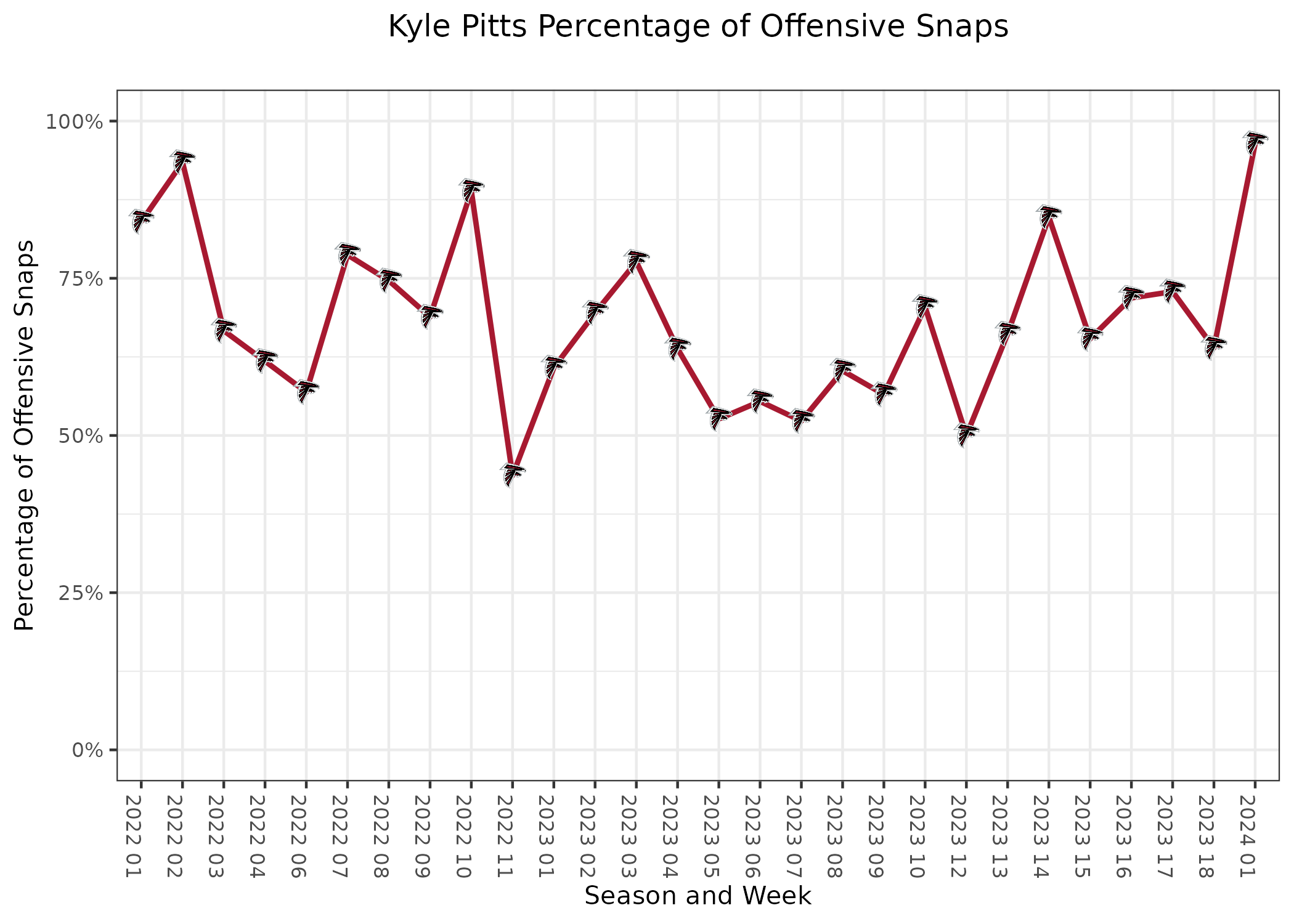
Miscellaneous Notes
- The Steelers' wide receiver rotation went almost completely as expected based on preseason usage. George Pickens and Van Jefferson were the main receivers and Calvin Austin III joined in three-receiver sets. Scott Miller played several snaps as the only wide receiver in 13 personnel. These will typically be run plays, so it’s not overly concerning that Pickens isn’t playing in these sets.
- Rookie wide receiver Roman Wilson was ruled out on Friday due to an ankle injury. He also missed the entire preseason and will likely be eased in once he is ready to play.
- The Falcons used a heavy rotation of wide receivers last season, but this year it’s straightforward. Drake London and Darnell Mooney are playing every down while Ray-Ray McCloud III joined for three-receiver sets. All three played between 17-18 snaps from the slot in this game. Robinson came from the Los Angeles Rams, and the Rams also had a heavy slot rotation of wide receivers last season.
- Falcons rookie running back Jase McClellan was a healthy inactive. Avery Williams served as the third running back.
Arizona Cardinals @ Buffalo Bills
- James Conner: 16 carries, 50 yards, 1 touchdown, 3 receptions, 33 receiving yards
- James Cook: 19 carries, 71 yards, 3 receptions, 32 receiving yards
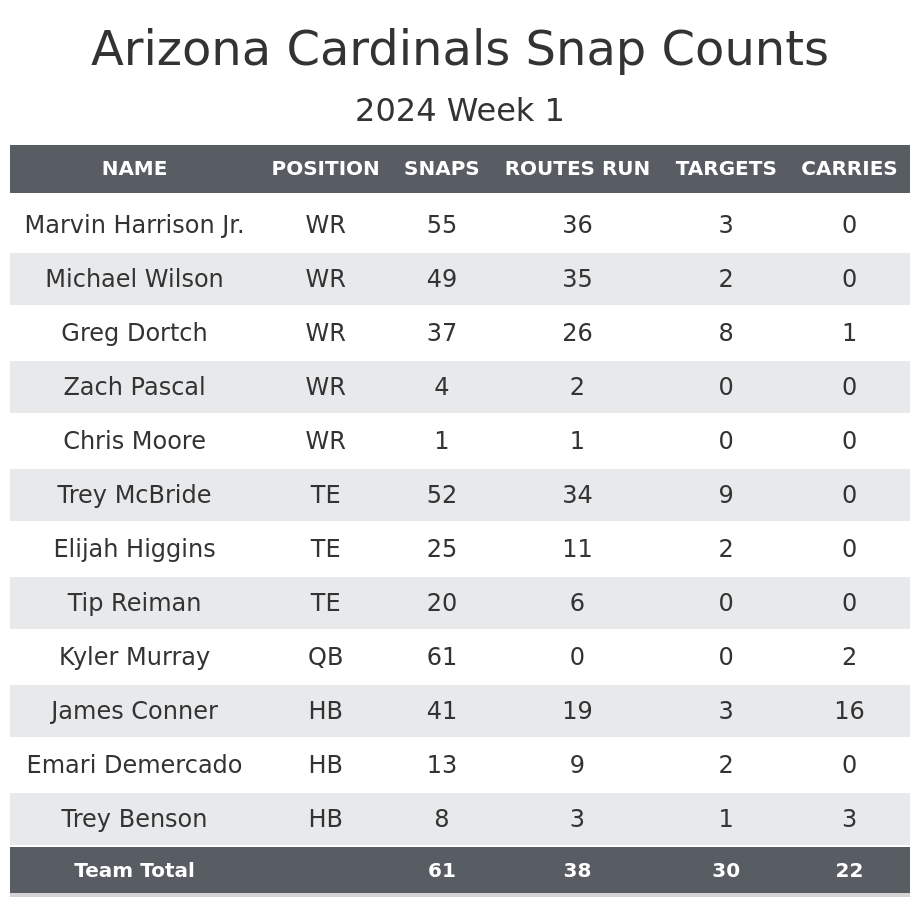
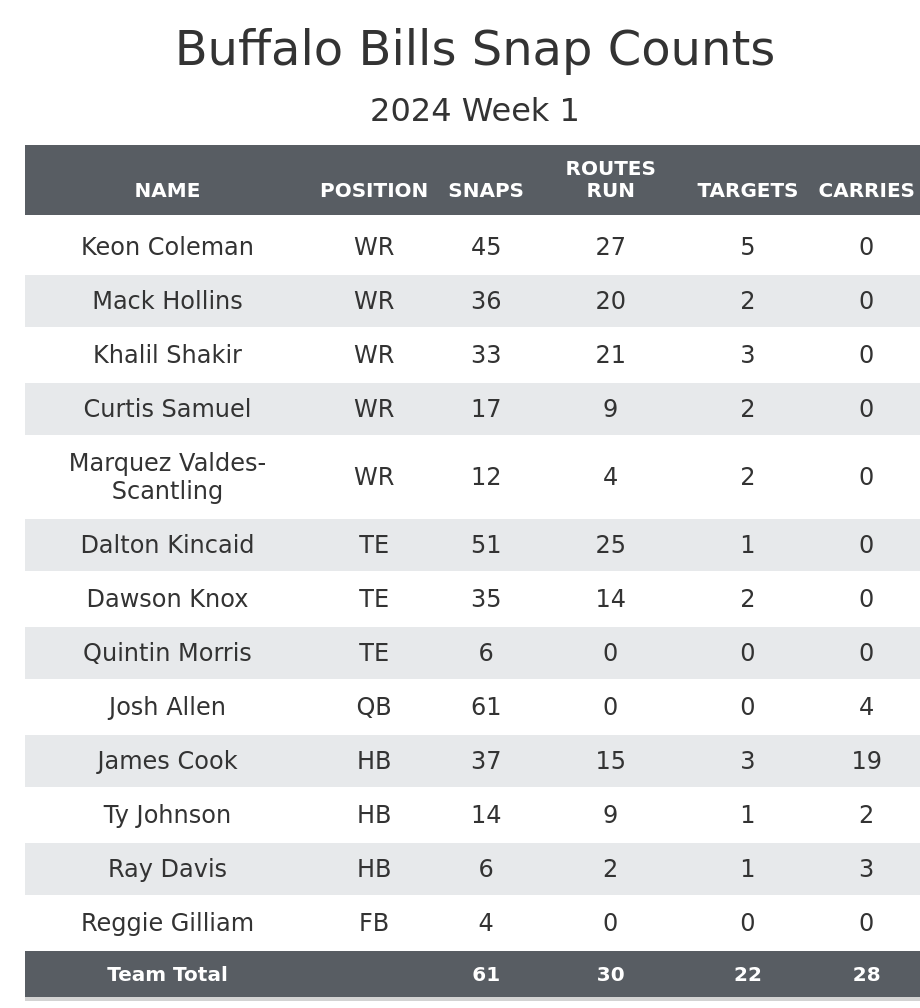
Marvin Harrison Jr.’s quiet debut: Harrison only caught one pass for four yards, but it wasn’t for a lack of playing time.
Harrison only left the field for six plays — four of which were run plays. The only time Harrison was off the field was for some of the three tight-end sets.
He was the clear X receiver for the game. The Cardinals had a very straightforward plan at wide receiver, with Harrison, Michael Wilson and Greg Dortch all playing at least 32 of the 33 snaps out of 11 personnel. Harrison played all 16 snaps in 12 personnel while Wilson played 13 of those 16.
Harrison should remain in fantasy starting lineups going forward despite this slow start. While Dortch led the team in receptions and receiving yards, it’s hard for someone to be a consistent fantasy starter while only playing in three-receiver sets. Still, in deeper leagues where some slot-only receivers are on fantasy rosters, he should also be on a fantasy roster.
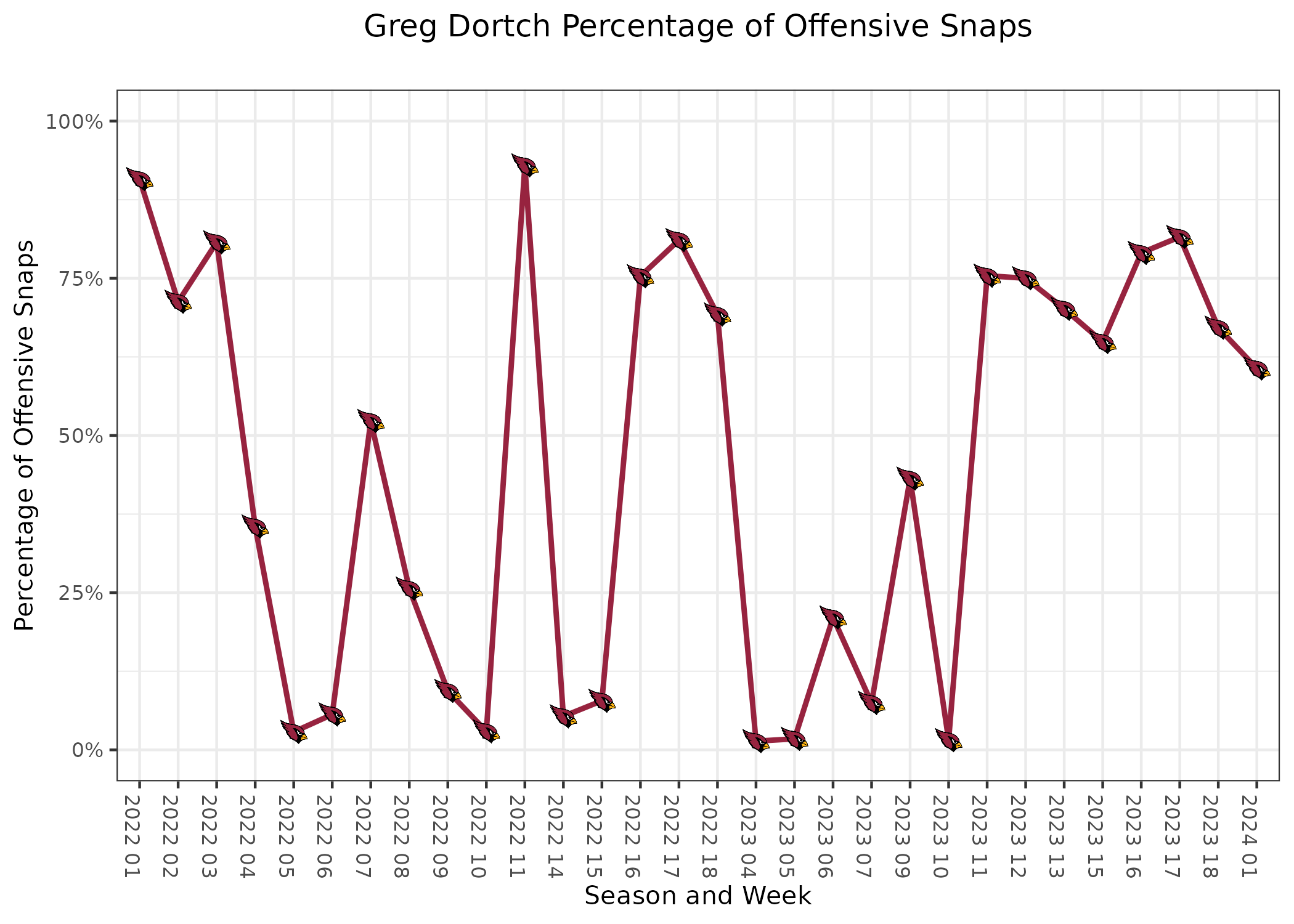
Curtis Samuel is the current odd man out of the wide receiver rotation: Samuel only ran nine pass routes for the Bills.
The Bills used a heavy rotation of wide receivers throughout the game, with no one playing over 75% of Buffalo's offensive snaps, but in 11 personnel, it was primarily Keon Coleman, Mack Hollins and Khalil Shakir on the field. In 12 personnel, it was primarily Coleman and Hollins.
In general, Samuel was only a backup to Shakir while Marquez Valdes-Scantling was generally a backup to Hollins and Coleman, but there were plenty of plays where those general rules weren’t followed. Samuel has been dealing with an injury, so it’s possible he can earn more playing time as the year progresses. If that happens, it would likely come at Shakir's expense.
Right now, it appears Coleman would be the most trustworthy wide receiver in the offense after leading the unit in snaps, routes, targets, receptions and receiving yards. Still, it’s also possible a different wide receiver takes the lead each week.
Dalton Kincaid’s snaps expand but targets don’t: Kincaid plays a career high in snaps with Dawson Knox also playing.
Kincaid played 83.6% of Buffalo's offensive snaps, which is a mark he’s only hit twice before in Weeks 8 and 9 last season when Knox was out due to injury.
The Bills were rotating their tight ends a little bit more early in the game, which included some pass plays out of 11 personnel where Knox was on the field and Kincaid wasn’t, but in the second half, Kincaid played 36 of a possible 39 snaps. The only problem is Kincaid was only targeted twice, catching one pass for 11 yards.
Luckily his playing time doesn’t seem to be a concern, but it’s possible the Bills' commitment to the run game could be concerning.
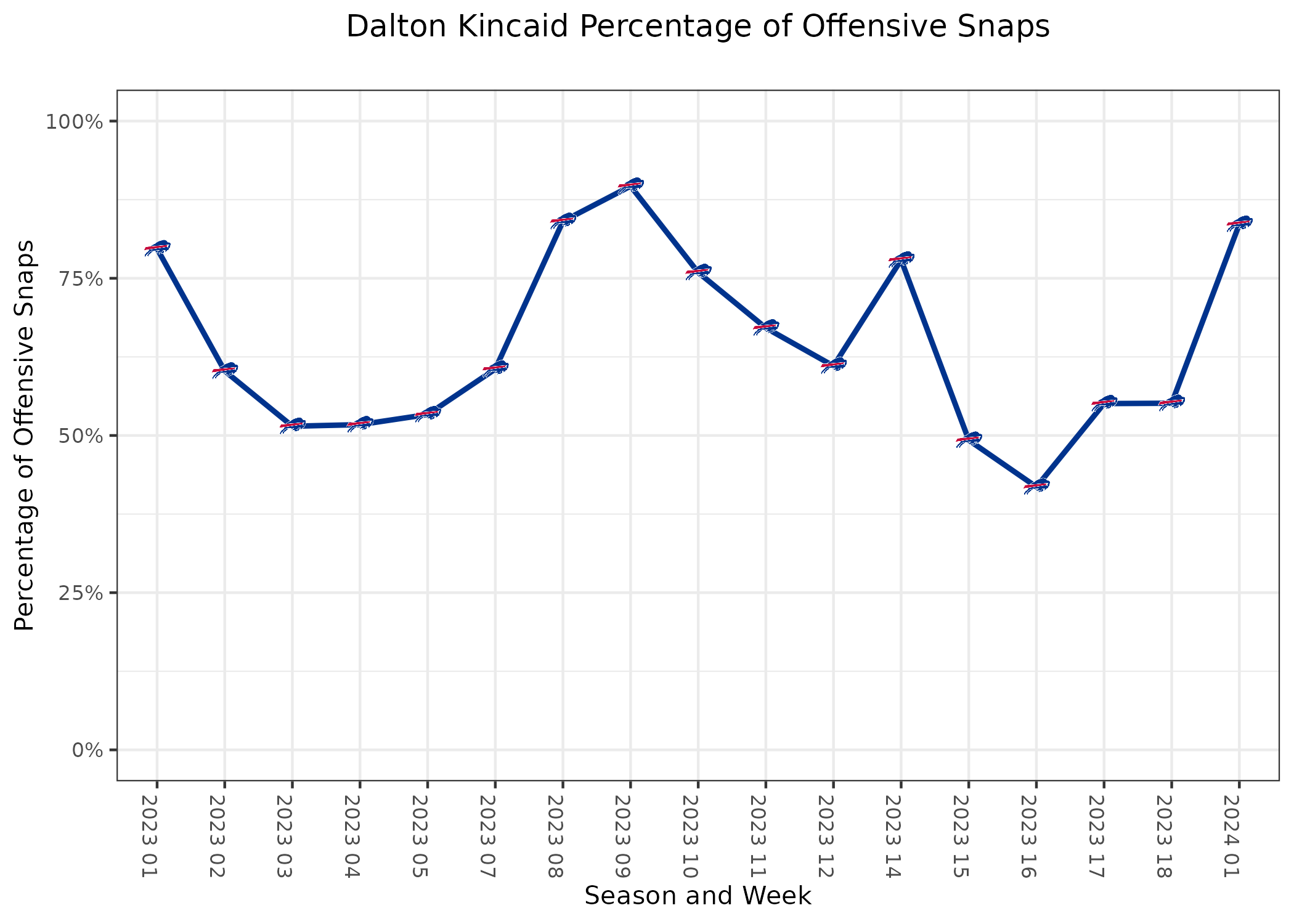
Miscellaneous Notes
- The Bills running back rotation was very similar to late last season with James Cook as the general early-down back while Ty Johnson was the third-down back. The roles are a little less black and white than most teams. Ray Davis was primarily given opportunities early in the third quarter and doesn’t seem to be a major part of the offense yet.
- The Cardinals' running back rotation was also very similar to last season. James Conner was the early-down back who also took the two-minute drill, while Emari Demercado was the primary third-down back. Trey Benson played most of the snaps on the third drive of the game, and that was Benson’s only offensive playing time.
- Cardinals rookie wide receiver Xavier Weaver was ruled out on Friday due to an oblique injury after not practicing all week.
Tennessee Titans @ Chicago Bears
- Tony Pollard: 16 carries, 82 yards, 1 touchdown, 3 receptions, 12 receiving yards
- D.J. Moore: 5 receptions, 35 yards, 1 carry, 14 rushing yards
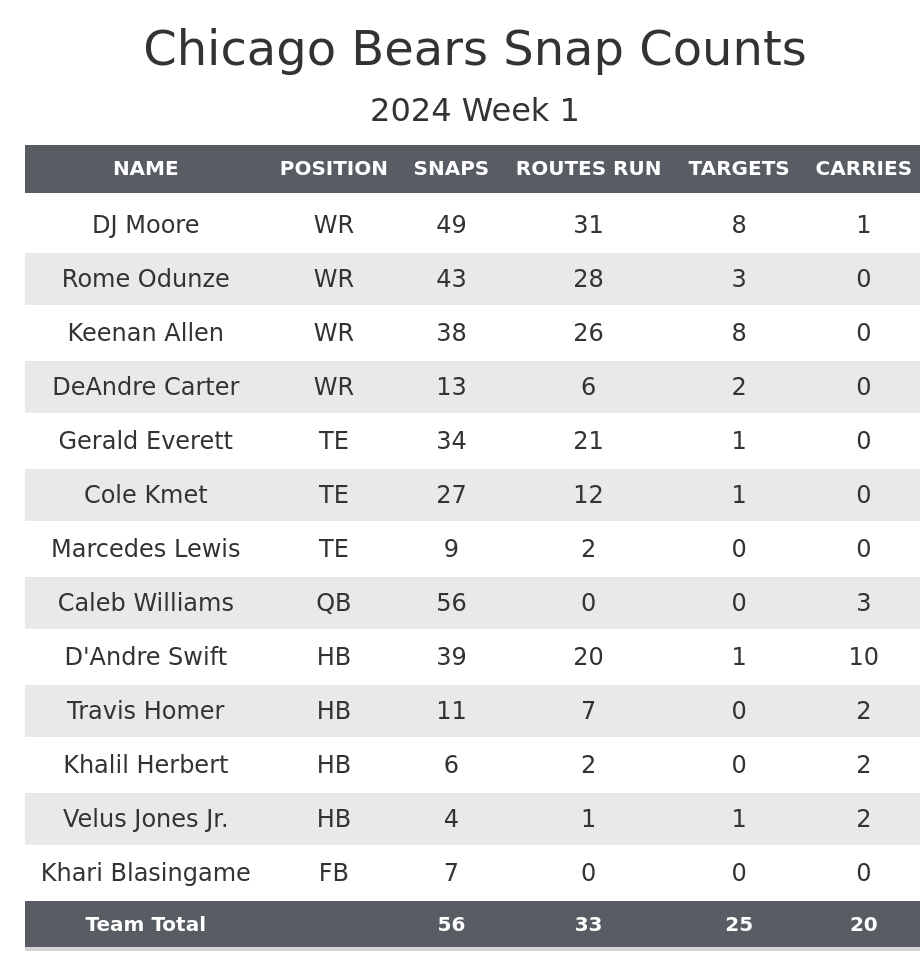
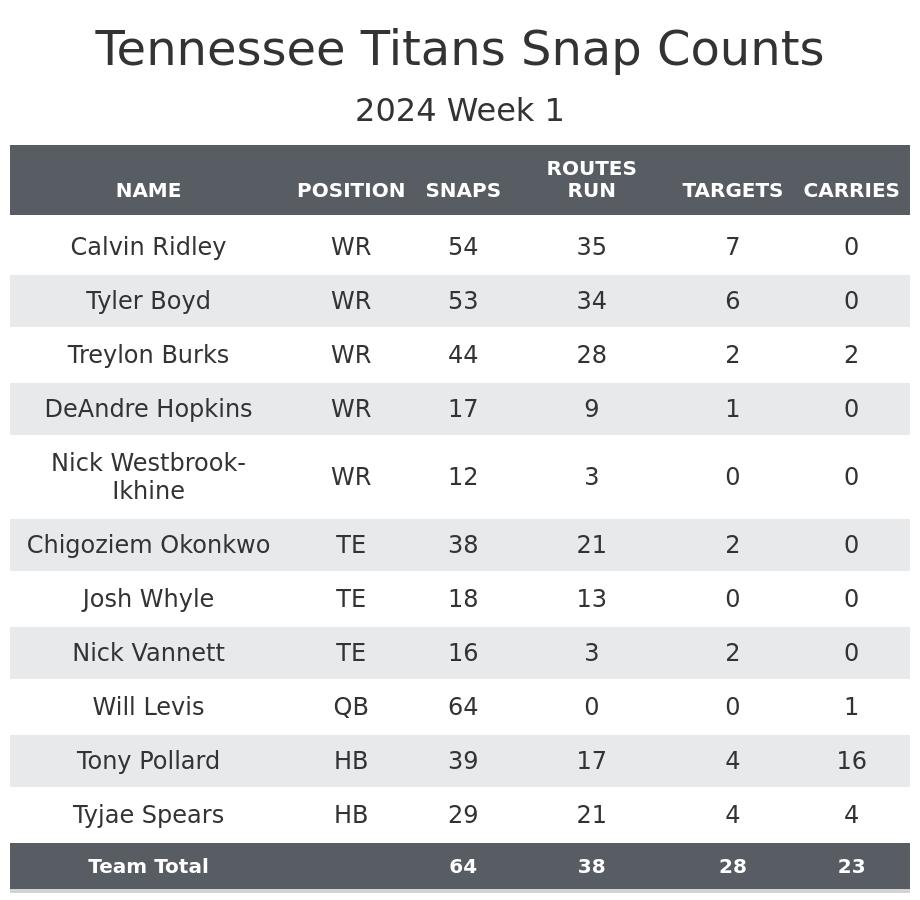
Titans follow a predictable backfield: Tony Pollard was the primary early-down back while Spears was the primary passing down back.
Spears' role is very similar to last season, while Pollard is taking Derrick Henry’s role. This is fewer pass plays than Pollard is used to, but these Titans are more focused on running the ball than Pollard’s Cowboys were last season.
Pollard can safely be put in fantasy starting lineups for any game where the Titans should keep the game script close. In games where the Titans are expected to lose significantly, then we should expect to see more Spears than Pollard. Spears can remain on fantasy rosters, but he should probably be kept out of starting lineups until he earns more playing time, or we see a game where he’s used significantly in a losing effort.
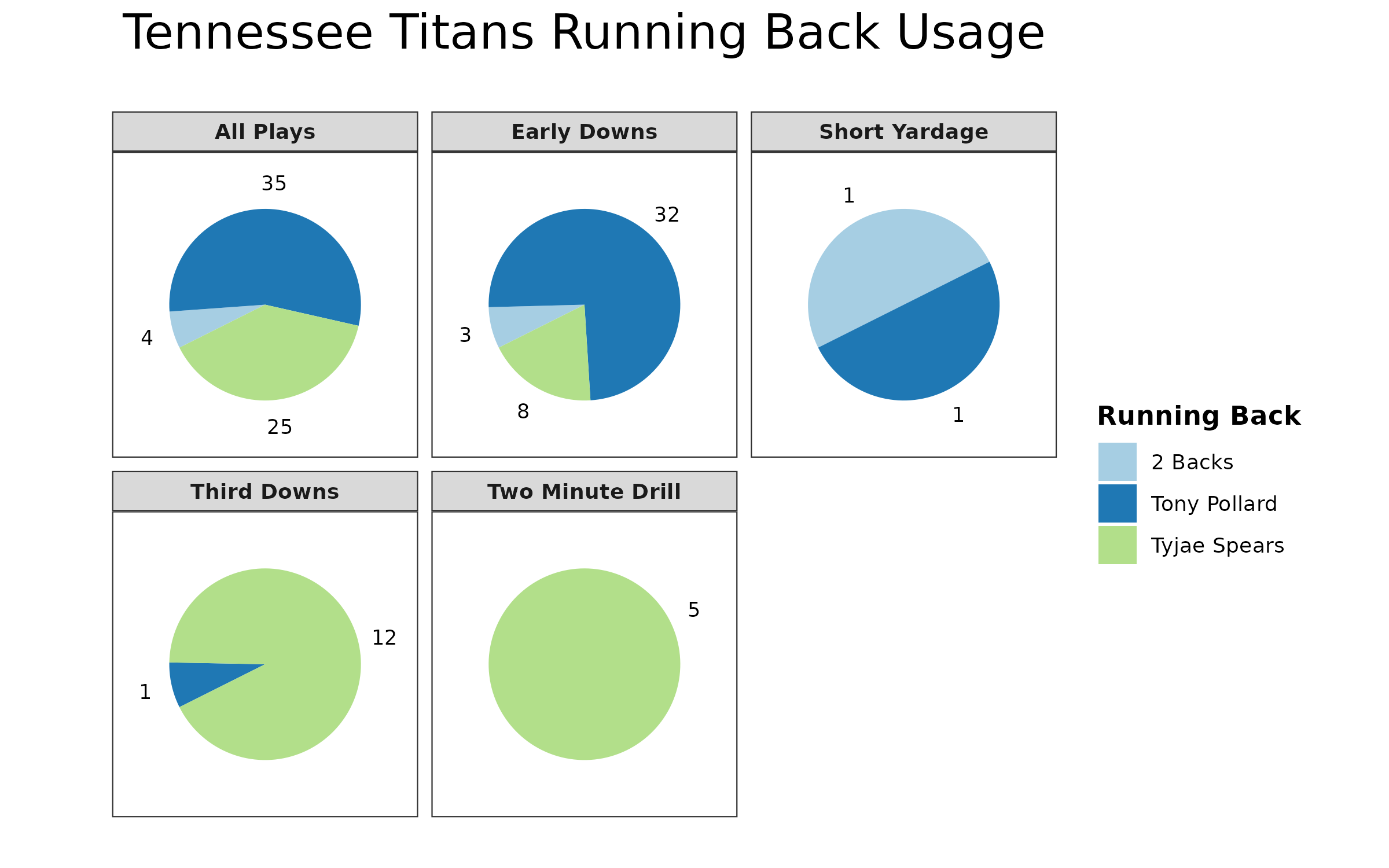
DeAndre Hopkins plays on a very limited basis: Hopkins was limited in practice all week due to a knee injury.
Hopkins missed the preseason with Treylon Burks taking his place in the starting lineup. Hopkins notably wasn’t playing with the first team during warmups either, which was a clear indication Hopkins would be pretty limited. Hopkins was consistently on the field in 12 personnel, playing in six of a possible seven snaps, but he only played 11-of-53 snaps from 11 personnel. This was the opposite role Hopkins had last season whenever he was limited.
Unless Hopkins is a full participant in practice all week, he probably shouldn’t be in fantasy starting lineups for Week 2.
Rome Odunze splits time with Keenan Allen: The two saw equal playing time in two-receiver sets.
In 12 personnel, Odunze played five snaps to Allen's four, while in 21 personnel, Allen played three while Odunze played two. Odunze also played some snaps in one-receiver sets, allowing him to gain a lead over Allen in terms of playing time.
This didn’t necessarily lead to fantasy production this week. Both Allen and Moore received more targets while Odunze only caught one of his four targets for 11 yards. The Bears passing game will need to be a lot better than it was in this game, but if that happens, then Odunze could be a fantasy starter given his role.
Cole Kmet remains the second option in the receiving game: Kmet only ran 12 routes in this game.
Throughout the preseason, it was clear that Gerald Everett would be the Bears' primary receiving tight end, and that remained true in this game. Kmet played in 12 of the 36 snaps out of 11 personnel while Everett took the other 24.
If anything, this game was worse than the preseason for Kmet because in 21 personnel, Everett played three-of-five snaps, where this was a personnel grouping that was primarily for Kmet in the preseason. The only piece of good news is Marcedes Lewis, who sat out the preseason, only played nine snaps. Some of those snaps were in Gerald Everett‘s place in 12 personnel, and some were with Kmet in 22 personnel. Kmet should be dropped from all fantasy leagues.
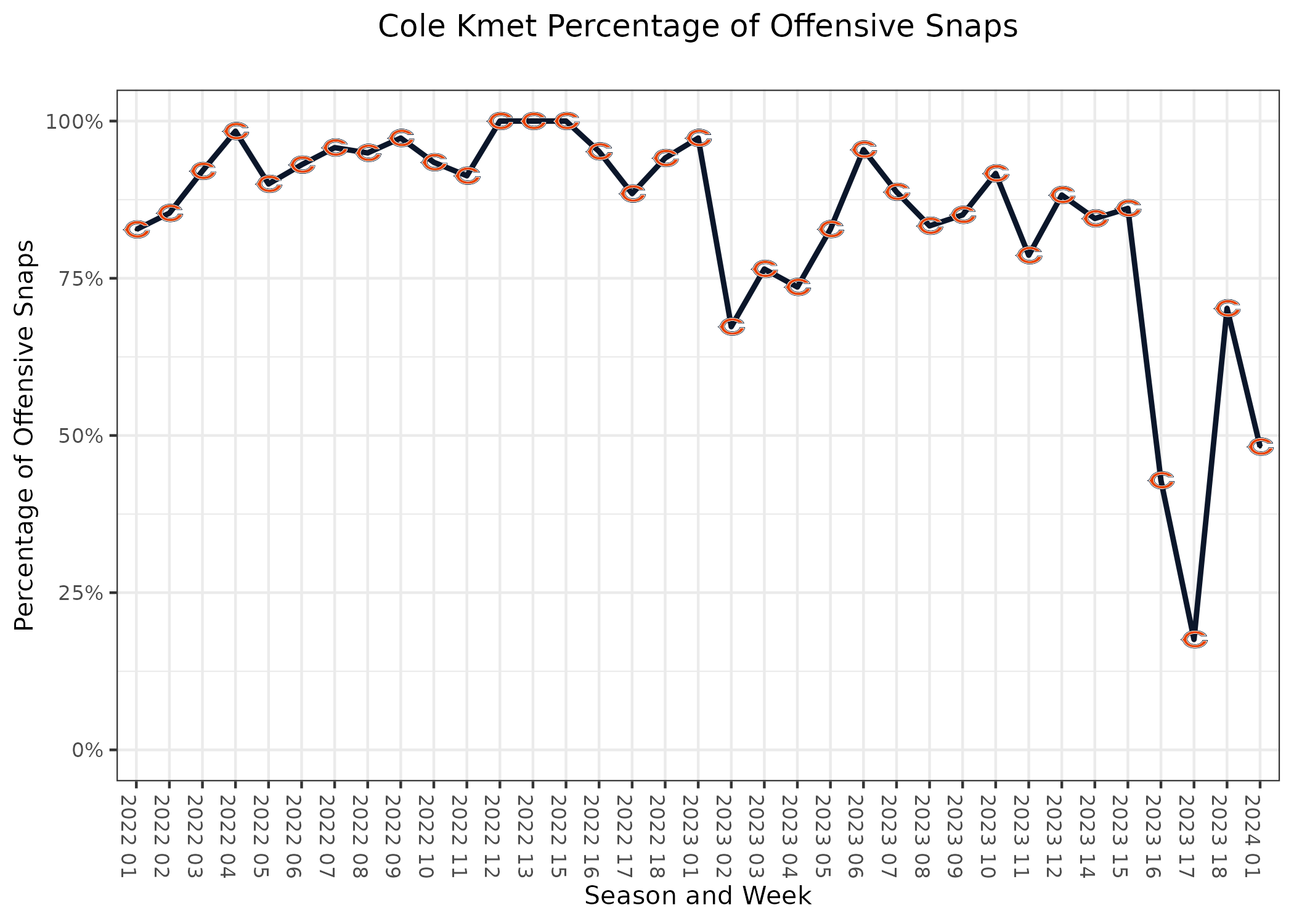
Miscellaneous Notes
- Roschon Johnson was inactive for Chicago. He missed most of the preseason and was limited in practice to start the week. He was a full participant on Friday and didn’t have an injury designation, so he was technically a healthy inactive. It’s possible Johnson just needs more practice time in the new offense before being active on gameday, but it’s also possible he remains the odd man out for a team that kept five halfbacks.
- The Titans listed both Chig Okonkwo and Josh Whyle as starters, so it’s not surprising Okonkwo only played 59% of Tennessee's offensive snaps, which was lower than most of his games last season. While he scored a touchdown, he probably won’t play enough to be a fantasy starter this season.
New England Patriots @ Cincinnati Bengals
- Rhamondre Stevenson: 25 carries, 120 yards, 1 touchdown, 3 receptions, 6 receiving yards
- Zack Moss: 9 carries, 44 yards, 1 touchdown, 2 receptions, 17 receiving yards
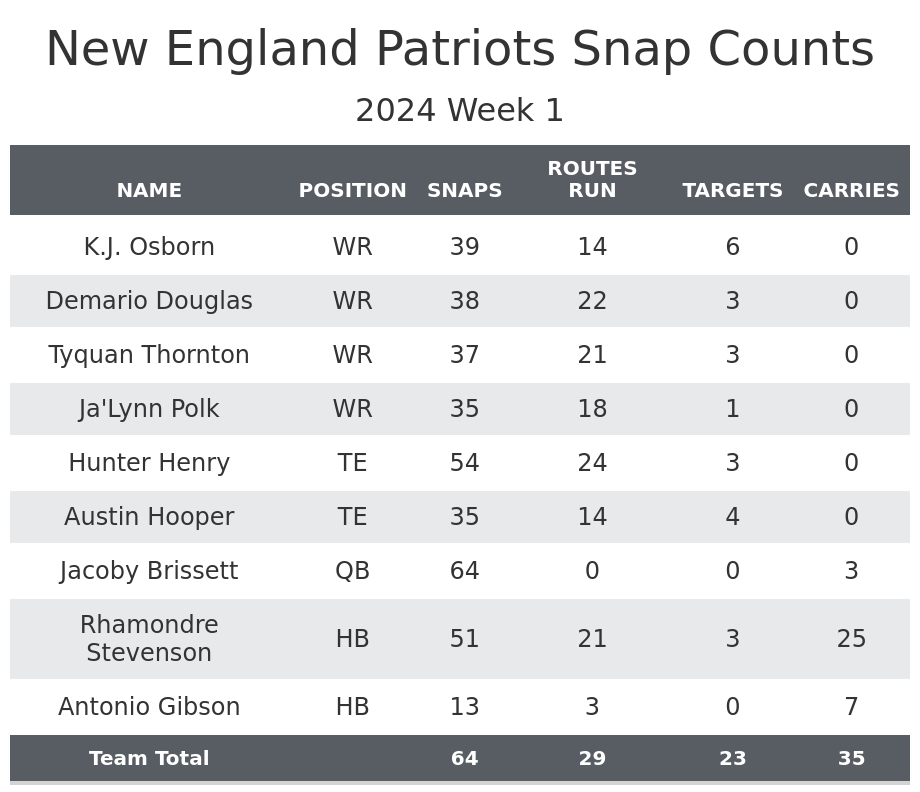
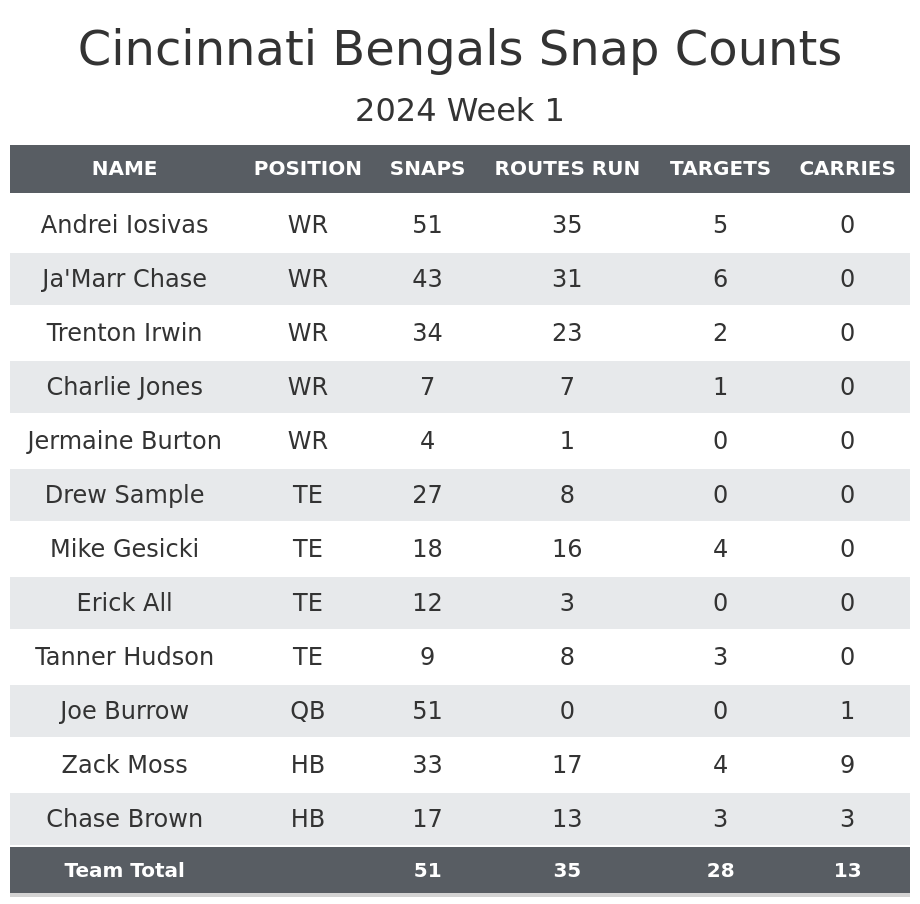
Rhamondre Stevenson finally sees the feature role again: Stevenson’s playing time was about what everyone expected from him last season.
Stevenson played nearly 80% of New England's offensive snaps, which is more than he played in any single game last season and a mark he only hit five times in 2022. He was the primary running back in every situation. The only situation he was in danger of fully losing was third downs, as that was Antonio Gibson’s role all of last season. Throughout the preseason, it was clear that Stevenson was ahead, but we couldn’t know how far ahead until this game.
Stevenson was already at a point where he was a fantasy starter just based on how many backfields were viewed as committees, but now people can more comfortably put Stevenson in starting lineups going forward. Gibson can remain on benches in leagues where most backup running backs are rostered, but it would take an injury to Stevenson for Gibson to have any fantasy value.
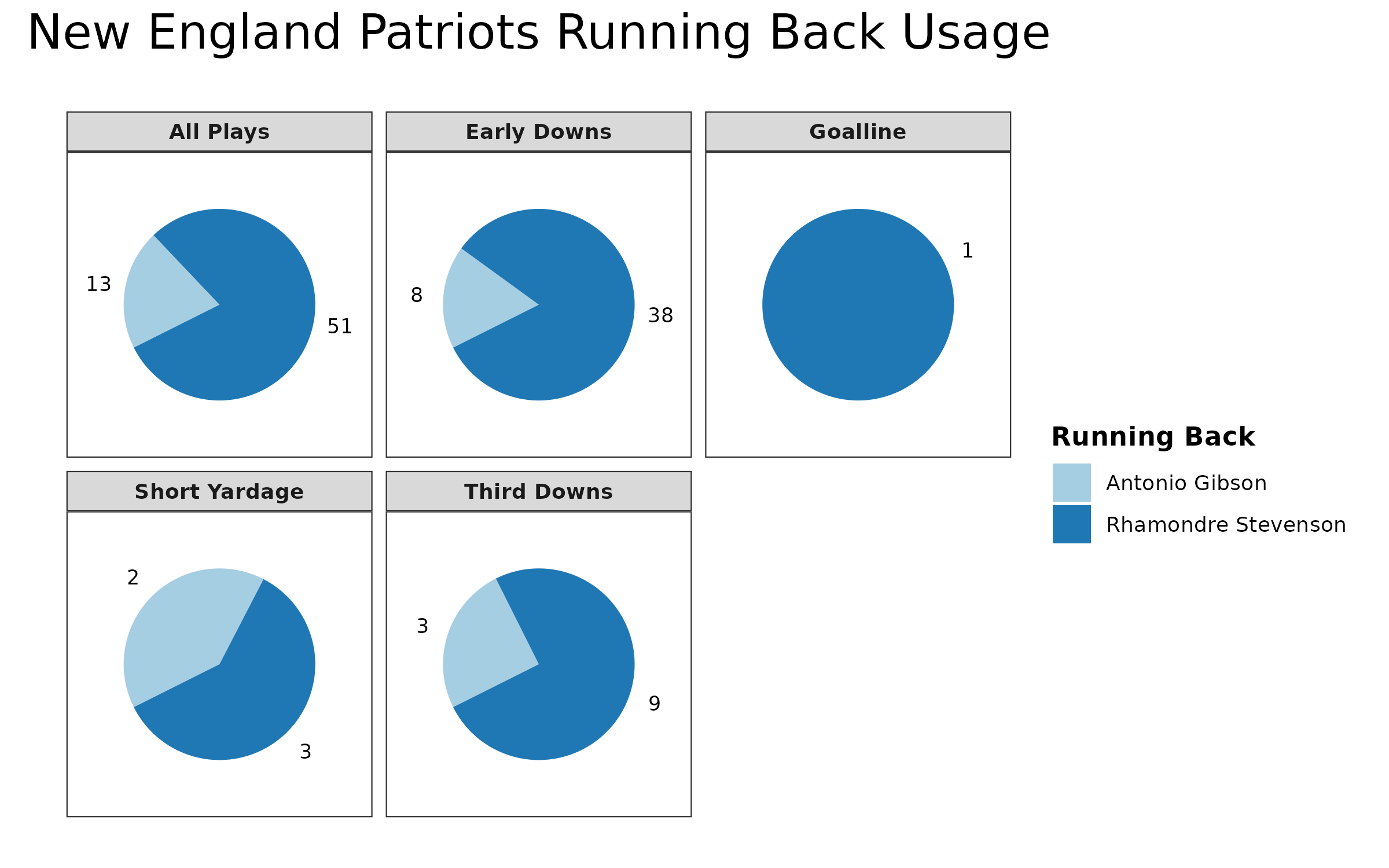
Patriots wide receiver rotation continues to evolve: The Patriots used a four-man rotation where no one was a clear lead wide receiver.
New England tried out several wide receivers throughout the preseason but simplified things with a four-man rotation in this game. In 11 personnel, the primary wide receiver group was Tyquan Thornton, Ja’Lynn Polk and Demario Douglas. Outside of 11 personnel, the Patriots ran some 12 personnel and some 13 with a sixth offensive linemen instead of a third tight end. K.J. Osborn was the primary wide receiver in this group.
One main difference from the preseason is Osborn and Polk were together on the field more frequently. Typically, only Tyquan Thornton or someone like Jalen Reagor or Javon Baker would be the X receiver, but they were more OK with other wide receivers taking the X role. Douglas also never played outside of 11 personnel in the preseason, and he played four-of-25 snaps outside of 11 in this game.
Ideally, Polk can take a higher percentage of snaps over time, potentially leading this group in offensive snaps as early as next week.
Zack Moss is the clear leader in the Bengals backfield: Moss was the Bengals' primary running back in every situation.
Cincinnati’s backfield was a bit of an unknown after Moss missed all of training camp and was expected to be the starter, but all of the training camp hype was around Brown. The two had been early-down backs during their career, so anything was possible for this game.
On early downs, it was close to a 50/50 split, but Moss played in clear passing situations as well as short-yardage situations. The Bengals offense didn’t play very well in this game, leading to an OK game from Moss. Assuming Cincinnati can turn this around, Moss could become a consistent fantasy starter. In shallow leagues, it would be OK to drop Brown. Considering the 50/50 split on early downs, there is still a chance Brown can earn more playing time as the season progresses.
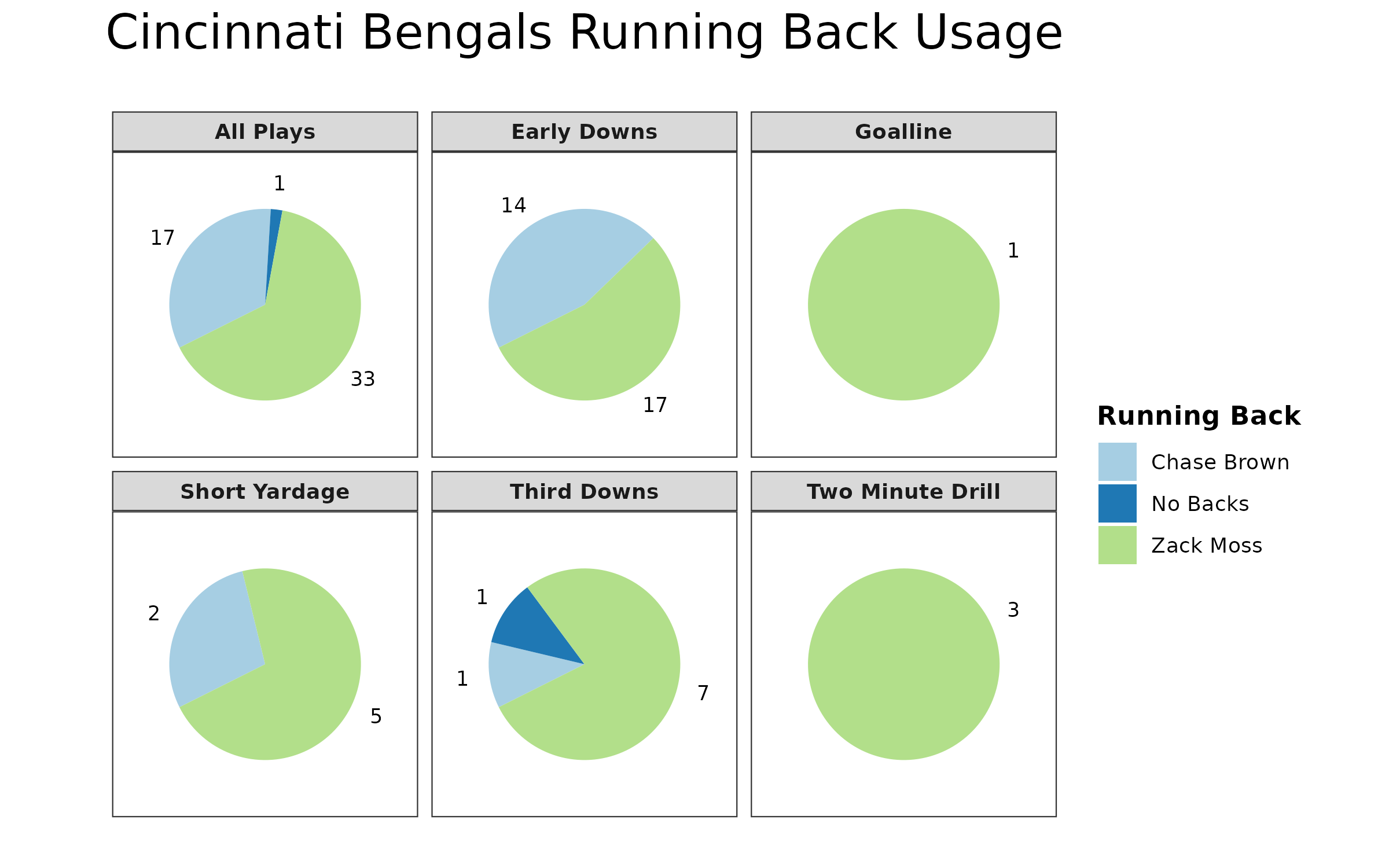
Bengals adjust without Tee Higgins: Higgins missed this game due to a hamstring injury while Ja’Marr Chase was reportedly on a snap count.
While Chase didn’t play as much as usual, it was only by a couple of snaps. He was still the clear leader among the Bengals receivers, doubling everyone else in terms of both receptions and receiving yards.
Andrei Iosivas replaced Higgins as the Bengals' other ever-down wide receiver, while Trenton Irwin took over the slot role. While Jermaine Burton made several big plays throughout the preseason, he only played four offensive snaps and ran one route in this game. It’s possible he could be a gameday inactive once Higgins is back and healthy.
In general, the wide receivers outside of Chase and Higgins should be avoided. If the backups couldn’t take advantage of this matchup, then they can’t be trusted in future games.
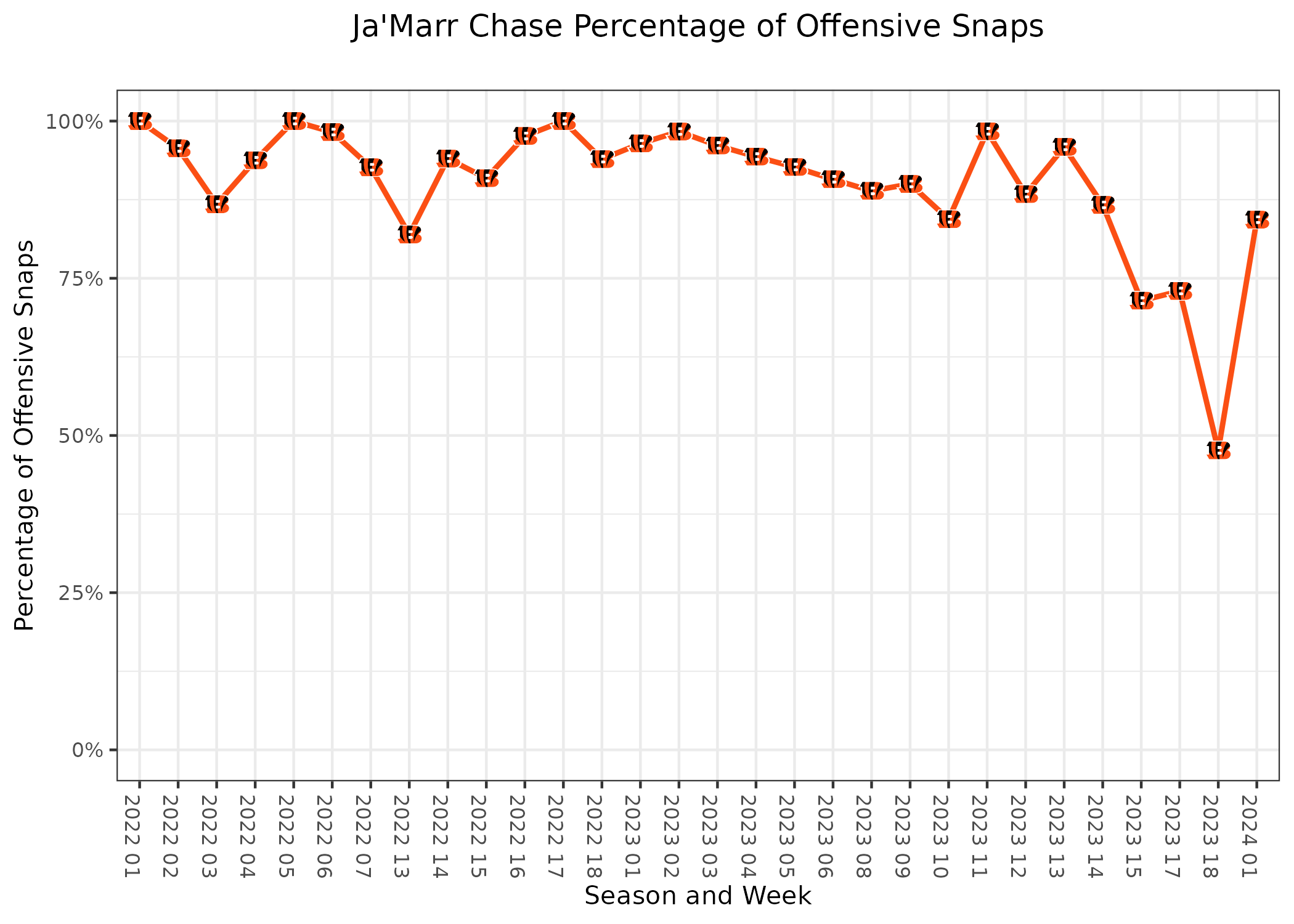
Mike Gesicki only plays a fraction of routes: Gesicki caught three passes but is unlikely to be a viable fantasy option this season.
Gesicki only played on 14-of-36 snaps in 11 personnel, and all 14 of his plays were passing plays. Drew Sample played most of the 11 personnel snaps in run situations, but that also led to Sample taking some pass routes. Tanner Hudson also played six snaps out of 11 personnel — all were pass plays.
Gesicki also only played in three-of-14 snaps in 12 personnel. Erick All joined Sample on most plays out of that personnel grouping. This led Gesicki to only play 35% of Cincinnati's offensive snaps, which isn’t nearly enough to be a fantasy starter. This was supposed to be a game where Gesicki could shine in terms of playing time without Higgins. While he almost caught an amazing touchdown, he simply won’t get enough opportunities to score fantasy points to be worth having him on your fantasy roster.
Miscellaneous Notes
- Hunter Henry missed all of the preseason but was back to being a clear starter for the Patriots. He played 84% of New England's offensive snaps, which is a mark he only hit four times last season. He can be a fantasy backup with this playing time and a borderline starter if the offense improves.
- Rookie Patriots wide receiver Javon Baker was a healthy inactive for this game.
Houston Texans @ Indianapolis Colts
- Joe Mixon: 30 carries, 159 yards, 1 touchdown, 3 receptions, 19 receiving yards
- Alec Pierce: 3 receptions, 125 yards, 1 touchdown
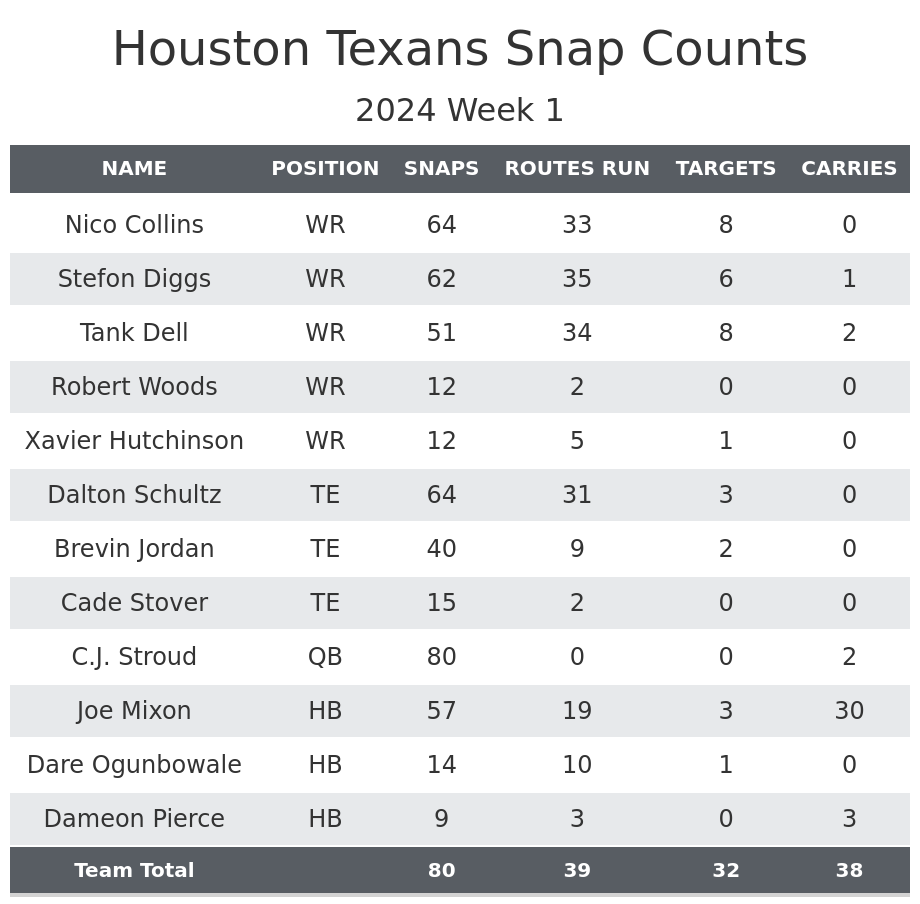
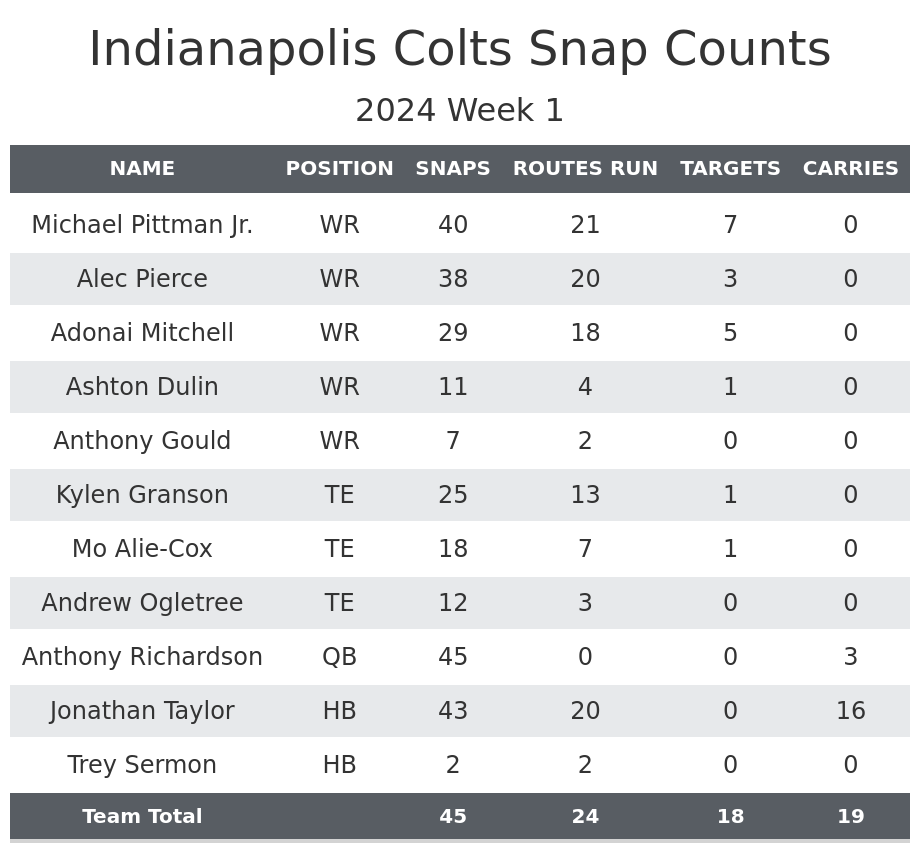
Joe Mixon makes his Texans’ debut: Mixon played the expected role as the Texans' early down back.
Mixon played a very high percentage of early-down snaps throughout his time with the Cincinnati Bengals while not playing on third downs, and the Texans used that same kind of rotation with their running backs last year with Devin Singletary primarily on early downs and Dare Ogunbowale on third downs.
Therefore, it was no surprise that Mixon just took Singletary’s role while Ogunbowale remained the third down back. The only concerning part was that Ogunbowale played the two-minute drill snaps. Generally, Mixon played during two-minute drills with the Bengals.
That might not matter if the Texans remain more run-heavy than the Bengals. Mixon ran 30 times in a one-score game, which ties his career high. As long as Mixon stays healthy and the Texans aren’t blown out of games, Mixon should continue receiving 20-plus carries each week.
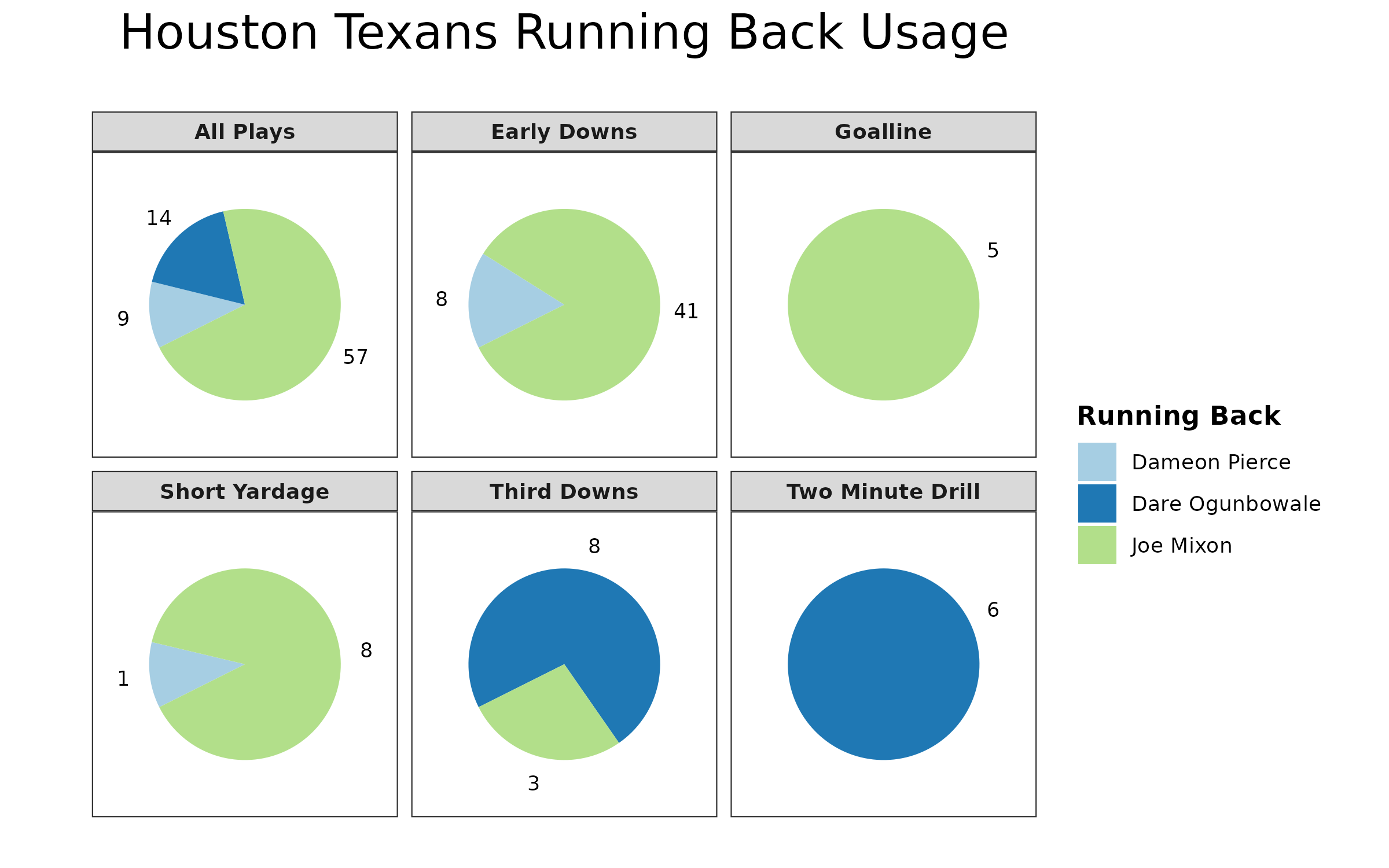
Tank Dell runs a high percentage of routes: Dell ran 34 routes out of a possible 39 which was great for his fantasy value.
The first bit of good news for the Texans wide receivers is players fourth or lower on the depth chart weren’t rotated in very much compared to last season. When they were on the field, it was often a running situation. The Texans ran 45 plays out of 11 personnel and Dell played all 45, while Nico Collins and Stefon Diggs each played at least 41.
Dell wasn’t on the field much in 12 personnel, playing six fewer snaps than Robert Woods and Xavier Hutchinson. This still means if the Texans are in a blowout victory, Dell probably won’t play a lot, but in a competitive game like this, Dell’s fantasy value will be just fine. He caught three passes for 40 yards but was targeted more, so he should have better weeks than this.
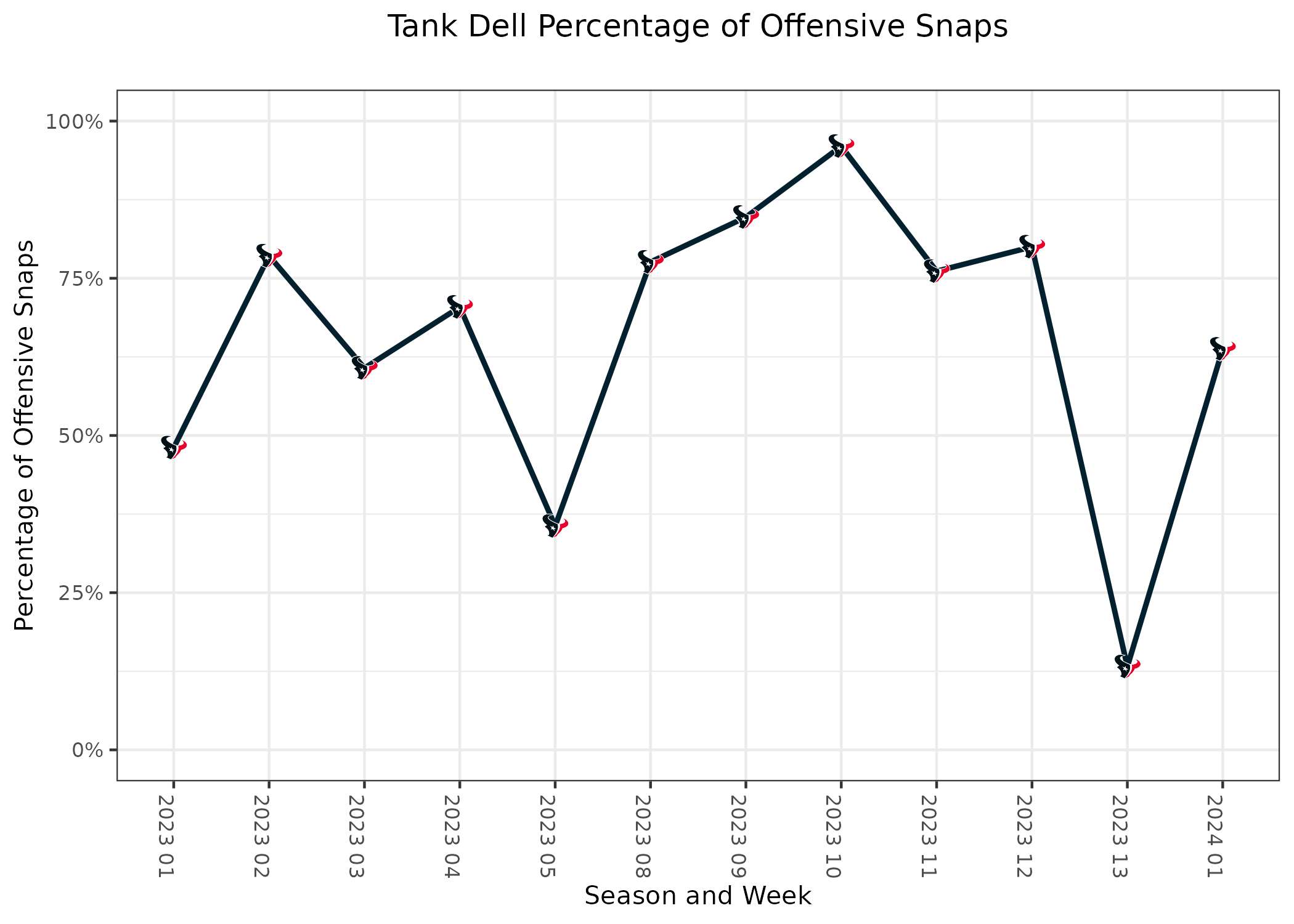
Adonai Mitchell’s limited role: Mitchell played in 29 of a possible 45 offensive snaps.
Mitchell started the offseason in competition with Alec Pierce for the outside wide receiver spot opposite Michael Pittman Jr. Once Josh Downs was injured, Mitchell moved to play primarily in the slot.
In this game, he played 26 of a possible 35 snaps in 11 personnel while fellow rookie Anthony Gould also saw significant time in 11 personnel. In 12 personnel, he only took three of a possible 10 snaps while Pierce played the other seven.
Pierce put up the best numbers of his career thanks to a 60-yard touchdown. Once Downs is back from his injury, Mitchell may play less than 40% of the Colts' offensive snaps because Downs will likely take the slot snaps back, while Pierce more fully secures the other outside receiving spot.
Miscellaneous Notes
- Jonathan Taylor played in 95% of the Colts' offensive snaps, which was the second-highest mark for him in a game in his career. We can expect that percentage to decrease in future games, but that was still very promising for any Taylor fantasy manager.
- Starting slot receiver Josh Downs remains out due to an ankle injury.
- Backup tight end Will Mallory was a healthy inactive for the Colts, leaving the team with three tight ends for this game.
- Despite only having three tight ends, the Colts continued their three-man rotation of recent seasons, and they should all be avoided in fantasy leagues.
- Texans running back Cam Akers was a healthy inactive. While he’s likely ahead of Dare Ogunbowale on the early down depth chart, Ogunbowale is the third down back.
- Backup wide receiver John Metchie III was a healthy inactive in this game after being a primary backup throughout last season.
Jacksonville Jaguars @ Miami Dolphins
- Tyreek Hill: 7 receptions, 130 yards, 1 touchdown
- De’Von Achane: 10 carries, 25 yards, 1 touchdown, 7 receptions, 75 receiving yards
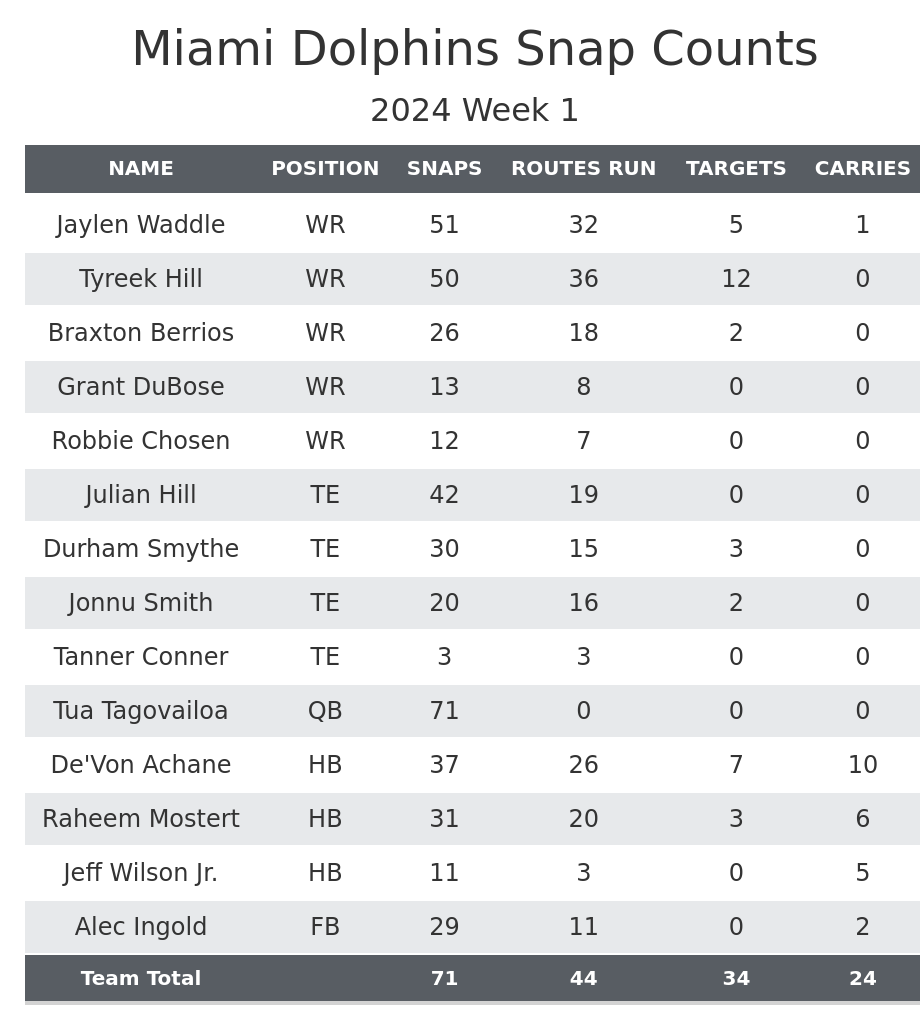
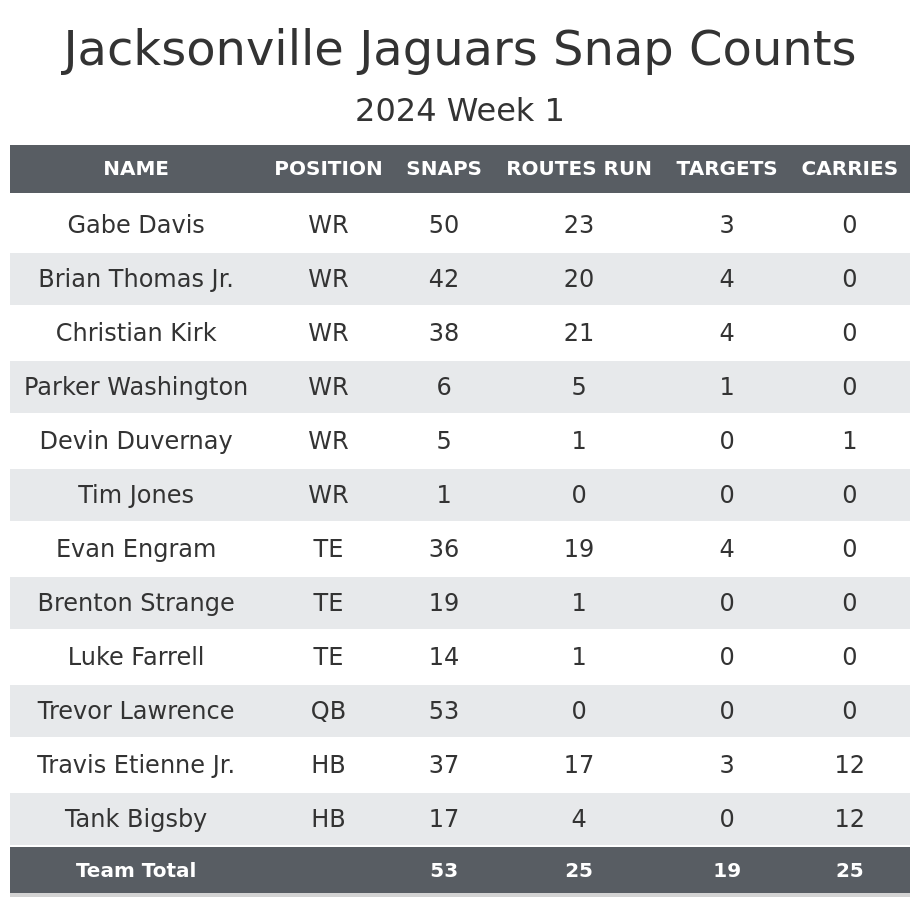
Tank Bigsby leads Jacksonville in rushing yards: Bigsby ran 12 times for a career-high 73 yards.
In comparison, Etienne also ran 12 times but for 44 yards and a touchdown. Etienne also brought in two passes for 15 yards. Etienne was the primary running back in every situation with Bigsby cutting into his playing time on first down.
Last season, Etienne was consistently playing over 80% of Jacksonville's offensive snaps during the first half of the season but under 70% for the second half. Etienne played 69.8% of those snaps in this game, which was on the high end for him compared to the second half of last year. The difference this time around was Bigsby played all of the backup snaps instead of D’Ernest Johnson taking several of those snaps.
Etienne is still a must-start running back for now because he still played the goal-line snap and got some of the short-yardage work. If we reach a point where Bigsby has a large early-down role to go with the short-yardage and goal-line work, that could be bad news for Etienne’s fantasy production.
Bigsby should be a waiver wire target because he is both a handcuff and could have stand-alone value this season if he keeps playing this well.
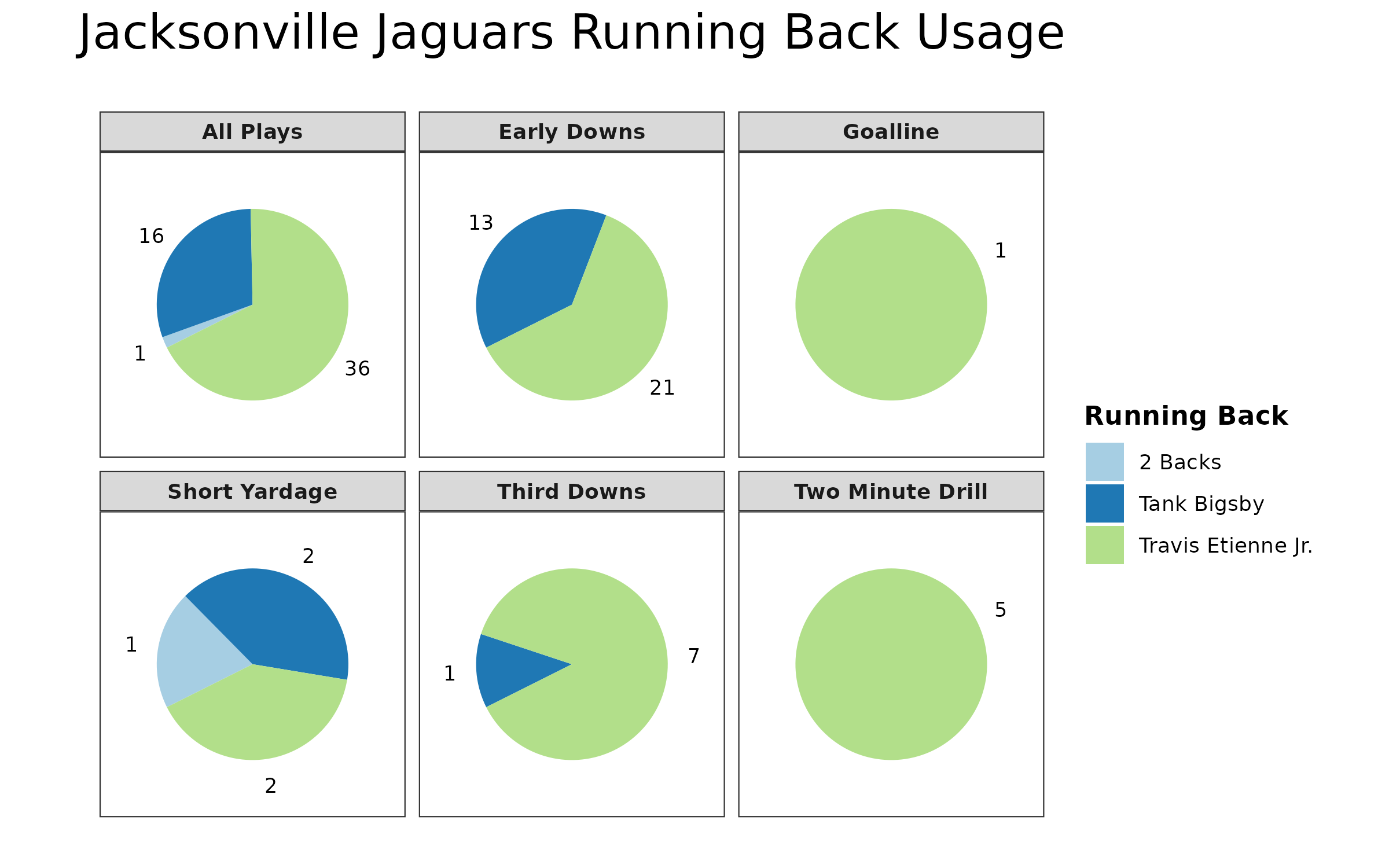
Gabe Davis leads the Jaguars wide receiver rotation: Davis played by far the most snaps among the Jaguars wide receivers.
Davis was the Jaguars' lead receiver in terms of both stats and playing time. One reason is Davis was the single wide receiver in one-receiver sets. The other reason is he consistently played in 12 personnel while the other wide receivers didn’t.
He played in nine of a possible 11 snaps in 12 personnel. Thomas played six and Kirk had four. Brian Thomas Jr. ended up playing slightly more snaps than Christian Kirk because Kirk was substituted out a little more in both 11 and 12 personnel. Given Davis’ playing time and how well Thomas played in this game, it wouldn’t be surprising if Kirk ends up third or fourth on the team in receiving yards this season.
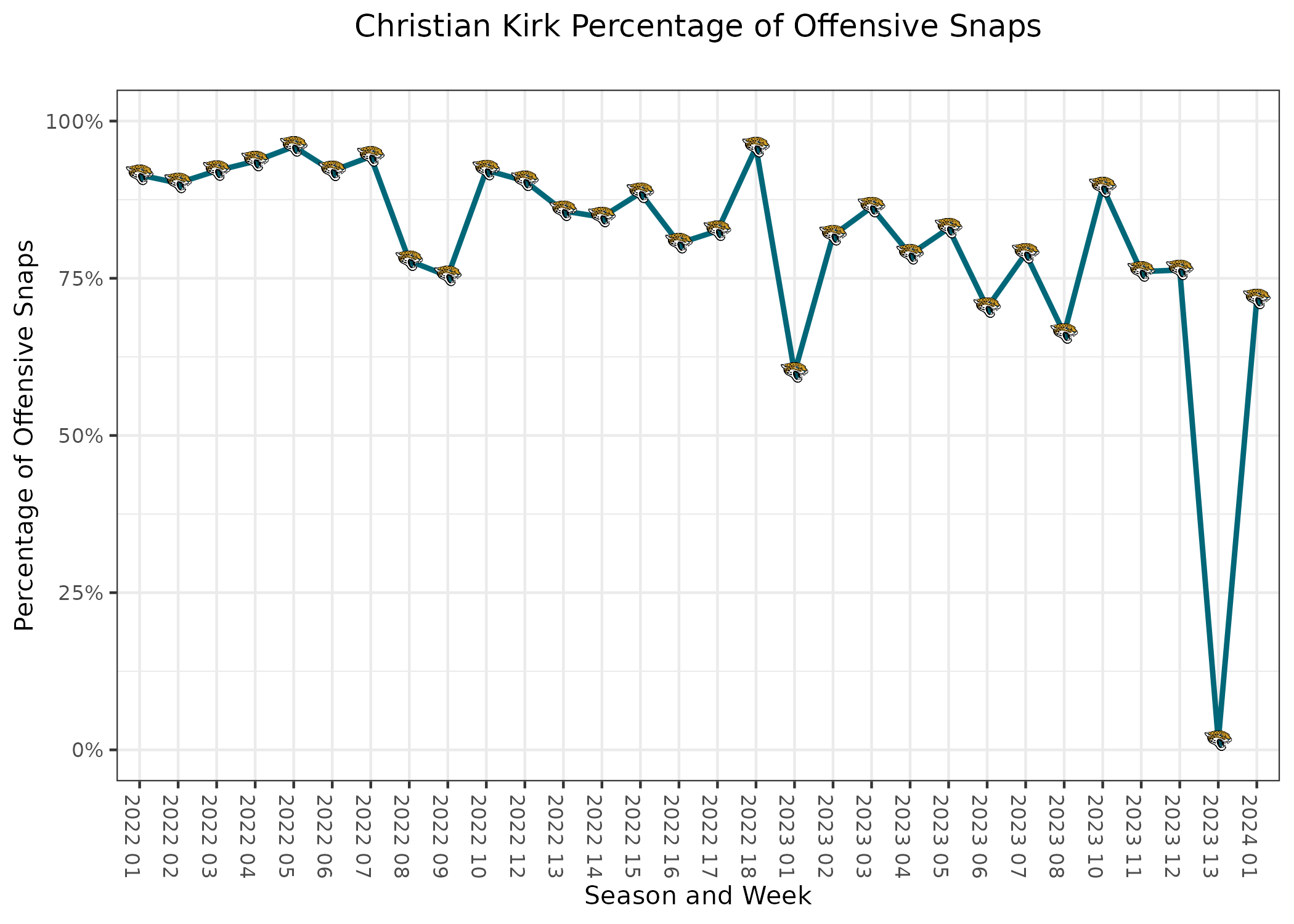
Evan Engram sees a decline in playing time: Engram played fewer snaps than the vast majority of games last season.
Engram’s median game last season was playing 79% of Jacksonville's offensive snaps. He was pretty consistently playing at least 84% of those snaps late in the season when he was one of the elite tight ends, and he played at least 70% of those snaps in all but two games.
It was noteworthy that in the preseason he was getting substituted out a little more than usual, which left him playing 69% of Jacksonville's offensive snaps with the starters. In this game, he played 68% of those snaps. Most of the snaps he was off the field for were run plays, so this should only have a minor impact on his fantasy value, but it’s possible that a minor amount could be the difference between him being a fantasy starter and not.
He averaged 10.4 fantasy points per game in 2022 and again in 2023 prior to Christian Kirk’s injury, only blowing up once Kirk was out for the season. He caught one pass for five yards in this game.
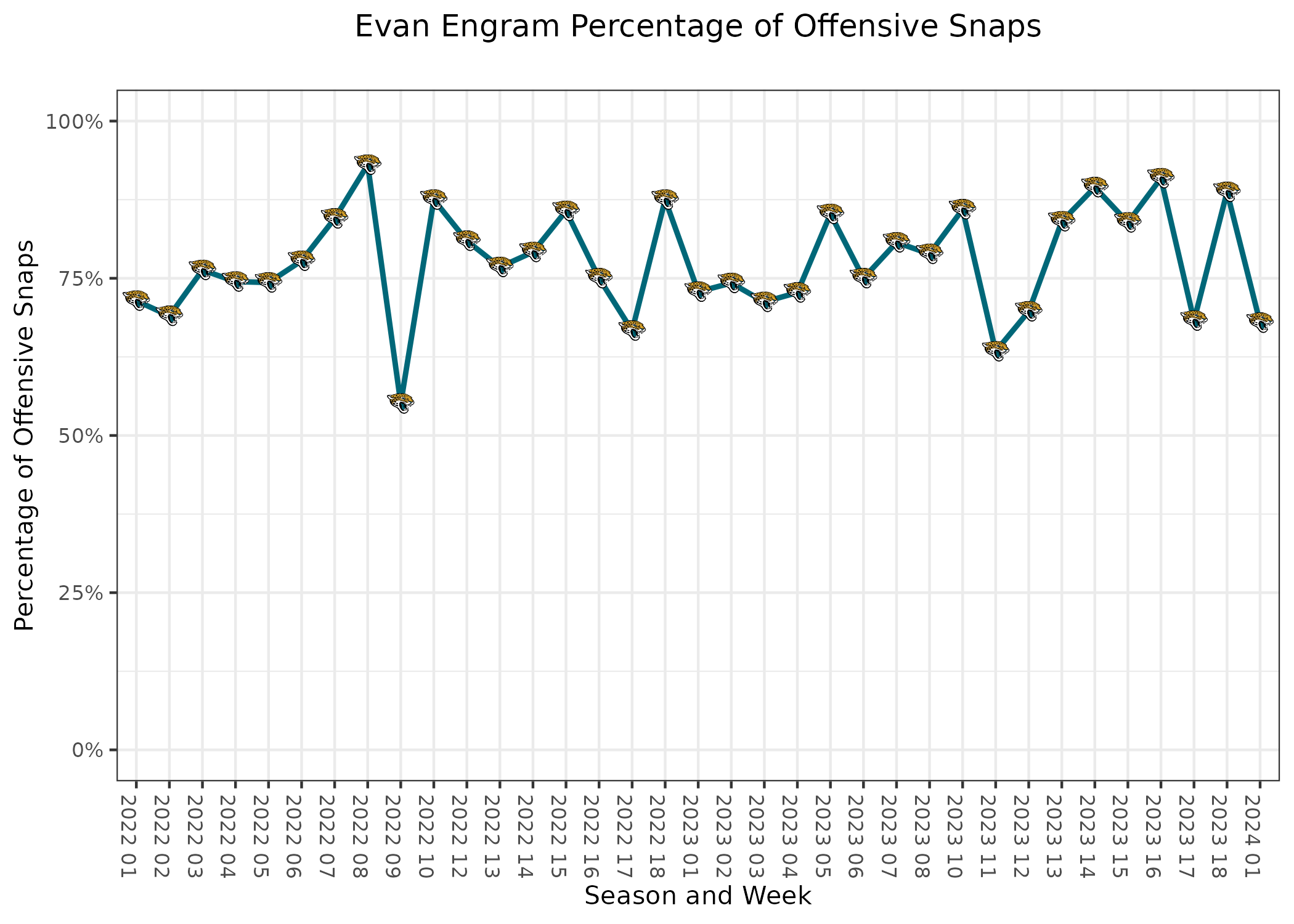
Miami’s running back rotation: The Dolphins continued to be primarily a two-man backfield. Achane put up the better numbers.
Both Raheem Mostert and De’Von Achane received significant work on both early downs and third downs. Achane was a large factor in the passing game with a career-high seven receptions. The team couldn’t get much of anything going in the run game. Mostert and Achane averaged a combined 1.0 yard before contact per carry.
The other big difference to last season is that Achane played both snaps within three yards of scoring. Mostert played 33 of a possible 42 snaps in that situation last year, while Achane only had seven. Three of those seven were in games Mostert didn’t play and on another two, Mostert was also on the field. If Achane is consistently taking those snaps at the goal line, then Achane could be a value compared to where he was drafted, and Mostert may no longer be a fantasy starter. We can expect his yards per carry and number of carries to increase, but it will be hard to start him without those touchdown runs.
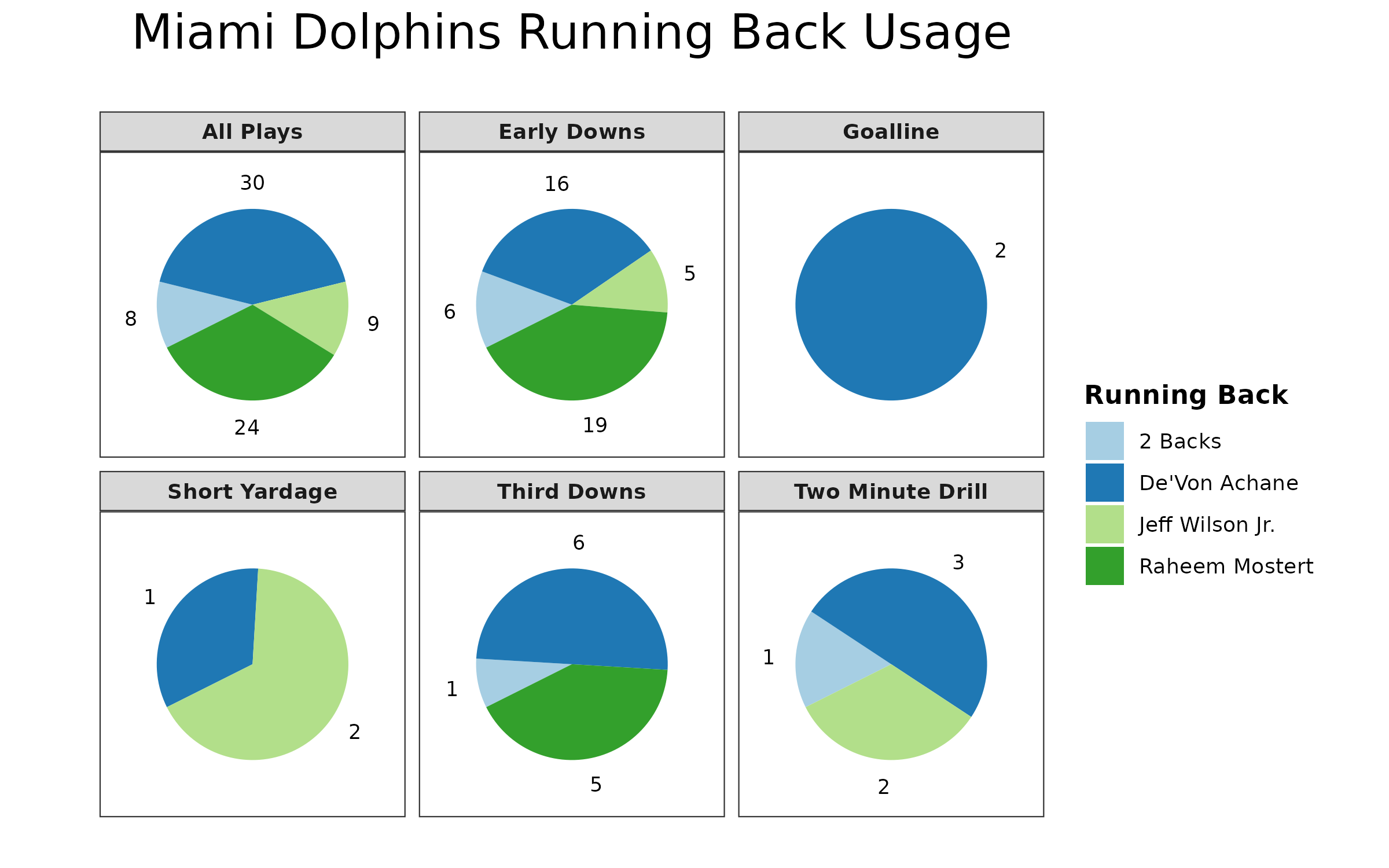
Dolphins use a heavy rotation of tight ends: Jonnu Smith was typically only on the field in 11 personnel.
Julian Hill ended up leading the Dolphins tight ends in offensive snaps. Smith played far less than 50% of the Dolphins' offensive snaps because he was the primary player in 11 personnel, Hill and Smythe were the primary tight ends in 12 and 22 personnel, and Hill was the guy in 21 personnel.
If it was a clear passing situation on third down, then Smith was the tight end, but in most normal situations, Smith wasn’t on the field. This is exactly how the Dolphins' tight end rotation looked in the preseason in the one game all three tight ends played. The difference is that a higher percentage of their plays were in 11 personnel in the preseason game.
It’s impossible for a tight end to have any level of consistency in fantasy in this role. He can be dropped from any roster he’s on.
Miscellaneous Notes
- The Dolphins wide receiver rotation was very similar to past seasons. Tyreek Hill, Jaylen Waddle and Braxton Berrios all played at least 20-of-23 snaps out of 11 personnel. In other formation groups, they were more okay rotating their wide receivers in and out of the game. The only difference was the backup wide receivers, including Grant DuBose, who was signed after cut-down day from the Green Bay Packers, and Robbie Chosen, who was elevated from the practice squad for this game.
- Dolphins’ rookie wide receiver Malik Washington missed this game due to a quadriceps injury. He was limited in practice early in the week but didn’t practice on Friday and was ruled out.
- Rookie running back Jaylen Wright was a healthy inactive for Miami. He remains fourth on the depth chart, and Miami only wanted three halfbacks active.
Carolina Panthers @ New Orleans Saints
- Alvin Kamara: 15 carries, 83 yards, 1 touchdown, 5 receptions, 27 receiving yards
- Rashid Shaheed: 3 receptions, 73 yards, 1 touchdown
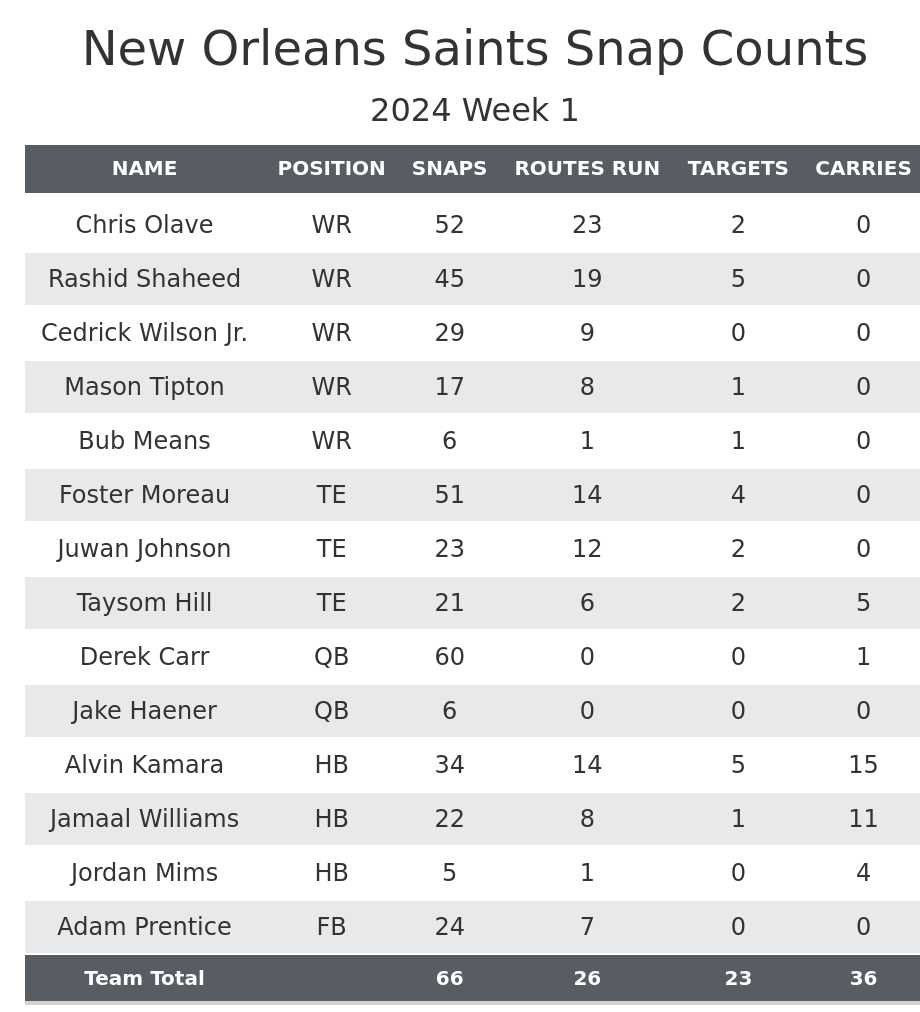
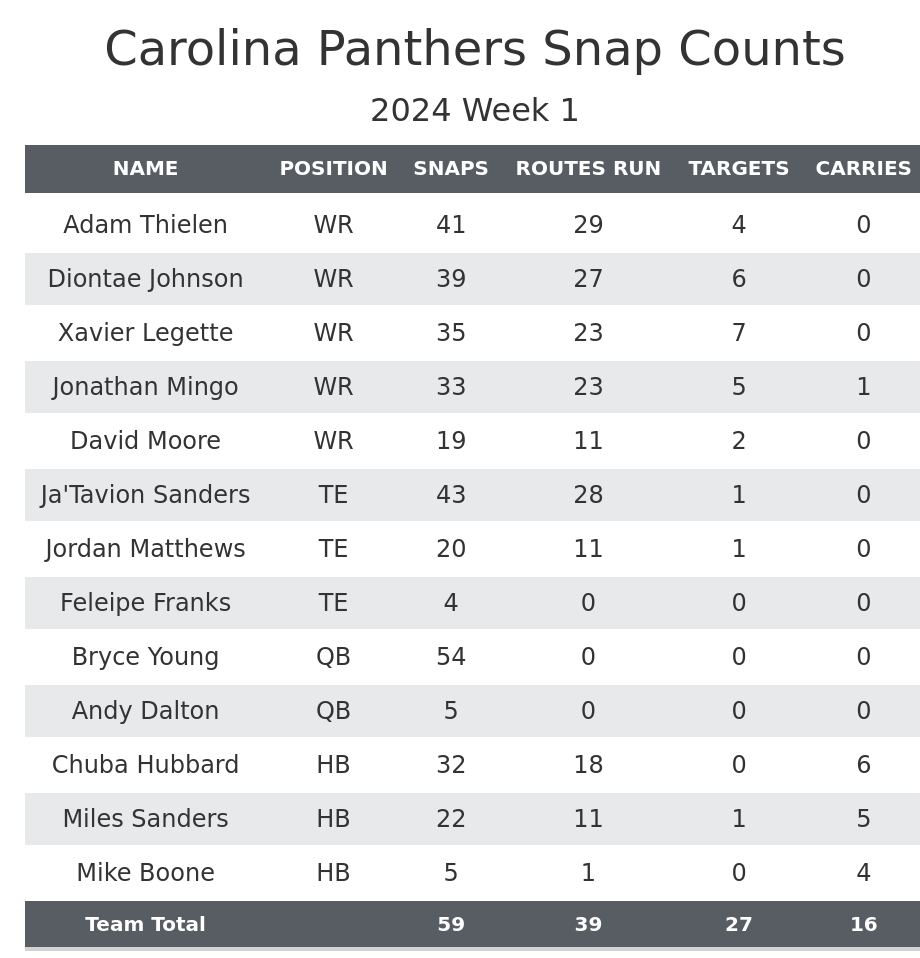
Panthers running back rotation: Miles Sanders played a surprisingly high number of snaps, which may or may not continue.
In the one drive in the preseason with the starters, Chuba Hubbard played 10 snaps to Sanders' two, which made it look like Hubbard was the clear back. In this game, the Panthers rotated by drive instead of by situation. For most of the game, Hubbard took two drives to Sanders' one, but the Hubbard drives were very short, which is why he likely played more drives. Hubbard had drives one, two, four, five, seven, eight and 10 while Sanders played drives three, six and nine, and then he broke the pattern by also taking drive 11. Mike Boone played the last two drives with the backups.
If the Panthers continue this rotation, we should see Hubbard’s stats pull away from Sanders’ in future games. However, they may play Sanders more going forward after having slightly more success when he was on the field. Sanders could be worth a waiver add in case he starts seeing more time, although none of that will matter if the Panthers don’t start playing better as a team.
Carolina rotates their wide receivers more than expected: The Panthers ended up using a five-man rotation at wide receiver throughout the game.
The Panthers didn’t have anyone play more than 75% of their offensive snaps, even ignoring when the two drives with the backups to end the game. Carolina spent the vast majority of the day in 11 personnel.
Adam Thielen remained the primary slot receiver, but Jonathan Mingo, Xavier Legette and Diontae Johnson all played between nine-to-12 snaps in the slot as well. Diontae Johnson was the primary X receiver, but Legette, Mingo and Moore also played snaps from that spot.
Players like Johnson were expected to be fantasy starters because we thought he would play more snaps and the offense, in general, would be better. He should stay on rosters but probably not in fantasy starting lineups. It’s also worth noting Xavier Legette played significantly. He only overtook Jonathan Mingo in snaps because he played with the backups at the end of the game, but given his seven targets, he could end up a major part of this offense as the season progresses.
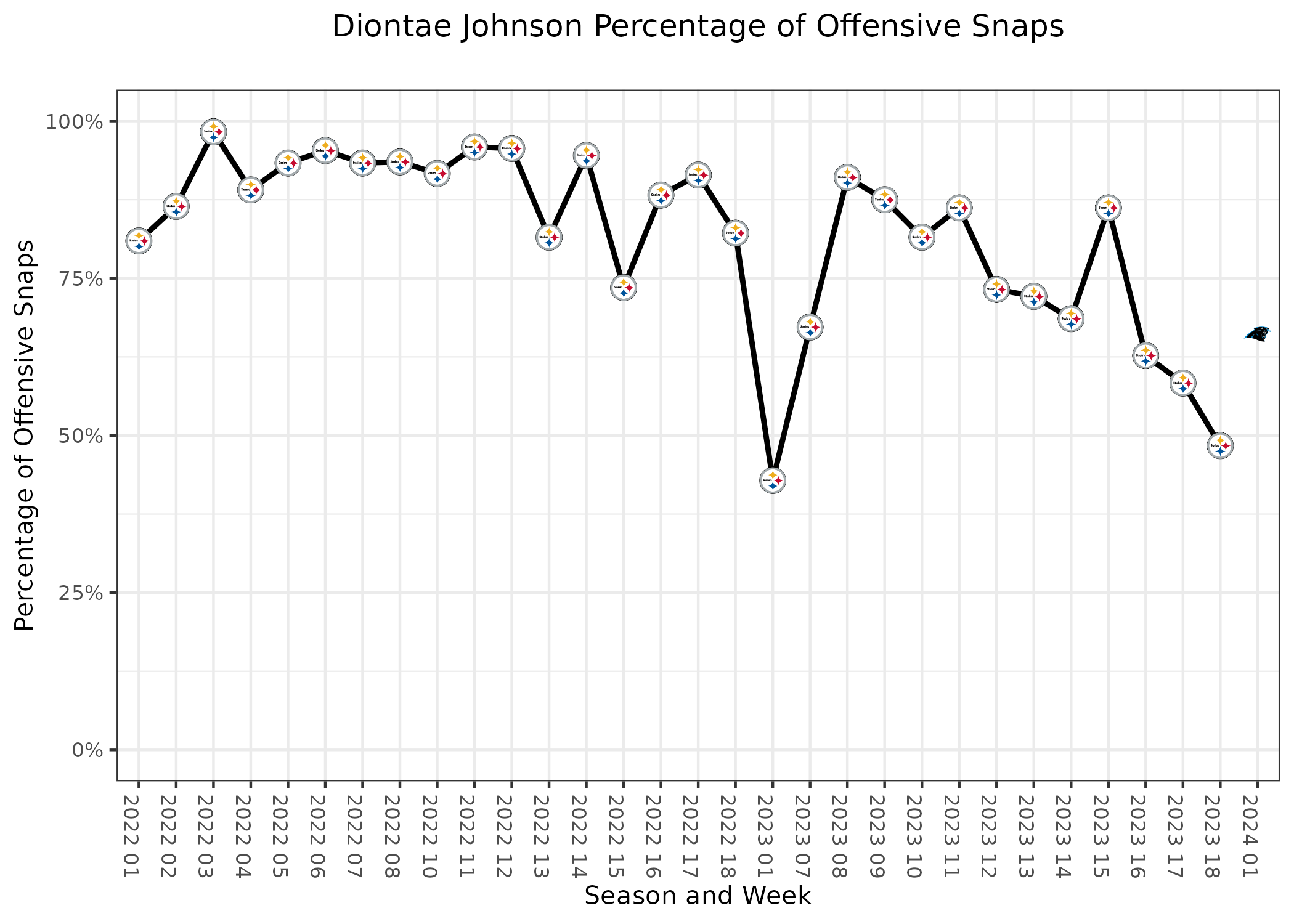
Rashid Shaheed shines in a larger role: Shaheed was a full-time starter as expected and made his signature big play.
The Saints didn’t bring back Michael Thomas, which left one starting position open in the wide receiver room. Shaheed was the presumed starter, but after missing so much time during training camp with a new offensive coordinator, this was no guarantee.
Luckily, he was a full-time player, playing a high majority of New Orleans' offensive snaps in every important personnel grouping. He was rotated out here and there and didn’t play in single-receiver sets. He received a similar snap rate as the end of last season, and there is room for him to play more, considering he was coming back from injury.
Ideally, he would see a somewhat higher target share, but this was a promising first game in the new system.
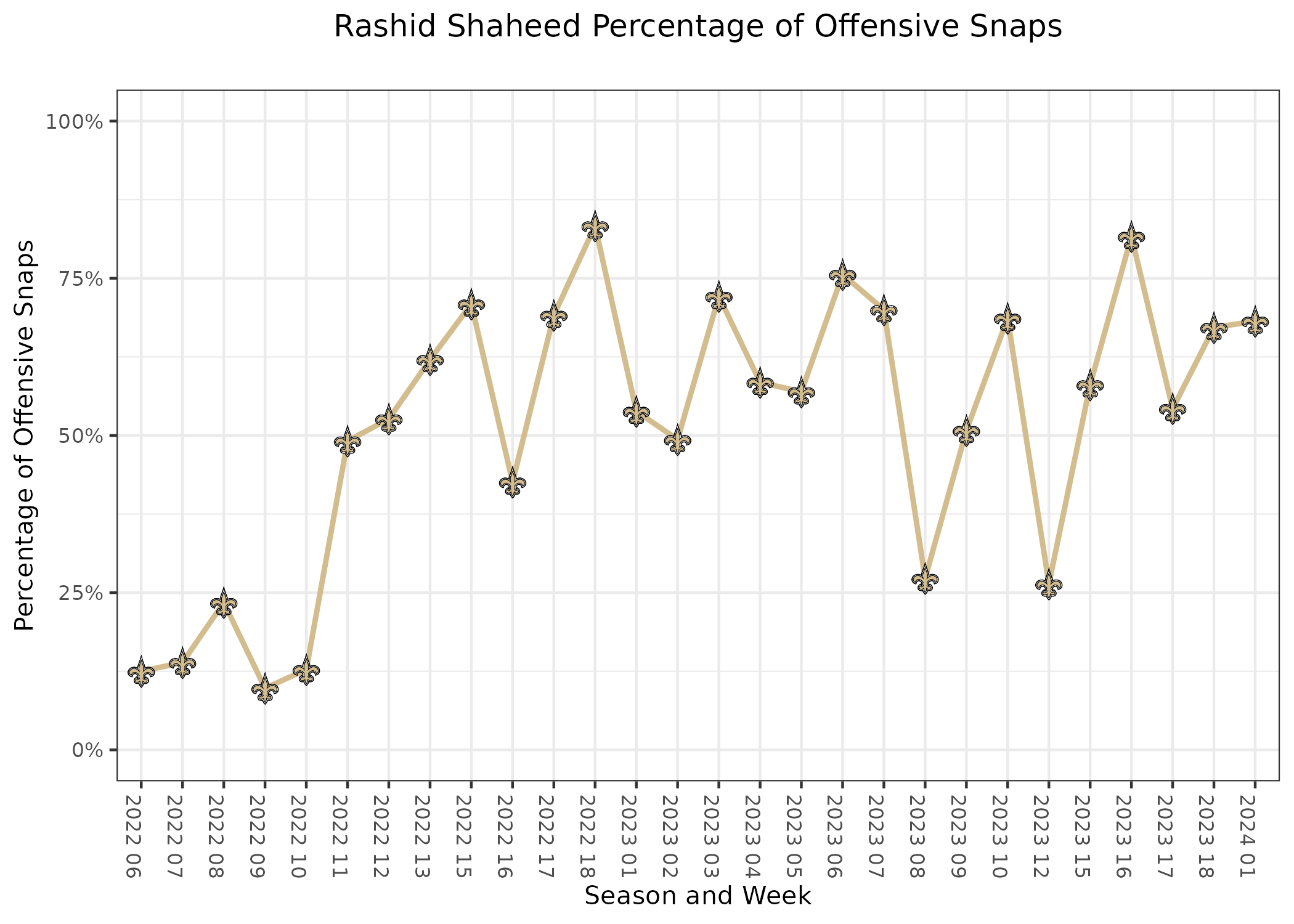
Miscellaneous Notes
- Panthers tight end Tommy Tremble was ruled out on Friday due a hamstring and back injury while Ian Thomas landed on injured reserve on Saturday due to a calf injury.
- Rookie Ja’Tavion Sanders was the primary tight end with the other two out. He is worth a waiver wire target in deeper leagues given his playing time, but the offense needs to play better and he needs a higher target share.
- Saints’ backup tight end Dallin Holker was ruled out on Friday due to an ankle injury.
- Saints backup wide receiver A.T. Perry was inactive. He did not practice on Thursday or Friday due to a hand injury and was officially questionable.
- Foster Moreau was the clear lead tight end over Juwan Johnson. Johnson missed significant time this offseason, which could have influenced this, but it’s also possible Moreau will simply play a higher percentage of New Orleans' offensive snaps this season thanks to his blocking and history with Derek Carr. Juwan Johnson shouldn’t be in fantasy rosters until he has a larger role.
- There was plenty of speculation Taysom Hill could have a large role in the Saints offense. He played one snap at quarterback, seven at halfback, five at fullback, five at tight end and three in the slot. He ran the ball five times for 35 yards but only caught one of two passes for one yard. The usage wasn’t all that different from last season. He can still remain in fantasy starting lineups thanks to his touchdown potential, even though he didn’t score in this game.
Minnesota Vikings @ New York Giants
- Aaron Jones: 14 carries, 94 yards, 1 touchdown, 2 receptions, 15 receiving yards
- Justin Jefferson: 4 receptions, 59 yards, 1 touchdown
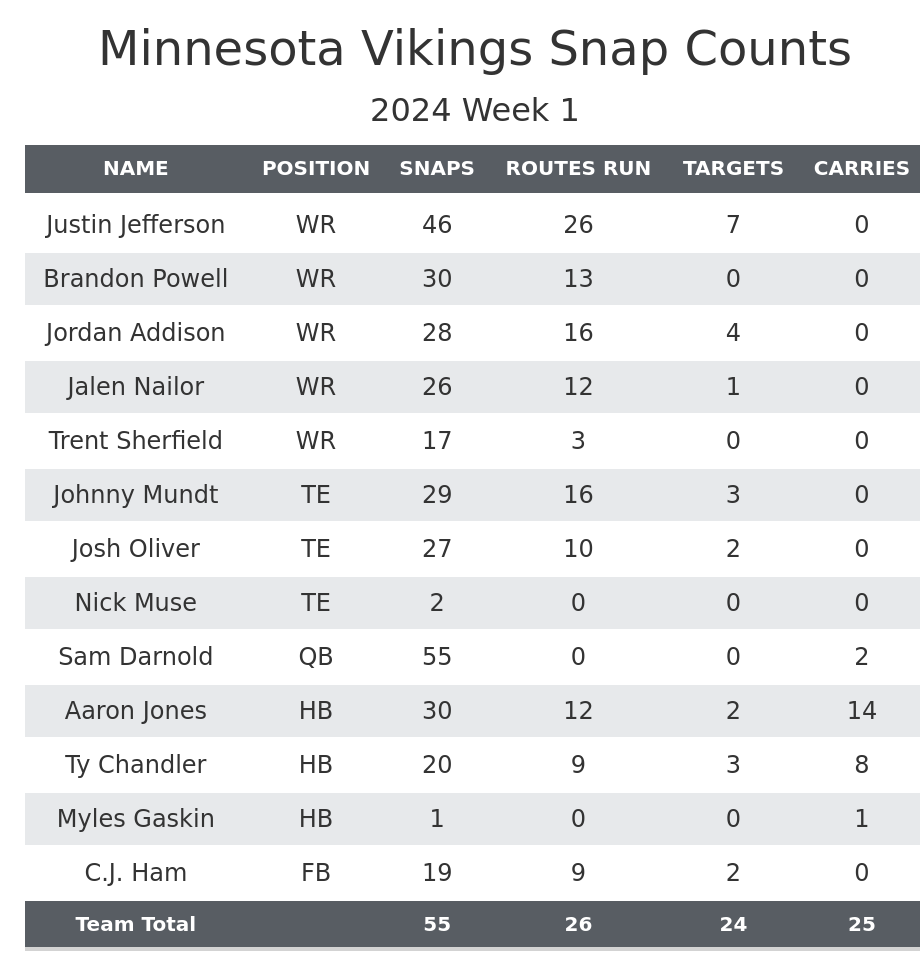
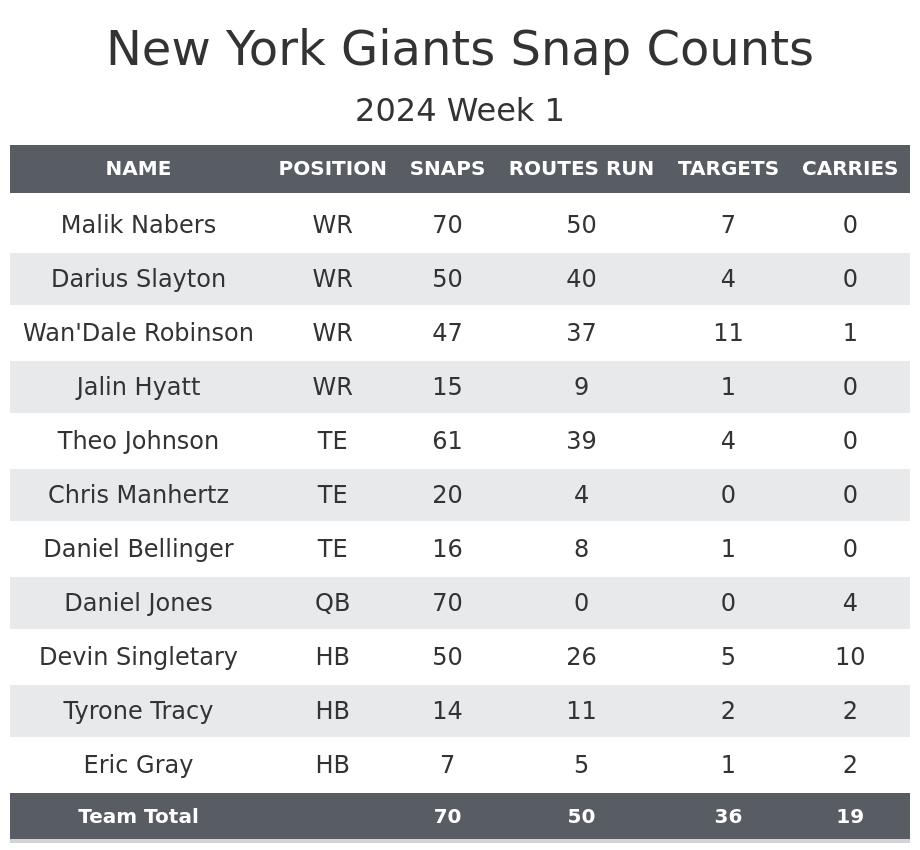
Aaron Jones shares the Vikings backfield: Ty Chandler played a higher percentage of snaps than we originally thought he would.
The Vikings mostly rotated their running backs by drive. Jones played the clear majority of snaps on six drives while Chandler played the majority on the other four. The Vikings were more likely to get the ball to Jones when he was on the field compared to Chandler when he was on the field. Jones was also the much more effective runner, averaging 6.7 yards per carry compared to Chandler's 2.1.
Typically, in important situations like short yardage and two-minute drills, Jones is on the field. This should still be enough playing time for Jones to consistently be in fantasy starting lineups, but there could be a game or two this season where Chandler gets a hot hand and sees a higher percentage of touches.
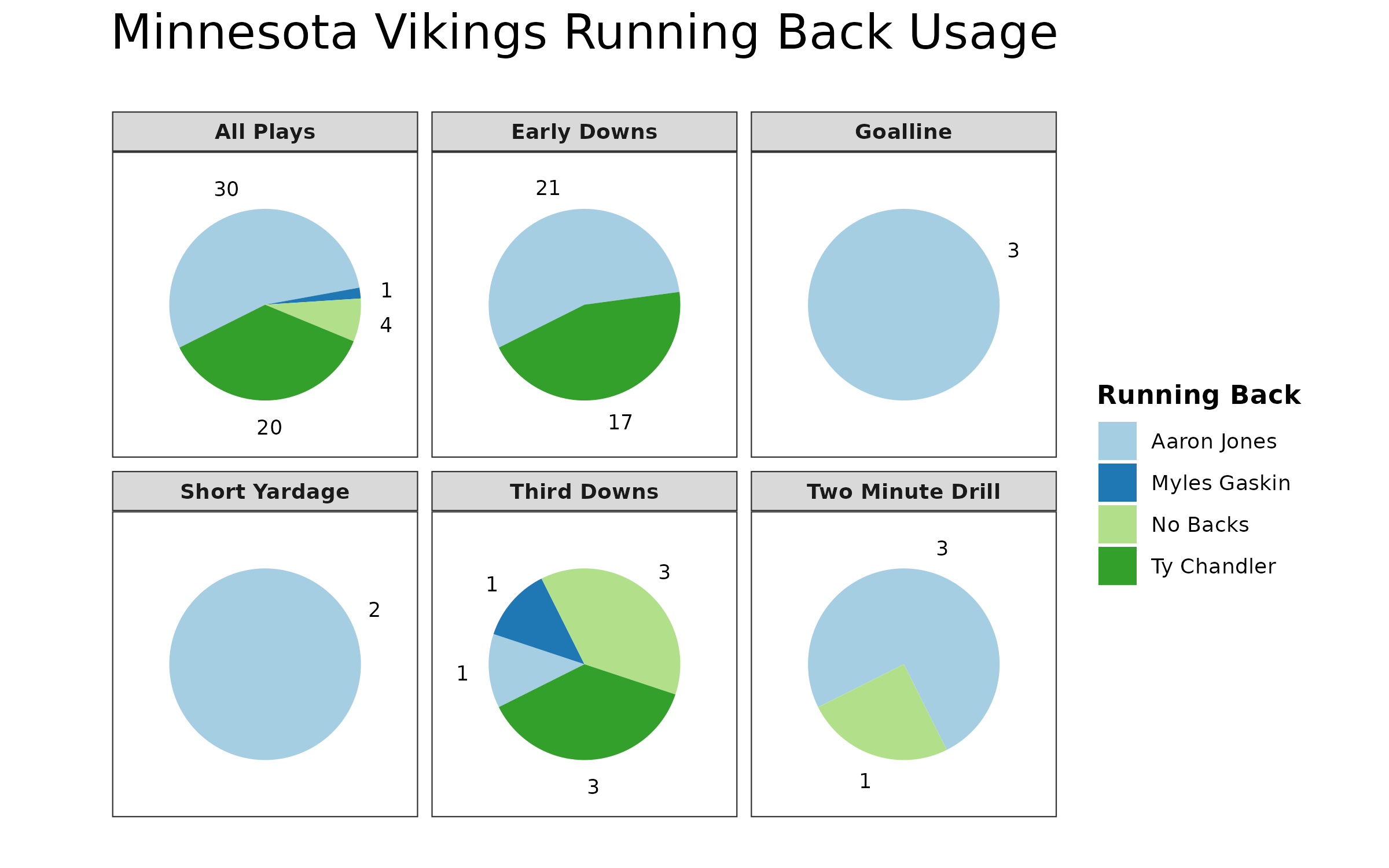
Monitor Jordan Addison’s health: The Vikings second-year wide receiver suffered an ankle injury early in the second half and was quickly ruled out.
Justin Jefferson joined Addison as the two every-down wide receivers to begin the game as expected. The big question was how snaps would be distributed between Brandon Powell and Jalen Nailor. Nailor was viewed as the favorite, but Powell played 14 snaps in the first half to Nailor's six. Jefferson only sat out one play in the first half, while Addison sat out two.
In the second half, Addison only lasted two snaps before suffering his injury. In 11 personnel, both Nailor and Powell were consistently on the field, while in 21 personnel, it was Trent Sherfield. Sherfield also mixed in for some of the run plays out of 11 personnel. If we discover that the Addison injury is very serious, Nailor would be the waiver wire target as the player with the most upside.
Malik Nabers and Wan’Dale Robinson dominate targets: The two young receivers were Daniel Jones‘ clear priority throughout the game.
The first-round rookie wide receiver never left the field for the Giants, which is excellent to see. He was targeted seven times, catching five passes for 66 yards. Given how much the Giants will likely need to pass this season, Nabers can remain in fantasy starting lineups.
Wan’Dale Robinson was the slot receiver in three-receiver sets, as expected. He was targeted 11 times, which led to six receptions for 44 yards. Robinson should be one of the better waiver-wire targets at receiver, considering how many targets he should receive. He played a few snaps in two-receiver sets, but this is a case where the team plays 11 personnel so much that it can be OK that he’s mostly playing in three-receiver sets.
The one surprise is how much Darius Slayton played over Jalin Hyatt. In the preseason with the starters, the two split time with Hyatt playing more in 11 personnel and Slayton more in 12. In this game, it was just Slayton ahead of Hyatt. Given that these players are just the third receiver in an offense that didn’t score a touchdown, neither player should be on fantasy rosters.
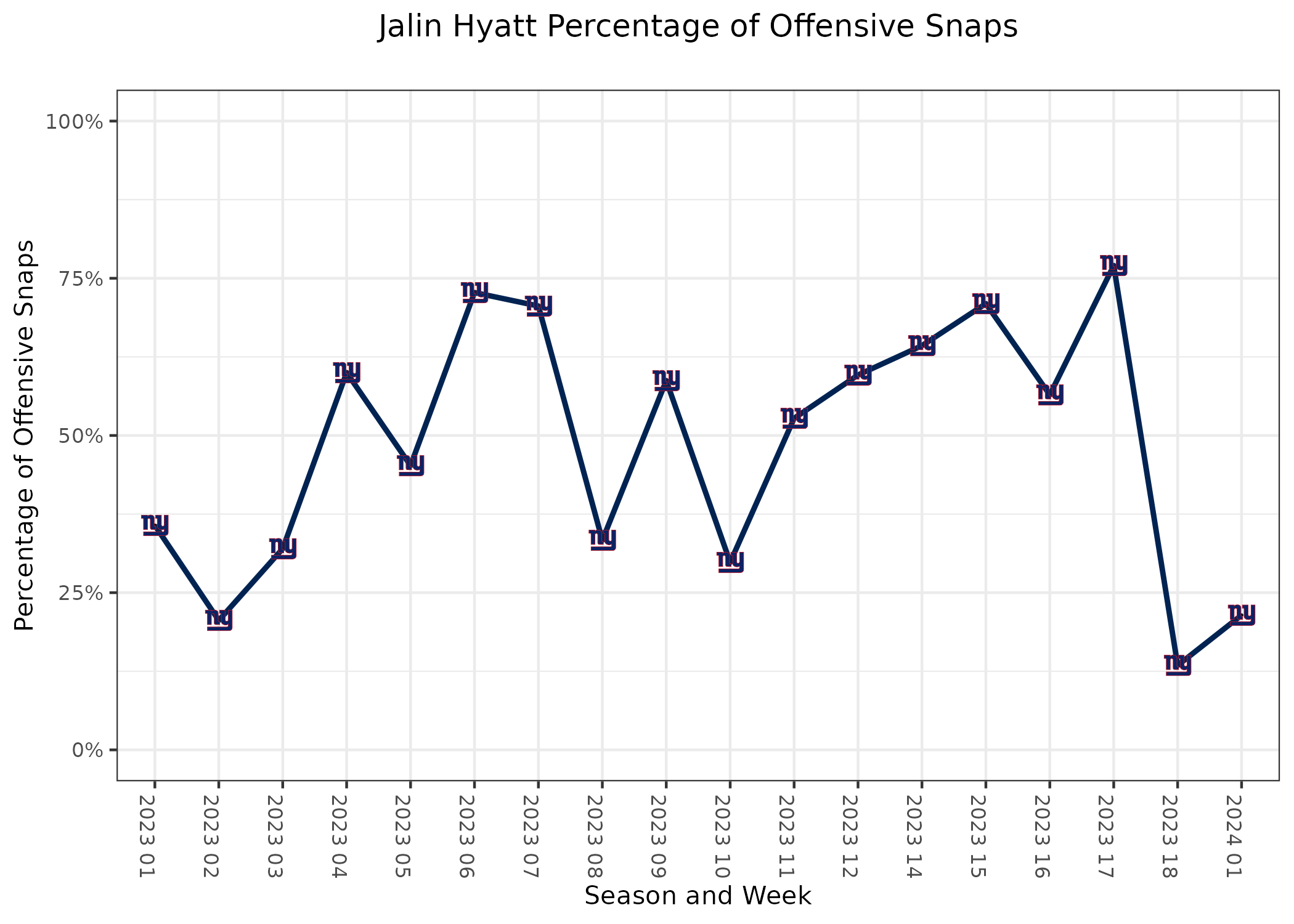
Theo Johnson takes over the Giants tight end room: The rookie tight end was in a heavy rotation throughout the preseason.
Johnson rotated with both Daniel Bellinger and Chris Manhertz in the preseason, but he was playing in both 11 and 12 personnel during the preseason, making it clear he was capable of playing more snaps because he was used in all situations. In this game, he was the clear lead tight end, only leaving the game for nine of a possible 70 snaps.
He was targeted four times but only brought in one pass for 18 yards. While the offense needs to play better and he needs more targets to be a potential fantasy starter, he’s at least playing enough snaps, which is a hurdle several tight ends for other teams won’t be able to surpass this season.
Miscellaneous Notes
- With T.J. Hockenson out, Johnny Mundt was the primary tight end in 11 personnel and Josh Oliver in 21 personnel. While Olvier had the better receiving numbers in this game thanks to a 22-yard reception, if you had to pick one of the tight ends of the two to roster, it should be Mundt.
- Devin Singletary played 71% of New York's offensive snaps, which wasn’t quite as good as his snap rate in the preseason but still is good enough to be a fantasy starter depending on the Giants’ opponent. It is worth noting that on the Giants' only goal-line snap, Tyrone Tracy was on the field. If that consistently happens, it will be much harder to start Singletary.
Las Vegas Raiders @ Los Angeles Chargers
- J.K. Dobbins: 10 carries, 135 yards, 1 touchdown, 3 receptions, 4 receiving yards
- Alexander Mattison: 5 carries, 19 yards, 4 receptions, 43 receiving yards, 1 receiving touchdown
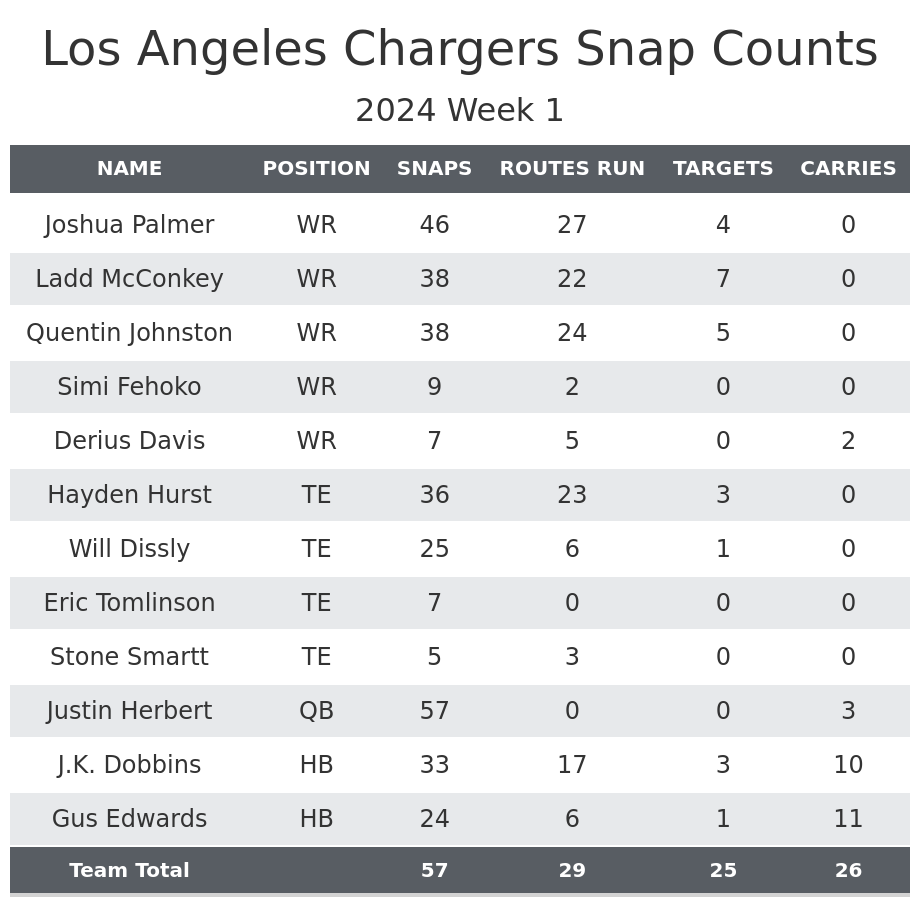
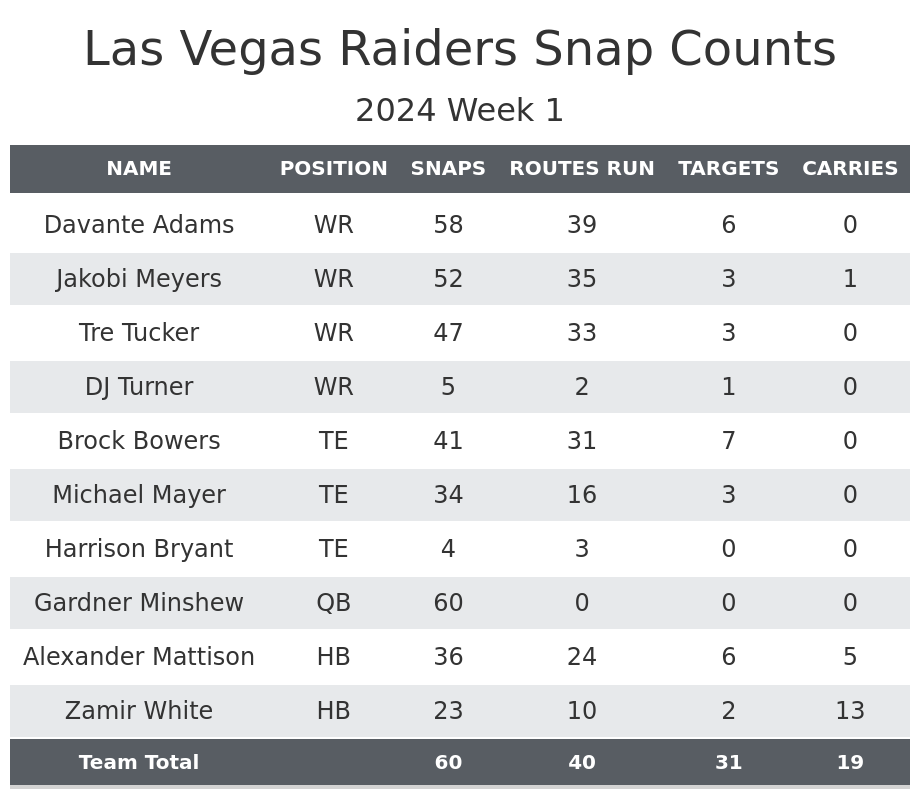
Alexander Mattison leads the Raiders backfield in snaps: Mattison ended up with more snaps and fantasy points than Zamir White.
The Raiders have four running backs on their roster but only used two on offense in this game. Dylan Laube was a healthy inactive and Ameer Abdullah did not play on offense.
Luke Getsy is the Raiders offensive coordinator, and in Chicago, he often used one running back on the first two drives and a different one on the third. He followed that pattern with the Raiders. White took the first two drives and Mattison played the third. The difference between this backfield and the ones from Getsy’s past is they don’t trust White on third down or the two-minute drill, which was apparent throughout the preseason.
On early downs throughout the rest of the game, White played 16 snaps to Mattison's 10. In games where the Raiders are winning, we can expect White to put up better numbers, but this game stayed close until the end. More often than not, we can expect Mattison to lead the team in snaps unless Laube is active and starts cutting into Mattison’s time. White should only be in fantasy starting lineups if the Raiders are favored to win.
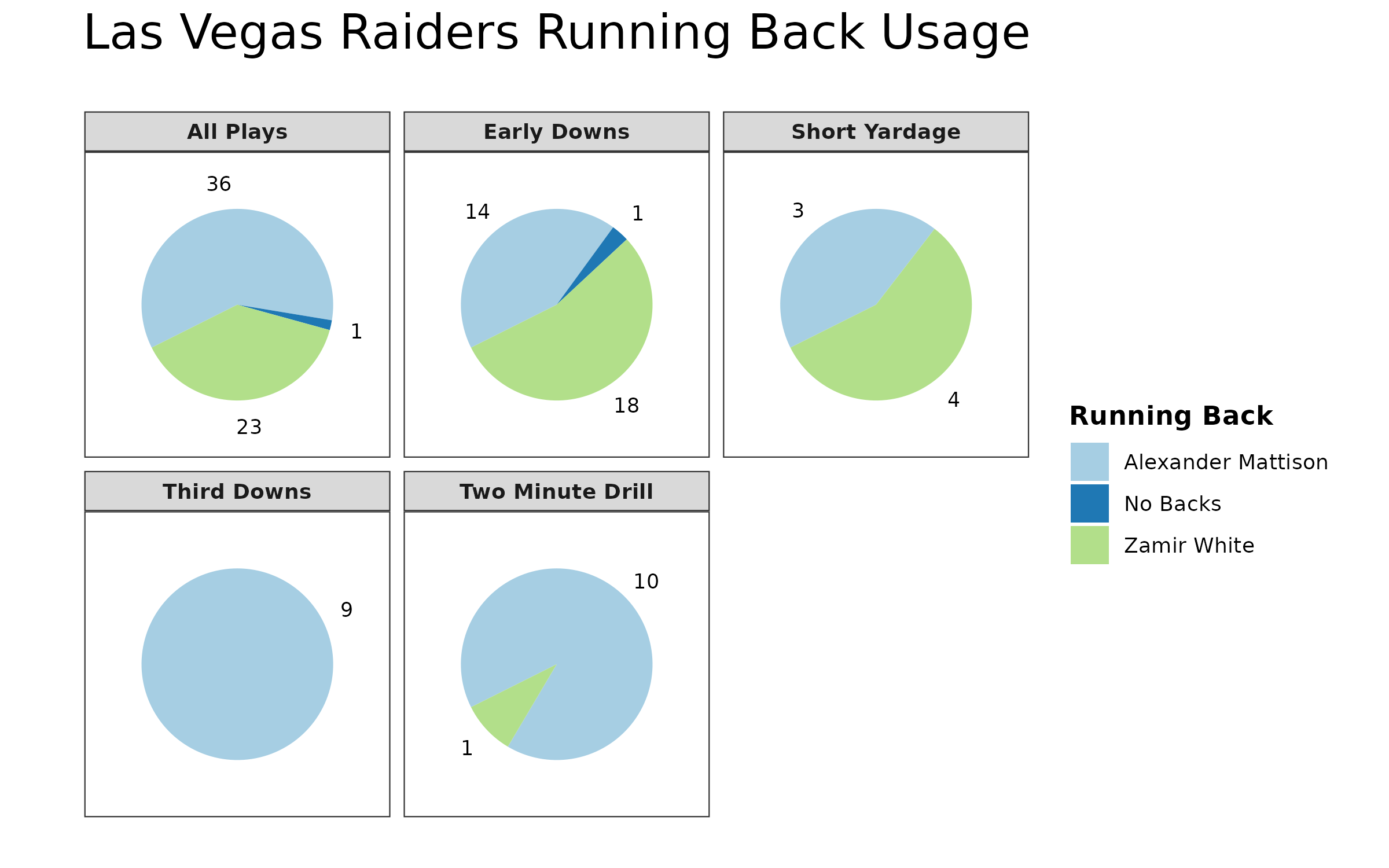
Monitor Brock Bowers’ usage: Bowers led the team in targets, but his playing time could still improve.
Bowers caught six of the seven passes thrown his way for 58 yards, making it one of the best days for a tight end. There is still room for Bowers to improve.
The Raiders only used both Bowers and Michael Mayer on the field for 15-of-60 snaps. In their first preseason game, it seemed like 12 personnel could be their base offense, similar to what we saw out of the Baltimore Ravens on Thursday Night Football, but that wasn’t the case — 75% of the time, it was just one of the two. Ideally, they increase 12 personnel usage.
In 11 personnel, Bowers played 26-of-45 snaps with Mayer playing the other 19. When Bowers was on the field in 11 personnel, they threw the ball 89% of the time but when Mayer was on the field, it was 47%.
It’s worth noting Browers missed a bit of time in the last month due to injury and he was limited in practice early in the week due to a foot injury. This could have impacted his playing time. Bowers should stay in fantasy starting lineups, but his playing time could be the difference between a potential top-five season compared to a top-15.
J.K. Dobbins shines: Dobbins led the Ravens backfield in the offensive and was one of the most explosive runners of the day.
The Chargers used just a two-man backfield. Rookie Kimani Vidal was a healthy inactive. Dobbins and Gus Edwards split time on early downs while Dobbins was the passing-down back. Throughout the preseason, the general consensus was Edwards would play a higher percentage of early-down snaps.
This means Edwards’ role isn’t all that much different from what it was with the Baltimore Ravens, just behind a worse offensive line. He certainly can’t be in fantasy starting lineups in that role, and in some leagues, he could even be dropped.
On the other hand, Dobbins should be worth considering in fantasy starting lineups. Not only was he the more explosive running back, including a 61-yard run and a 12-yard touchdown run, but he’s also much more likely to be involved in the passing game. He caught three passes to Edwards' one. Ignoring fantasy, this was also great to see from Dobbins considering all of the injuries he’s dealt with in his career.
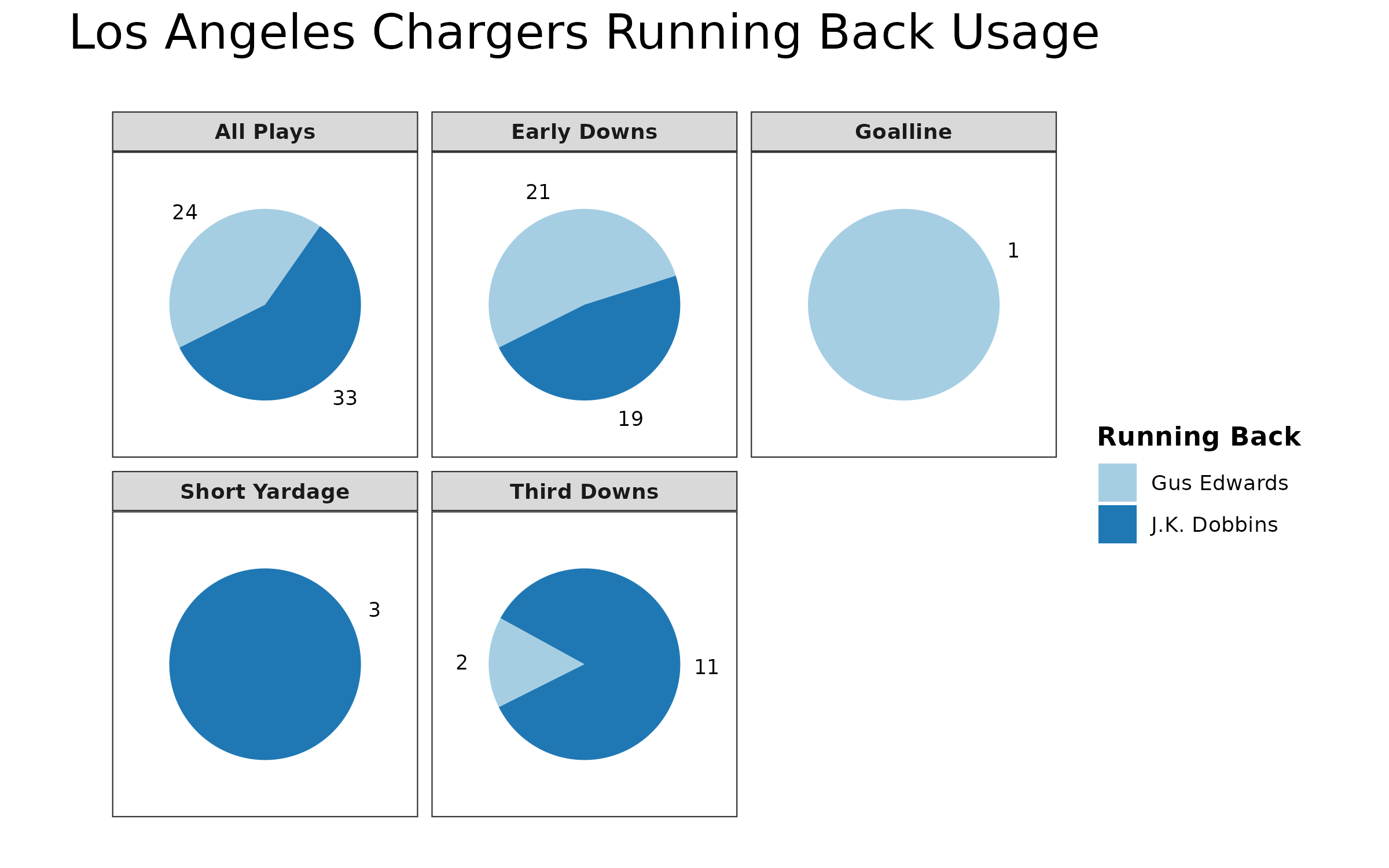
Ladd McConkey plays in 21 personnel: McConkey didn’t play in two-receiver sets in the preseason but did play some snaps there against the Raiders.
The Chargers were down D.J. Chark, who landed on injured reserve, while seventh-round rookie Brenden Rice was a healthy inactive. This left Joshua Palmer, McConkey and Quentin Johnston as the clear top three wide receivers.
McConkey played in 29-of-33 snaps in 11 personnel, which was to be expected. The surprising part is he played in eight-of-10 snaps of 21 personnel while defensive tackle/fullback hybrid Scott Matlock was on the field. These are typically clear run plays, but they passed three times out of that personnel grouping, leading to three more routes by McConkey. The Chargers only ran six plays out of 12 personnel, where McConkey only played one of them. The Chargers also ran eight plays in single-receiver sets and McConkey wasn’t on the field for any of them.
McConkey led the Chargers in targets (seven), receptions (five), yards (39) and scored a touchdown, making it a promising start for the rookie wide receiver.
Miscellaneous Notes
- Based on preseason usage, it was clear Tre Tucker was the team's third wide receiver, and that remained true in this game.
- While Will Dissly had the big payday this offseason, Hayden Hurst was the primary tight end in receiving situations. Hurst played 25-of-33 snaps out of 11 personnel while Dissly took all 10 snaps in 21 personnel. Hurst caught two passes for 33 yards. It’s possible Hurst could have fantasy value this season if the Chargers become more pass-happy while playing from behind.
Denver Broncos @ Seattle Seahawks
- Kenneth Walker III: 20 carries, 103 yards, 1 touchdown, 2 receptions, 6 receiving yards
- Tyler Lockett: 6 receptions, 77 receiving yards
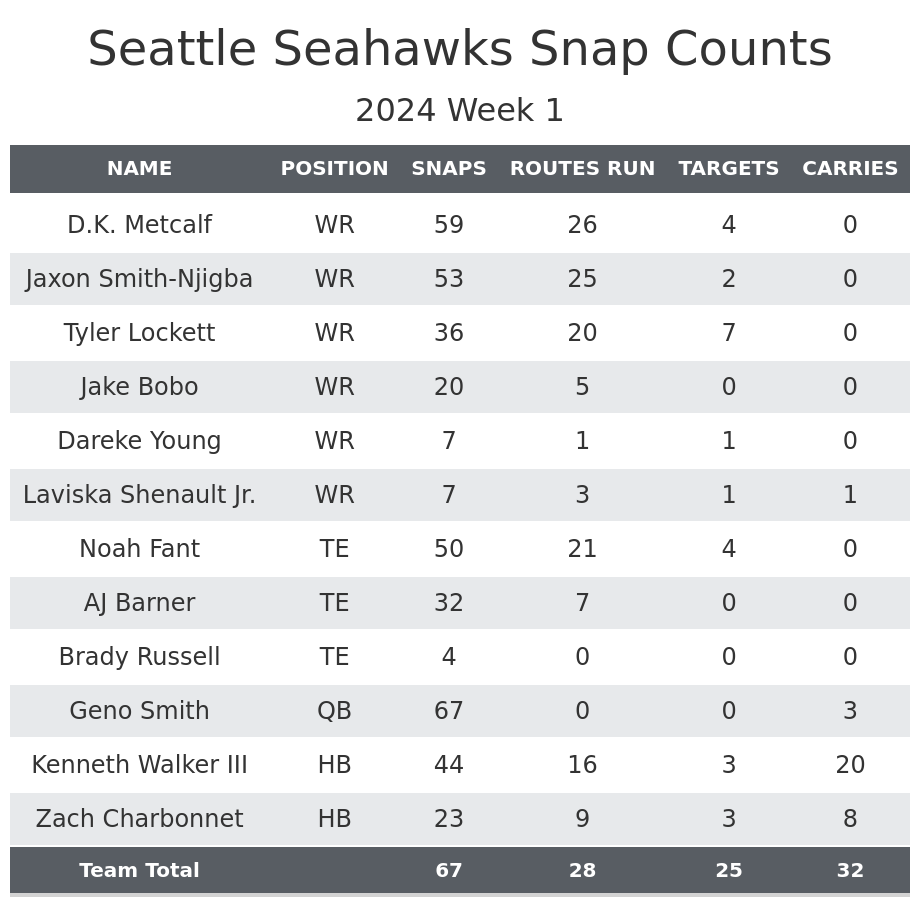
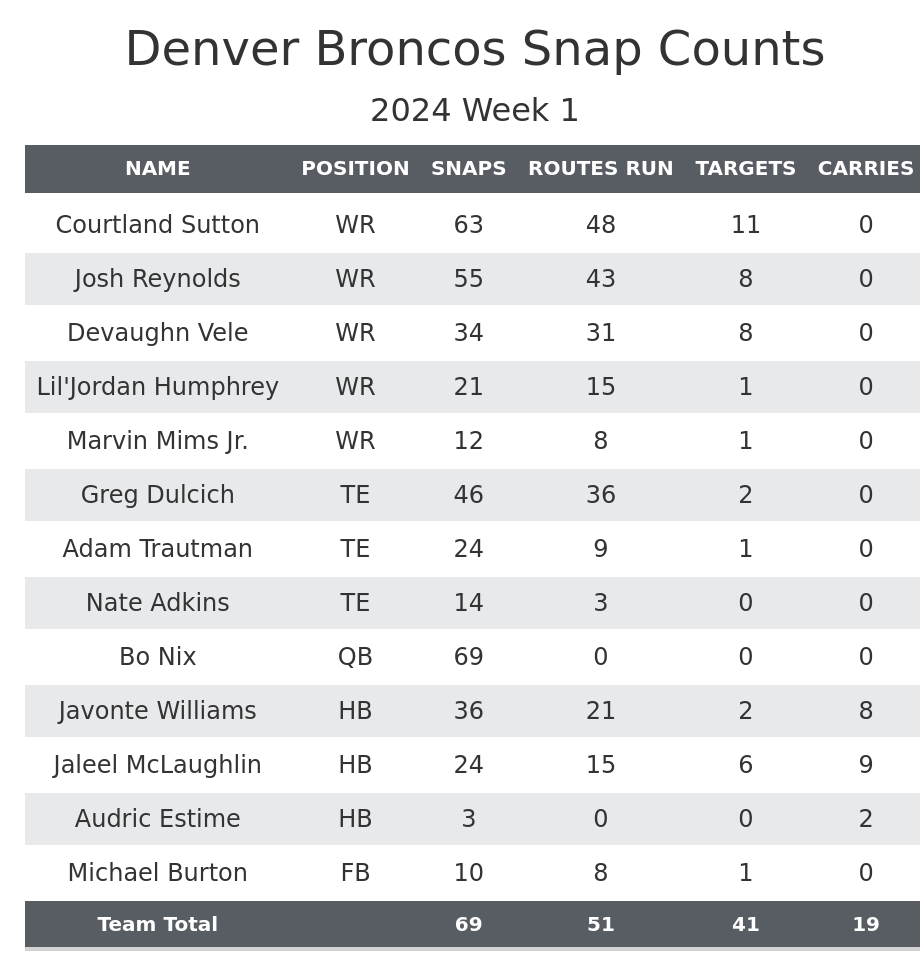
Broncos' two-man backfield is the opposite of what we thought: Jaleel McLaughlin ended up being the primary early-down back, while Javonte Williams played more in passing situations.
After releasing Samaje Perine, it was clear Jaleel McLaughlin would have a larger role in the offense. It was thought that McLaughlin would play more in passing situations given his success there in the past and how he was used in the preseason. However, McLaughlin ended up with more early-down snaps and more carries at 10 for 27 yards. Williams ran eight times for 23 yards.
McLaughlin ended up with five receptions for one yard while Williams caught one pass for no gain. Given the two players’ usage, we can expect Williams to end up with more receptions in the future. McLaughlin is available in several fantasy leagues and should be added off the waiver wire.
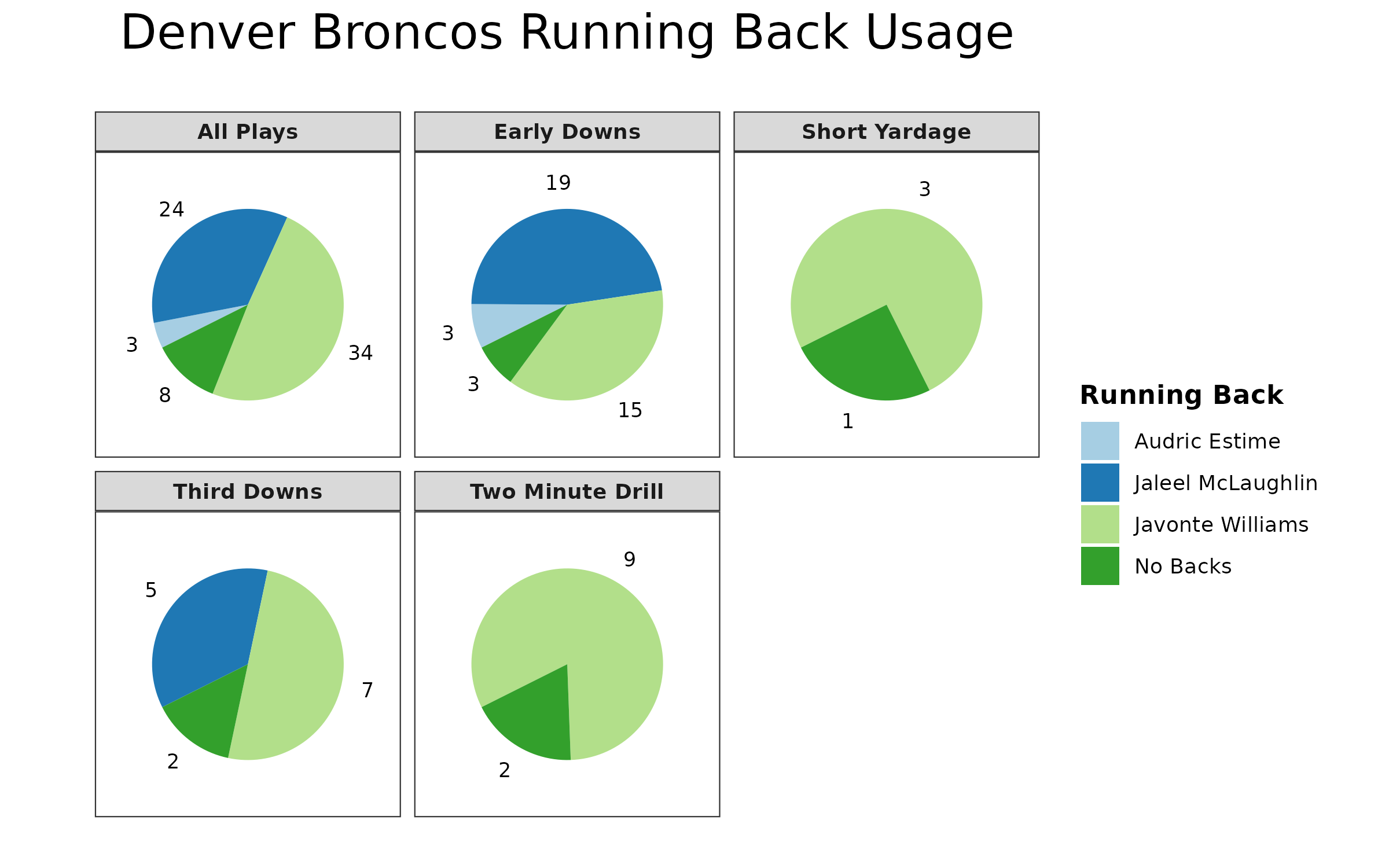
Devaughn Vele steps into the third receiver spot: Vele stepped up after Tim Patrick‘s departure.
The seventh-round rookie wide receiver played the third-most snaps and ran the third-most routes for the Broncos. Fourth-round rookie Troy Franklin was a healthy inactive, while last year’s early-round wide receiver Marvin Mims Jr. was fifth on the depth chart behind Lil’Jordan Humphrey, who was elevated from the practice squad for this game. Vele totaled eight targets, catching all of them for 39 yards. In deeper leagues, Vele should be a clear waiver-wire target given his playing time and how much Bo Nix already liked getting him the football.
Greg Dulcich‘s return: The Broncos' young tight end played much more than either game he played last season.
Dulcich was one of the favorite sleeper tight ends heading into 2023 until it became clear Adam Trautman was the Broncos’ primary tight end on early downs. Then, injuries derailed the rest of Dulcich’s season. The preseason suggested more of the same, but the Broncos' preseason also was more deceiving than any other team’s, outside of showing that Vele was high on the depth chart.
Dulcich played in 37 of a possible 47 snaps in 11 personnel. The only problem is he didn’t play a single snap out of 12 personnel. Nate Adkins joined Trautman for that personnel grouping. It was great that the Broncos played so much out of 11 personnel considering they had a lead for most of the game, but it’s no sure thing Dulcich’s playing time will stay high if the Broncos have a clear lead in the second half.
Dulcich caught two passes for 12 yards.
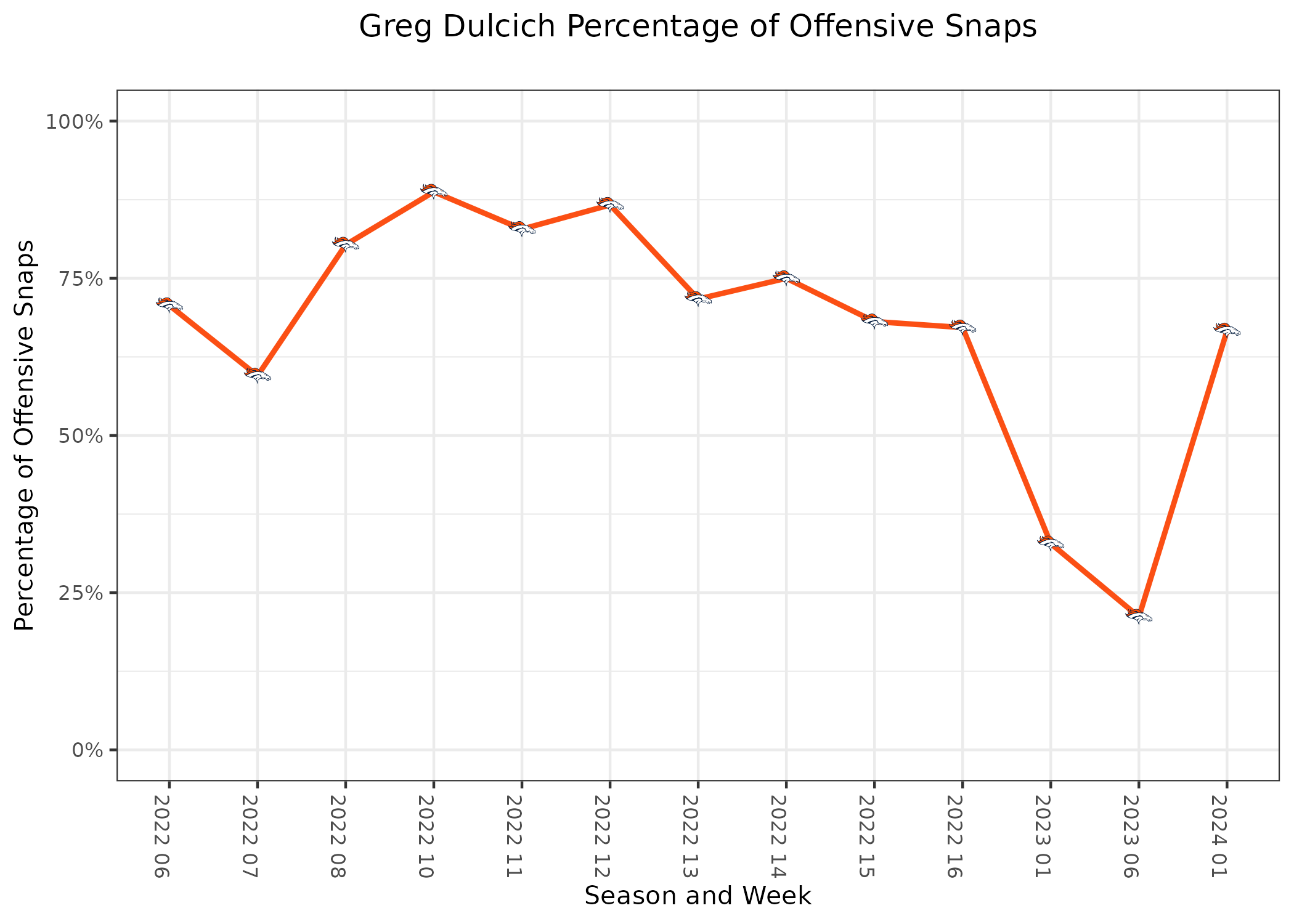
Monitor Kenneth Walker III‘s health: Walker ran 20 times for over 100 yards, which is something he only did once all of last season.
Walker put up good numbers, but some fantasy managers might be concerned that Zach Charbonnet scored 12 PPR points. In reality, this game was more promising for Walker’s fantasy value, assuming his health is fine.
Walker was the primary running back in all situations, including passing downs. He played three snaps in a short two-minute drill, but he only played 10% of two-minute drill snaps last season. He also played two snaps on third-and-10-plus, which is something he only did five times last season.
Charbonnet did take significant work on early downs, but over half of Charbonnet’s snaps came in the last 10 minutes of the game while Walker was out due to an abdomen injury. Prior to his injury, he was playing over 80% of Seattle's offensive snaps, which is more than he played in any game last season. Walker did say he was good after the game, but it will be a situation worth monitoring. Assuming he truly is good, Walker could be in store for a top-10 season.
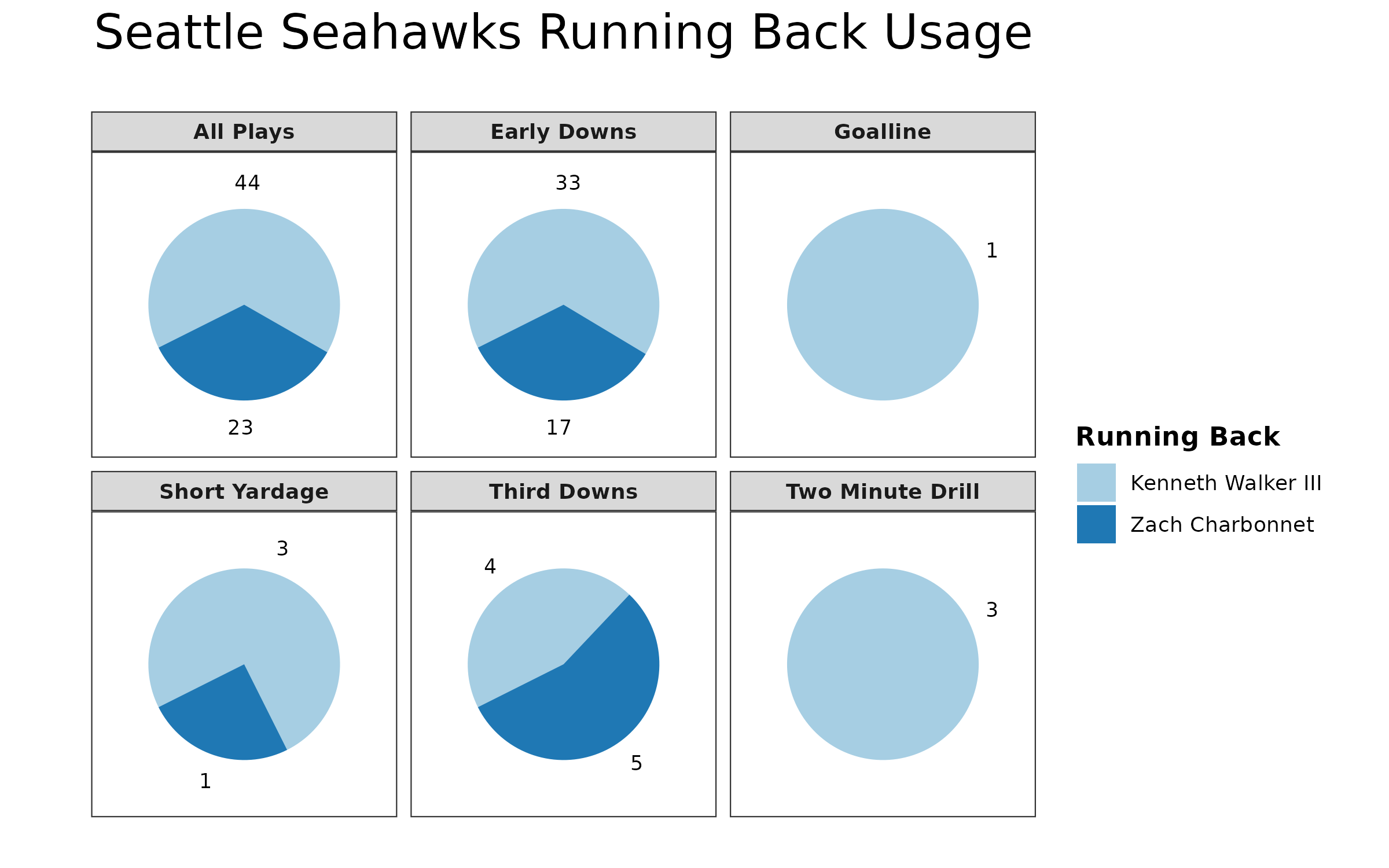
Good news and bad news for Jaxon Smith-Njigba: The former first-round pick received more playing time than he saw last season, but that didn’t lead to more fantasy points.
Smith-Njigba played in 42 of a possible 48 snaps in 11 personnel with Laviska Shenault Jr. taking a few snaps from him, which was fine. In 12 personnel, he played in 11 of a possible 19 snaps. He only played 16 snaps out of 12 personnel all of last season, so this is a huge step in the right direction. However, Tyler Lockett was questionable coming into the game, and 12 personnel was an obvious time for Lockett to take off. There were also some 12 personnel snaps where Jake Bobo was playing instead of Smith-Njigba.
This only led to two receptions for 19 yards for the second-year receiver, while Lockett caught six passes for 77 yards. If Smith-Njigba continues to put up low numbers like this, we can no longer blame his playing time for his lack of fantasy production.
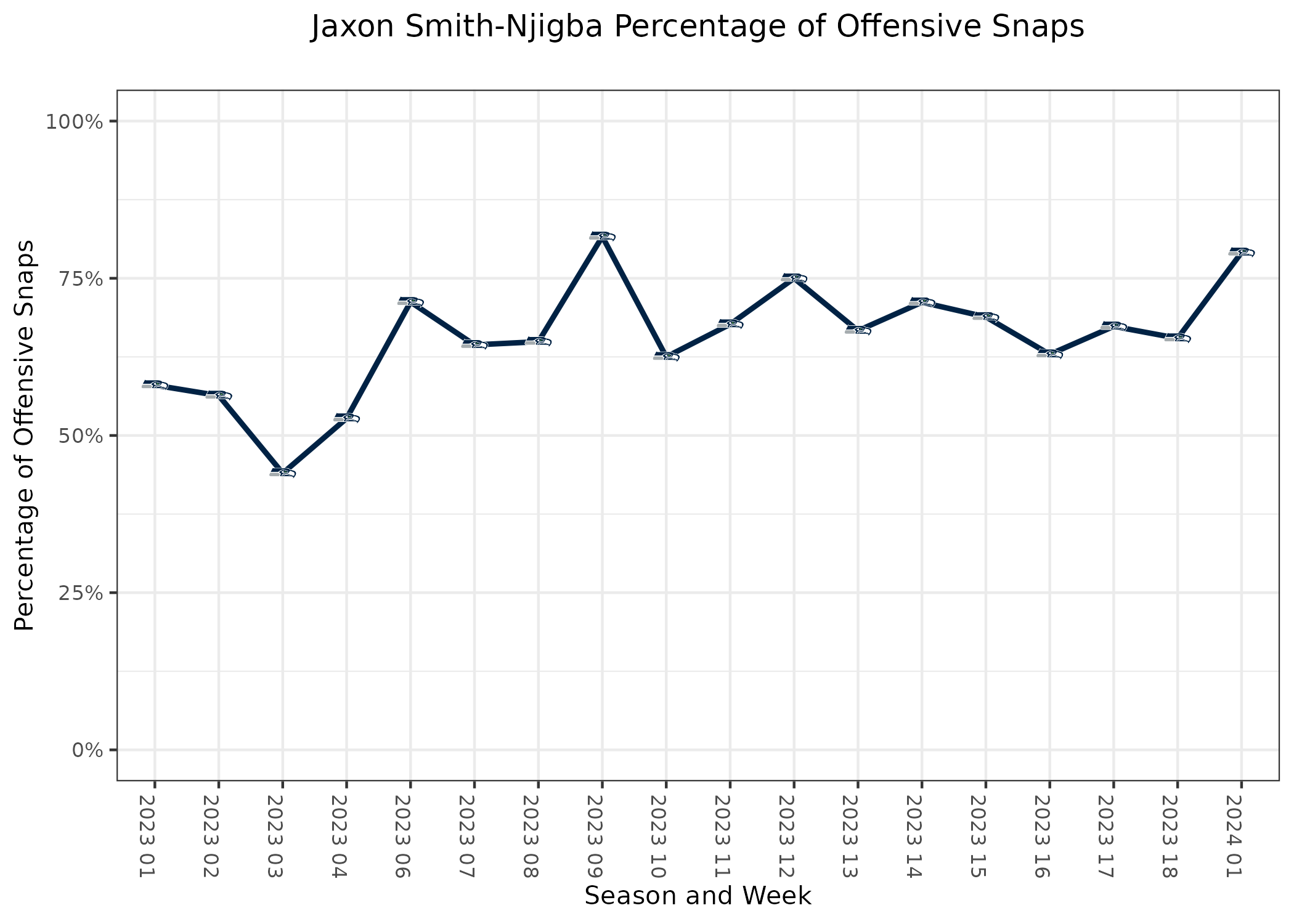
Miscellaneous Notes
- Seahawks backup tight end Pharaoh Brown was ruled out of this game on Friday due to a foot injury.
- Noah Fant played 75% of Seattle's offensive snaps, which is something he had only done once in the past two seasons since joining the Seahawks. He is also coming back from injury. It’s possible he could play even more once he’s closer to 100%, but it‘s also possible he will play less once Brown is healthy. He caught two passes for 11 yards.
Dallas Cowboys @ Cleveland Browns
- Jerome Ford: 12 carries, 44 yards, 1 touchdown, 6 receptions, 25 receiving yards
- Brandin Cooks: 4 receptions, 40 receiving yards, 1 touchdown
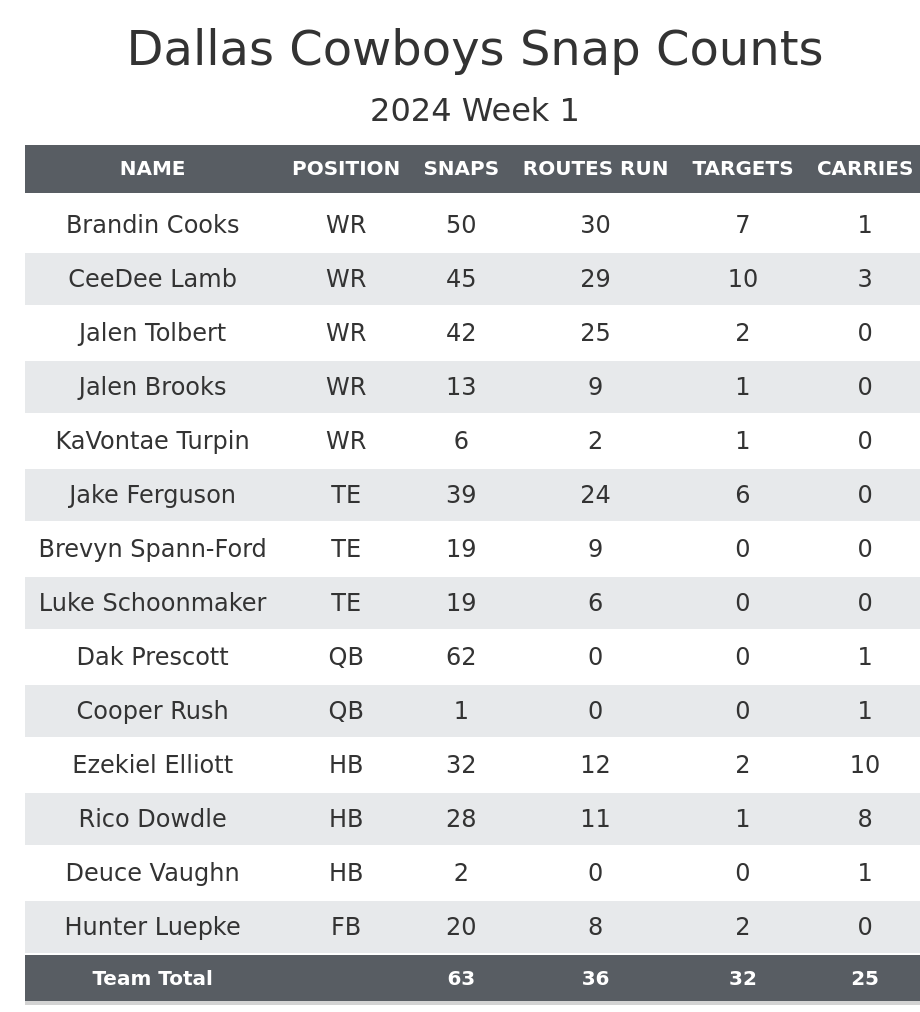
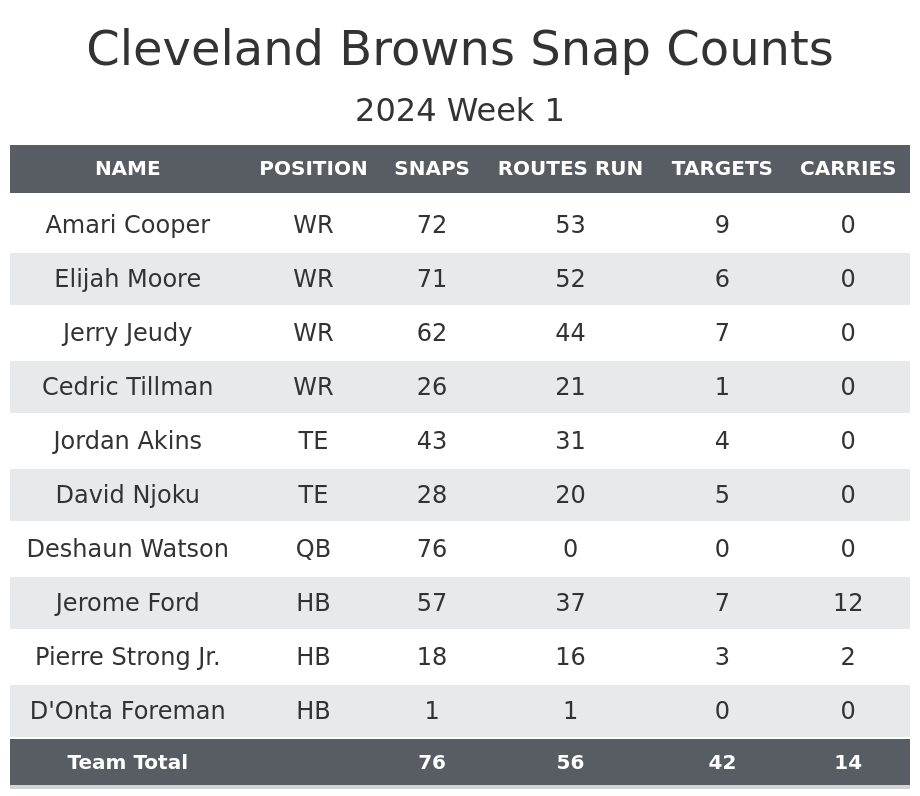
Ezekiel Elliott and Rico Dowdle split the Cowboys backfield: Dallas followed a very simple rotation by drive between the two running backs.
The only exception to the rotation by drive was Dowdle took the ninth and 10th drives because the ninth drive was only two plays to end the half. Elliott played 32 of a possible 35 snaps on his drives while Dowdle played in 25 of a possible 27 snaps on his.
Elliott is the better fantasy option of the two simply because he started the game, but he played the goal-line snap because it happened to occur on his drive. It’s possible Dalvin Cook could complicate this situation if he’s elevated off the practice squad in the future. The fantasy value of the two backs currently depends heavily on the size of your league and how many running backs you can start since it will be hard to ever rank either of these players in the top 24 given this rotation.
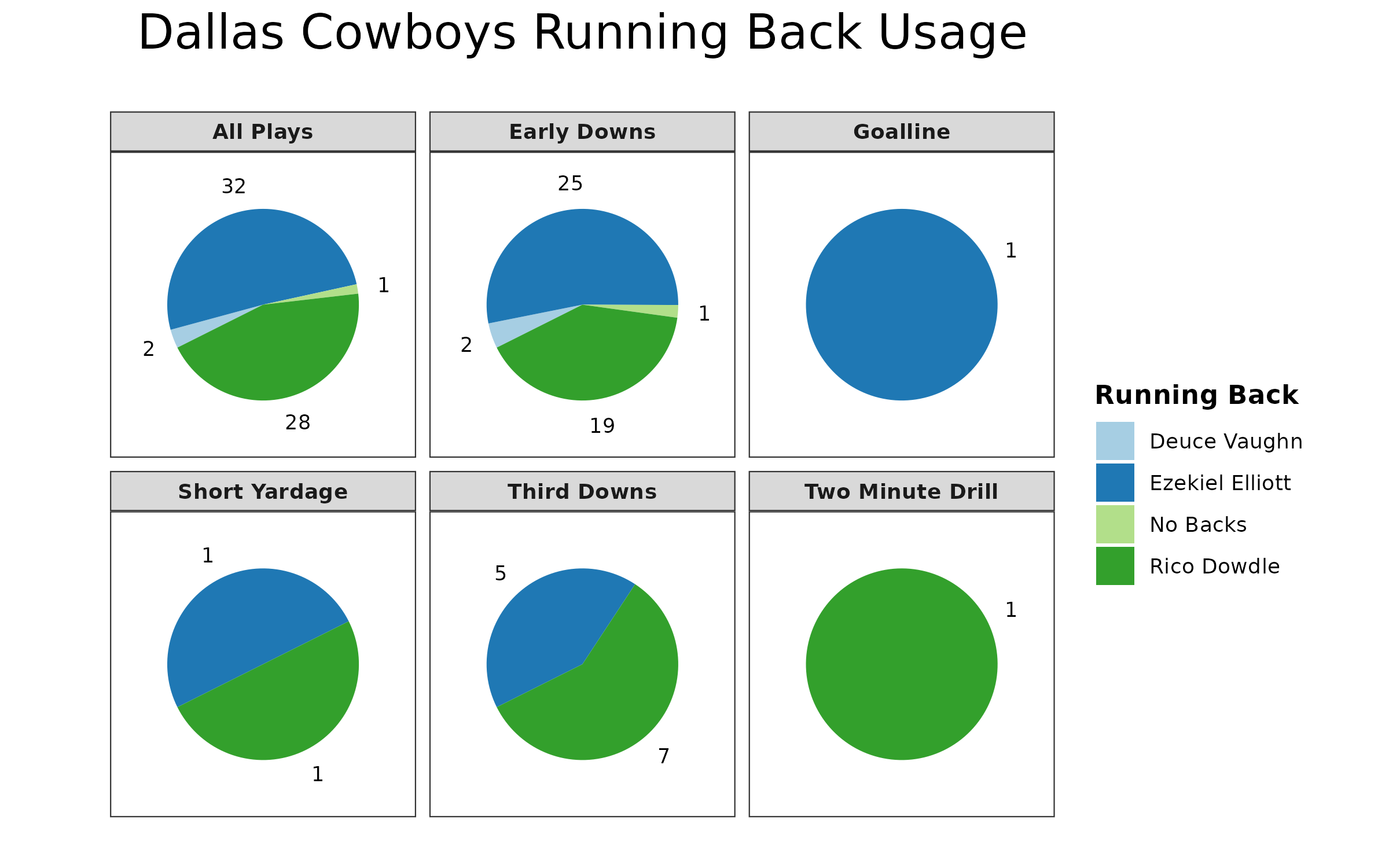
Monitor Jake Ferguson‘s health: Ferguson suffered a knee injury, but the early indication is it’s not as serious as it could have been.
Ferguson played 35-of-43 snaps in the first half, which is very similar to his playing time late last season. Early in the third quarter, he suffered the knee injury and didn’t return. He said after the game he could have played through it if needed, but the Cowboys were winning by a lot.
In the second half, Luke Schoonmaker and Brevyn Spann-Ford split offensive snaps. If Ferguson does end up missing time, it will be better to find a waiver wire option elsewhere rather than adding a Cowboys backup.
Browns trust Jerome Ford more than last season: Ford played in 75% of Cleveland's offensive snaps and 57 total snaps which are both career-highs for the third-year running back.
It is no surprise that Ford is the lead running back while Nick Chubb is out for at least the first four games of the season. It was surprising just how much Ford played. Ford was a primary running back in all situations, playing the majority of both early downs and third downs. Pierre Strong Jr. appeared ahead of D’Onta Foreman during the preseason, but Foreman was only on the field for one total snap.
Ford was not efficient as a running back, but he received enough volume that he should be a serious contender for a fantasy starting role, at least until Chubb returns.
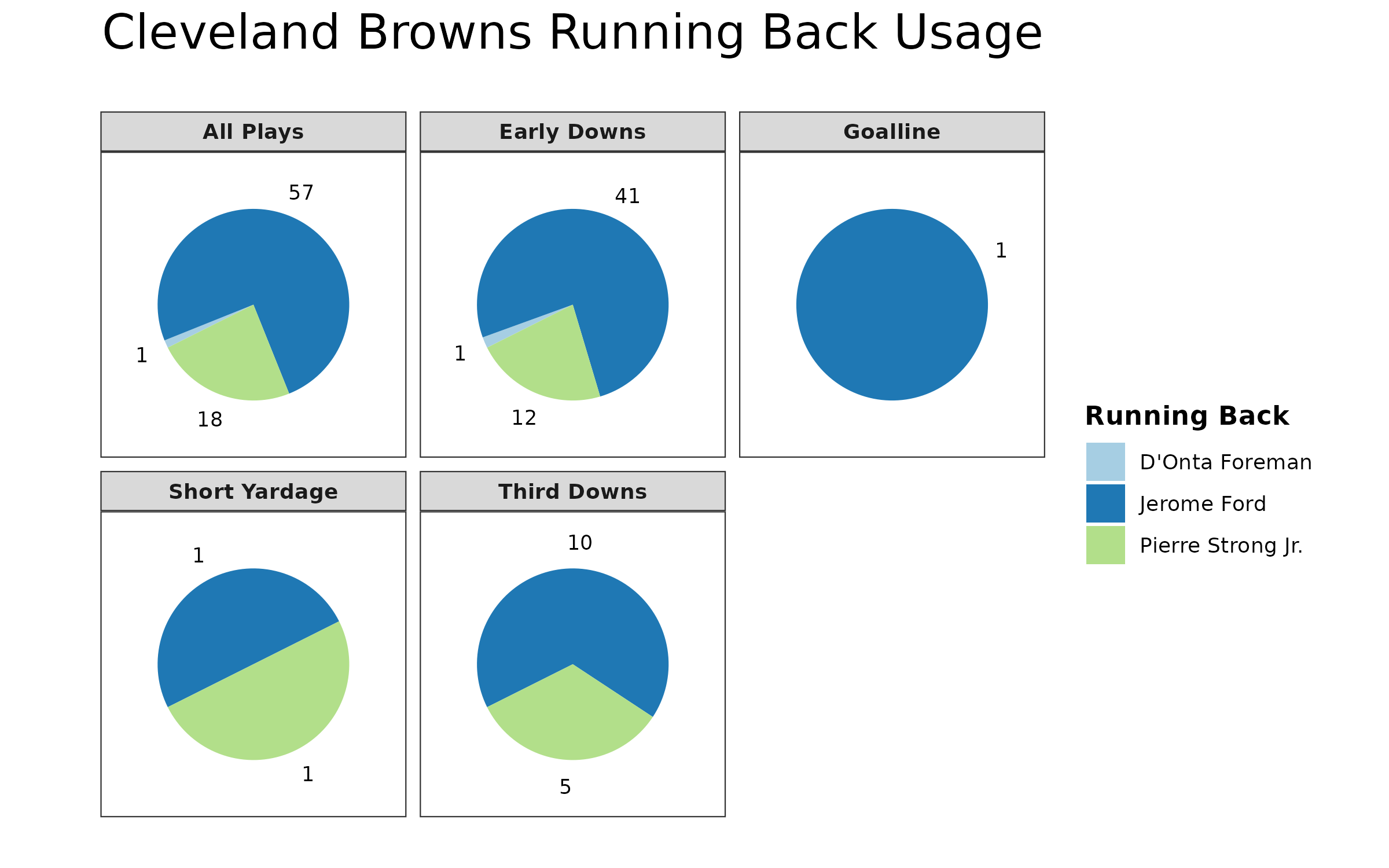
Monitor David Njoku‘s health: The Browns’ star tight end suffered an ankle injury and was seen in a walking boot after the game.
Njoku was off to a fine start, playing 28-of-33 possible snaps before suffering his injury. He caught four passes for 44 yards, leading the team.
Jordan Akins took over for the rest of the game, catching three passes for 27 yards, second-most on the team. From 2020-2023, Akins has a 71.7 receiving grade, which was the 16th-best out of 43 qualifying tight ends. He could be worth a waiver target if Njoku’s injury is serious given his above-average ability mixed with an every-down role.
Miscellaneous Notes
- After Michael Gallup‘s departure, Jalen Tolbert was expected to take the third receiving role. He did in this game, but that didn’t lead to much fantasy production, as he ended with one reception for 12 yards.
- Cowboys backup tight end John Stephens was ruled out on Saturday due to a hamstring injury that kept him out of practice all week.
- The Browns' wide receiver rotation went largely as expected — Amari Cooper, Jerry Jeudy and Elijah Moore were the top wide receivers. The one surprise is that Moore played 43 snaps from the slot compared to Jeudy's 18. It was presumed that Jeudy would primarily play from the slot while Moore spent more time out wide.
Washington Commanders @ Tampa Bay Buccaneers
- Mike Evans: 5 receptions, 61 yards, 2 touchdowns
- Chris Godwin: 8 receptions, 83 yards, 1 touchdown
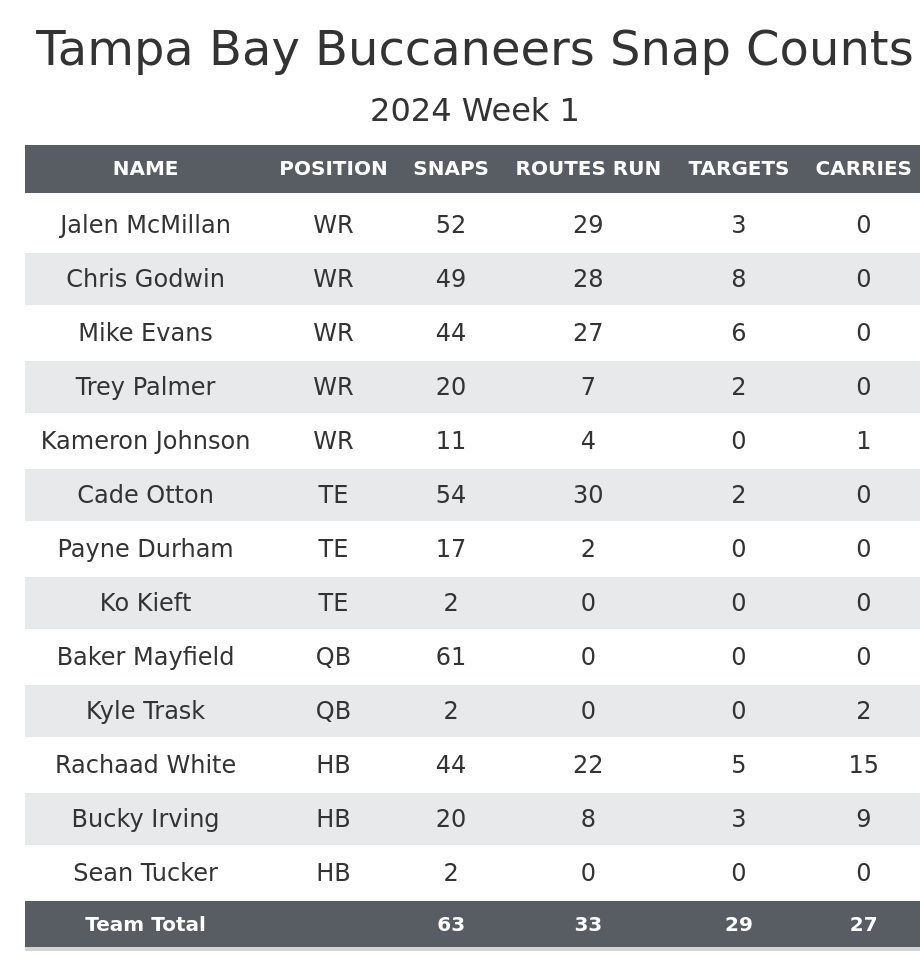
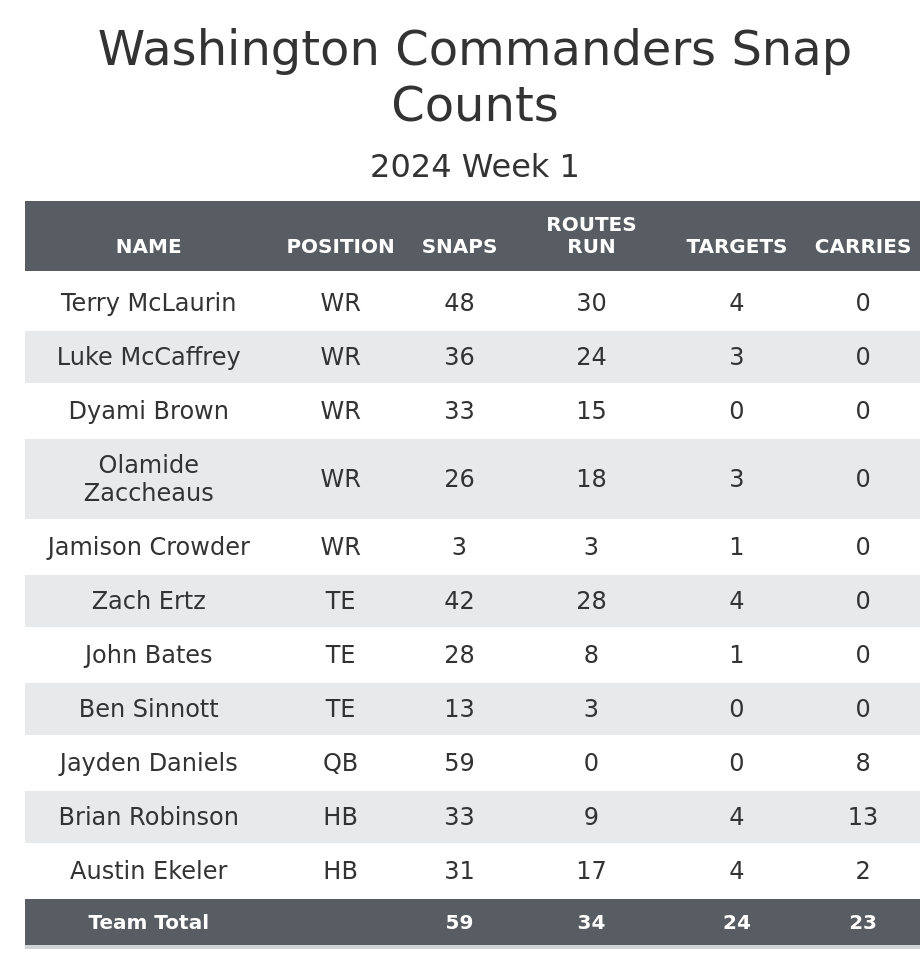
The Commanders’ two-back committee: Brian Robinson and Austin Ekeler were nearly even in offensive snaps, which should surprise no one.
The two pretty evenly split early downs. Robinson took more of the short-yardage work while Ekeler had more of the third-down work. When Robinson was on the field, there was more of a tendency to run while it was much more likely to be a pass with Ekeler on the field.
It might be difficult for either running back to maintain fantasy value in this backfield. Ekeler isn’t running enough to score a lot of fantasy points. Robinson could potentially see some fantasy value if the Commanders are winning games, but it will be hard with Jayden Daniels sniping goal-line touchdowns left and right.
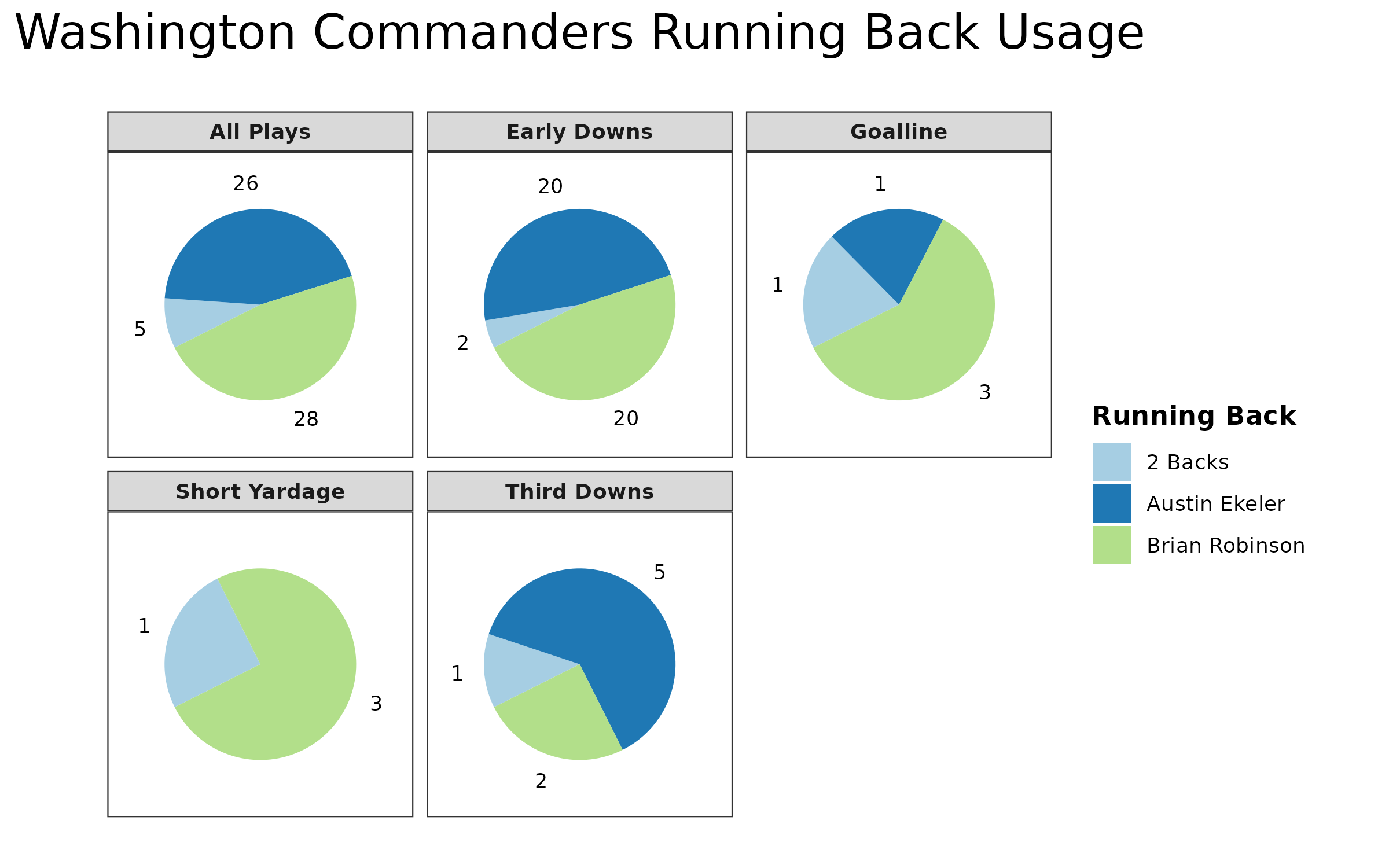
The Commanders use a committee to replace Jahan Dotson: Three different wide receivers played part-time roles in the Commanders' offense.
On the outside, Dyami Brown and Olamide Zaccheaus rotated throughout the game. Zaccheaus was the first wide receiver to play, but Brown ended up with slightly more snaps. Dotson was playing in the slot with the starters throughout the preseason, and in this game, third-round rookie Luke McCaffrey took the slot role. McCaffrey played 32-of-33 snaps in 11 personnel, four-of-18 in 12 personnel, and no snaps in 13 or 21 personnel.
It will be difficult for any of the wide receivers, outside of McLaurin, to be fantasy-relevant in these part-time roles.
Zach Ertz leads the tight ends: Ertz was the clear receiving option at tight end in the game while rookie Ben Sinnott was a distant third.
Ertz played 26-of-33 snaps in 11 personnel while John Bates took three and Sinnott only played one. In 12 personnel, Bates played all 18 snaps while Ertz and Sinnott split the other spot. Ertz was also the primary tight end in 22 personnel.
Ertz caught three passes for 28 yards. This isn’t the ideal situation for Ertz, but he is playing more than other tight ends. He could emerge as more of a target, considering he had more receiving yards than any of the wide receivers.
Bucky Irving cuts into Rachaad White’s playing time: Irving led the Buccaneers in rushing yards with 62.
White typically played around 80% of his Tampa Bay's offensive snaps last season, playing at least 70% of the team's offensive snaps in all but one game last season. The one exception was a blowout victory where he played 68% of those snaps. In this game, he played in just under 70% while the fourth-round rookie took significant time.
Irving was the most effective rusher, averaging 6.9 yards per carry compared to White's 2.1. White’s fantasy value was fine in this game thanks to his six receptions for 75 yards. White was in danger of losing playing time the second Irving was drafted, but now it seems like that could happen sooner rather than later. Given Irving’s snap share in this game and good play, it wouldn’t be surprising if Irving plays a higher percentage of the early-down snaps sooner rather than later. White’s fantasy value could take a serious hit if Irving also takes the goal-line snaps. Because of Irving’s strong play, he should be one of the top waiver adds of the week.
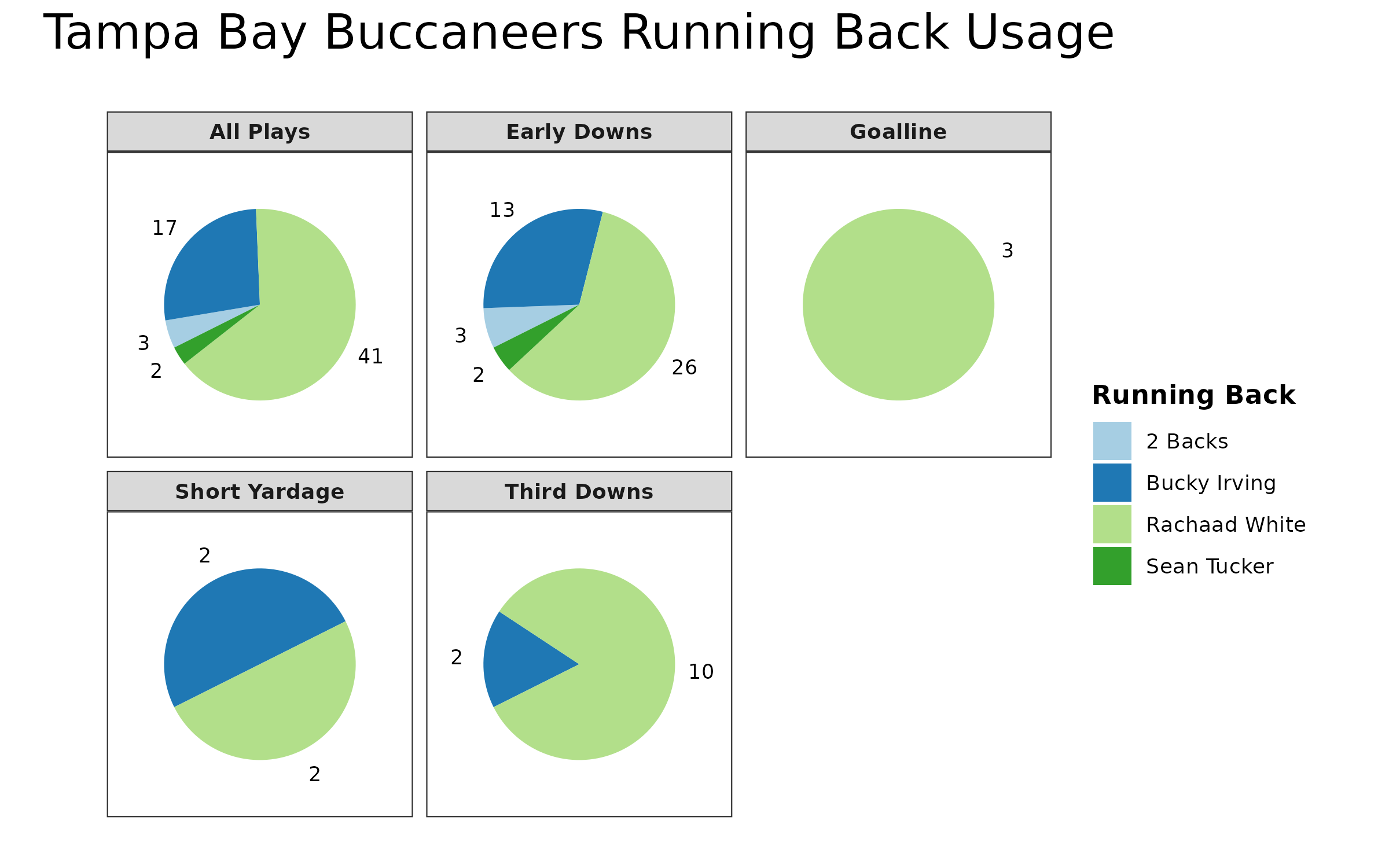
Jalen McMillan was the clear third wide receiver for Tampa Bay: The rookie ended up leading the Buccaneers wide receivers in offensive snaps and routes run.
McMillan played in 49 of a possible 52 snaps in 11 personnel. He also played in half of the 12 personnel snaps, mostly losing time from 13 and 21 personnel snaps. The older veterans Mike Evans and Chris Godwin needed to take plays off a little more often, although their plays off were mostly in run situations.
McMillan isn’t at the level of the other two wide receivers and didn’t receive as many targets, but his one reception was a 32-yard touchdown. He’s worth considering in deeper leagues. McMillan won't play much more if one of the other two wide receivers suffers an injury, but he could see his targets increase significantly.
Miscellaneous Notes
- Commanders backup quarterback Marcus Mariota landed on injured reserve on Saturday due to a chest and pectoral injury. Jeff Driskel is the new backup quarterback while Sam Hartman is also on the roster.
Los Angeles Rams @ Detroit Lions
- Cooper Kupp: 14 receptions, 110 yards, 1 touchdown; 2 carries, 10 rushing yards
- Jameson Williams: 5 receptions, 121 yards, 1 touchdown; 1 carry, 13 rushing yards
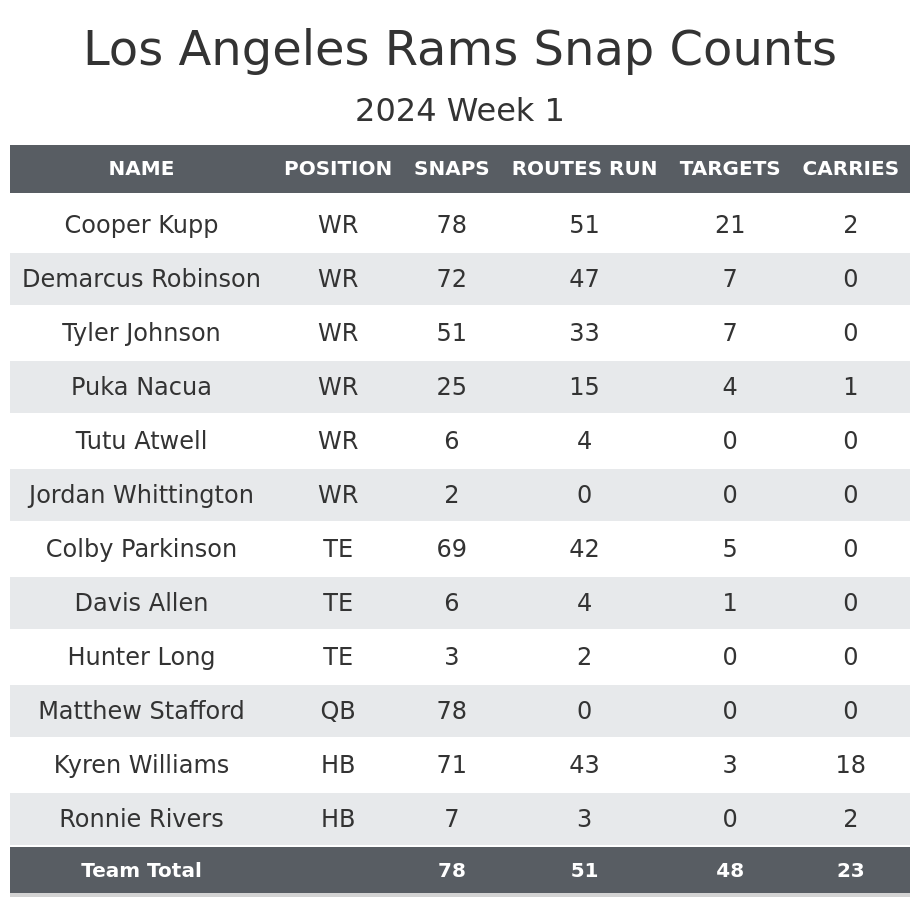
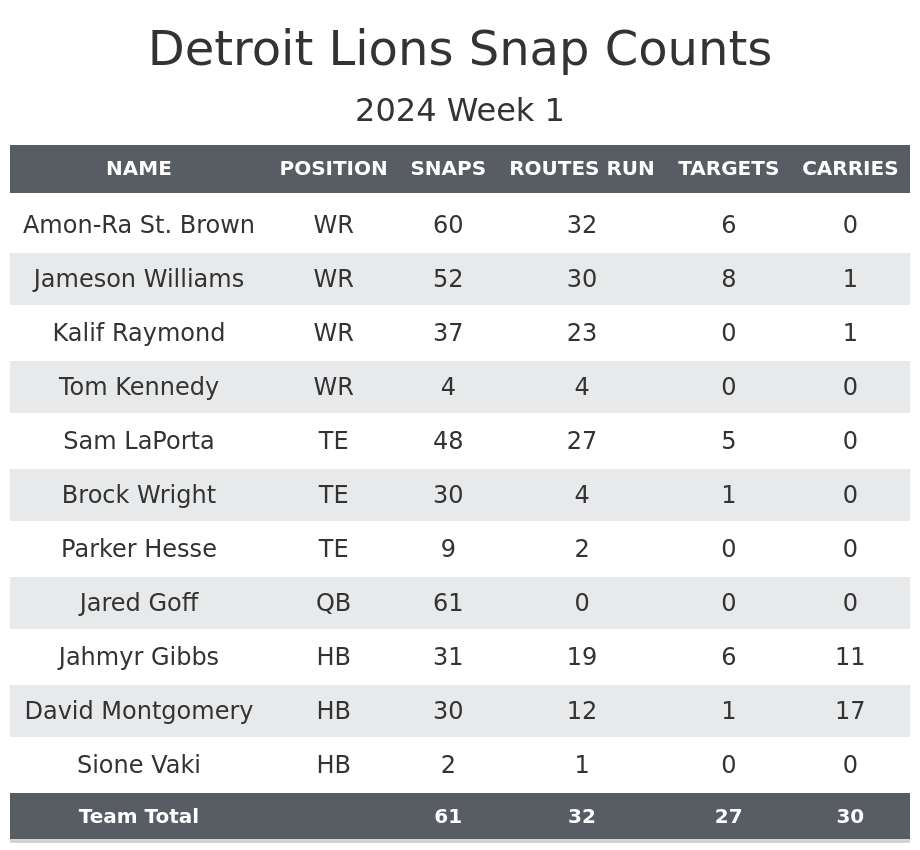
Blake Corum doesn’t play on offense: Corum appears to be the third running back on the Rams' depth chart.
The Rams rested all players with secure roster spots during the preseason, including Kyren Williams, Ronnie Rivers and Corum. As a result, the depth chart remained unclear, with many assuming Corum would secure the backup role.
In Week 1, it was Rivers who stepped when Williams left the field.
This was great news for anyone who drafted Williams, who rarely left the field. He will be a must-start each week for the foreseeable future. However, as the season progresses, the Rams may limit his snaps to keep him fresh for a potential playoff run. While this would benefit the team and Corum, that would negatively impact Williams' fantasy value.
Monitor the health of Puka Nacua: Nacua suffered a knee injury and didn’t play in the second half.
The Rams' second-year receiver suffered the injury in the middle of the second quarter and tried to return for a few plays before the half but was ruled out for the game during halftime. He caught four passes for 35 yards before the injury.
Tyler Johnson was already rotating in as the direct replacement before the injury, even playing three snaps in the first quarter. Tutu Atwell served as Demarcus Robinson’s backup, while Jordan Whittington stepped in as Johnson’s backup.
Johnson may have produced a 63-yard play tonight, but Demarcus Robinson should be the waiver wire target if Nacua’s injury proves serious. Robinson finished last season strong, rarely came off the field and saw an end-zone target (that was disrupted by pass interference) in this game. While Cooper Kupp will absorb some of Nacua’s targets, Robinson could take on a larger share, potentially making him a viable fantasy starter.
Colby Parkinson becomes a clear waiver target: Parkinson rarely left the field and received multiple targets.
Parkinson will be an ideal replacement for anyone looking for a fantasy tight end this week and can’t land Isaiah Likely. Parkinson was an every-down player, completely replacing Tyler Higbee in the offense. He caught three passes for 45 yards in his first game with the Rams, the third-most receiving yards at the position this week.
There are only so many tight ends who are both getting significant playing time and in an offense that scores a lot of points. That could be enough to make Parkinson a fantasy starter this season.
Jameson Williams shines as the WR2: Williams was the clear second wide receiver in the Lions offense.
For the first time in his career, the former first-round pick played over 70% of his team's offensive snaps, and he achieved his first 100-yard receiving game. He played in every situation outside of 13 personnel, only taking a few snaps off here and there. This included playing almost every snap in 12 personnel over Kalif Raymond.
Raymond was the third wide receiver, with Tom Kennedy as the only other player taking any snaps at the position.
While a one-game sample isn’t enough to justify putting Williams in fantasy lineups, this game was a very promising sign that he could be a fantasy starter at some point this season.
Miscellaneous Notes
- The Lions running back rotation was very close, which wasn’t ideal for anyone who drafted Jahmyr Gibbs. Gibbs played over 50% of offensive snaps most of last season, and ideally, he would gradually take on more backfield snaps. The situation remains fluid, so that shift could still happen.
- Sam LaPorta rotated out a little more often in this game than he did last season. Brock Wright took some snaps in 11 personnel in blocking situations, and Parker Hesse took some snaps in 12 personnel. This was also primarily for blocking situations, but this left LaPorta off the field for some passing plays.
Table Notes
- Snaps include plays called back due to penalties, including offensive holding or defensive pass interference. The other three stats have these plays removed.
- Targets may differ from official NFL sources. The most likely discrepancy would be from a clear thrown-away pass, where the NFL may give the target to the nearest receiver, while this data will not.
- Carries are only on designed plays. Quarterback scrambles won’t count for the total number of carries in the game.




 © 2025 PFF - all rights reserved.
© 2025 PFF - all rights reserved.